Rep. Darrell Issa is suing former opponent Doug Applegate over alleged defamatory campaign ads
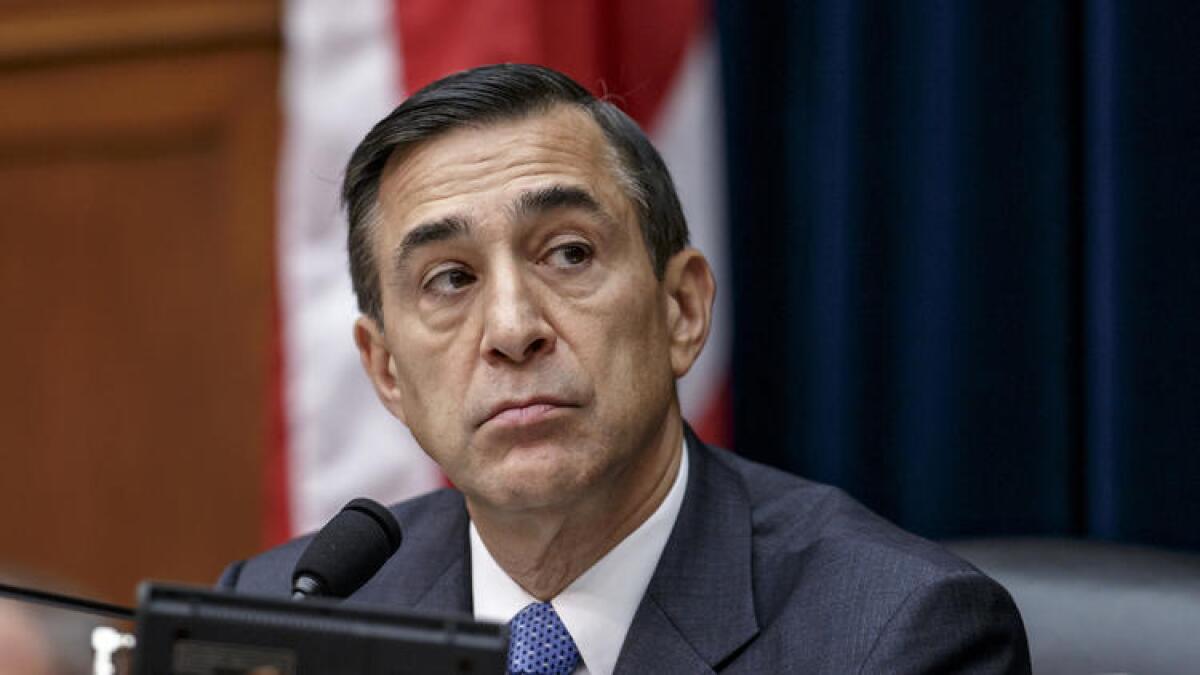
The race may be over between Rep. Darrell Issa and challenger Doug Applegate, but one piece of business from the campaign may linger a long time.
The day before the Nov. 8 election, Issa sued Applegate for libel, claiming that two political ads have damaged his reputation.
Issa also named Applegate’s campaign manager, Robert Dempsey, and the campaign itself in the lawsuit filed in San Diego County Superior Court. The incumbent, one of the wealthiest members in Congress, is seeking $10 million in damages and said he’ll donate any money awarded by the court to charity.
Issa had a 1,982-vote lead as of Wednesday afternoon — with 50.3% of the vote — and was declared the victor by news organizations Monday, with a small number of ballots remaining to be counted. Applegate subsequently admitted defeat but also announced he would run again in 2018.
Harrison Ford, George Takei and others among the new inductees to the California Hall of Fame
Author Isabel Allende, film star Harrison Ford and actor/activist George Takei are among eight inductees to the California Hall of Fame who will be honored Wednesday in a state ceremony at the California Museum.
Gov. Jerry Brown and first lady Anne Gust Brown will present each with a Spirit of California medal. Among the other inductees is journalist and former California first lady Maria Shriver, who founded the Hall of Fame in 2006 when Arnold Schwarzenegger, her husband from whom she is separated, was governor.
Since then, 96 people have been honored for making a mark on California history.
‘Sine die’ arrives in Sacramento, the official end to the 2014-16 session of the California Legislature
The last day of November in an even-numbered year is almost always quiet in the Capitol, but it’s a big day according to state law: The end of a two-year legislative session.
Midnight marks what the California Constitution calls sine die, the final official day of the session that began on Dec. 1, 2014. For all 80 members of the Assembly and half of the 40-member Senate, this is the last day of their term in office.
Twenty members are leaving due to term limits. Assemblyman Brian Jones (R-Santee) tweeted a goodbye to his constituents.
More than 5,000 pieces of legislation were introduced over the last two years, but slightly less than half became law with the signature of Gov. Jerry Brown.
While the end of session is generally considered to be in late August or early September, depending on the year, Nov. 30 is the official changing of the guard. Rarely have lawmakers returned to Sacramento after election day in a lame-duck session. Last week, the brief speculation of last-minute work on a transportation funding plan came to an official end.
Alex Vassar, a historian of the California Legislature, has calculated that the concluding session had the least collective experience in office since 1927 — a function, Vassar said, of the large freshman class elected under relaxed term limits in 2012. But because those lawmakers can serve up to 12 years in the same office, the average time on the job will steadily rise in the next few years.
New and returning lawmakers will take the oath of office on Monday morning.
Sen. Harry Reid calls Sen. Barbara Boxer his ‘sister’ in praise-filled farewell speech
Senate Minority Leader Harry Reid (D-Nev.) came to the Senate floor Wednesday to praise his longtime friend and fellow retiring senator, Sen. Barbara Boxer (D-Calif.).
The House and Senate are expected to recess for the year next week, and the farewell speeches are beginning for members such as Boxer and Reid, who have worked together in Washington for 34 years.
In a nearly 15-minute speech, Reid praised the California delegation for taking him into its fold when he came to Congress and was the only Democrat representing Nevada. He spoke about Boxer’s efforts in preserving the wilderness and protecting Planned Parenthood and their work together with Sen. Dianne Feinstein (D-Calif.) to protect Lake Tahoe.
“Barbara, I have three brothers. I have never had a sister. You’re the sister I’ve never had,” Reid said. “To this day, we still refer to each other as ‘brother’ and ‘sister.’”
Boxer took to the Senate floor immediately after Reid was finished to thank him for his friendship and his words. She emphasized that she has a speech planned about Reid’s career that she’s sure will embarrass him.
Former California Assembly Speaker John A. Perez contemplates a bid to lead the Democratic National Committee
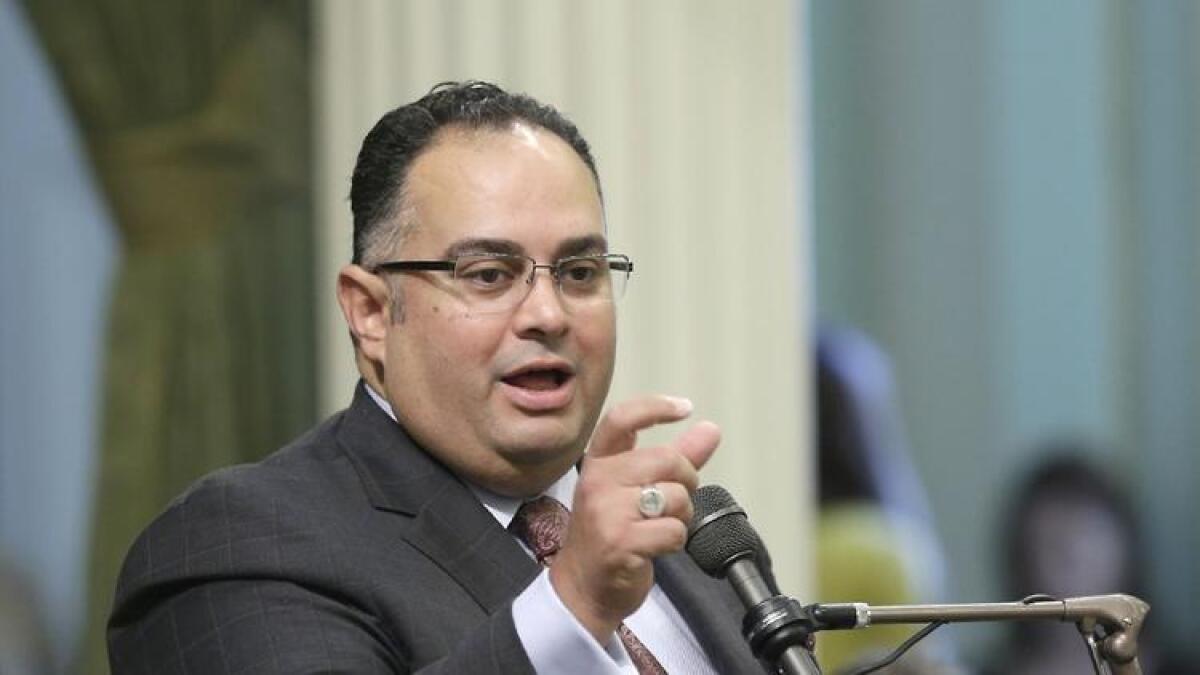
Former state Assembly Speaker John A. Perez, the first openly gay person to hold the post and a forceful former labor organizer, said he is considering a run for chairman of the Democratic National Committee. Politico first reported the news Wednesday.
Perez, who served as speaker from 2010-14 and ran unsuccessfully for state controller two years ago, on Wednesday said party leaders from across the nation have contacted him over the past several weeks to encourage him to run.
With President-elect Donald Trump about to enter the White House and Republicans in control of the Senate and House of Representatives, he said the national Democratic Party could learn from the methods used by California Democrats to win political dominance in the nation’s largest state.
“California has been through some of the challenges the rest of the country is facing right now,” Perez said in an interview with The Times. “It’s not that we’re an outlier. But we’re an interesting model for what’s possible in other states.”
During Perez’s tenure as speaker, the Democrats won a two-thirds supermajority in both the Assembly and state Senate. Democrats now hold every statewide political post in the state.
Several contestants for the new DNC chair have emerged, including Howard Dean, the former Vermont governor who ran the national party in the run-up to Obama’s 2008 election, and Rep. Keith Ellison of Minnesota, a favorite of Vermont Sen. Bernie Sanders and the incoming Senate Democratic leader, Charles E. Schumer of New York.
The national party was rocked by controversies this past election season, including leaked emails that hastened the departure of its former chairwoman, Rep. Debbie Wasserman Schultz of Florida. The emails, made public by WikiLeaks, showed her staff members discussing ways to undermine Sanders during the Democratic primary.
Perez, who lives in downtown Los Angeles, said he plans to deliberate about a possible run over the next several weeks.
Democrats pick California Rep. Linda Sanchez as the first Latina in House leadership
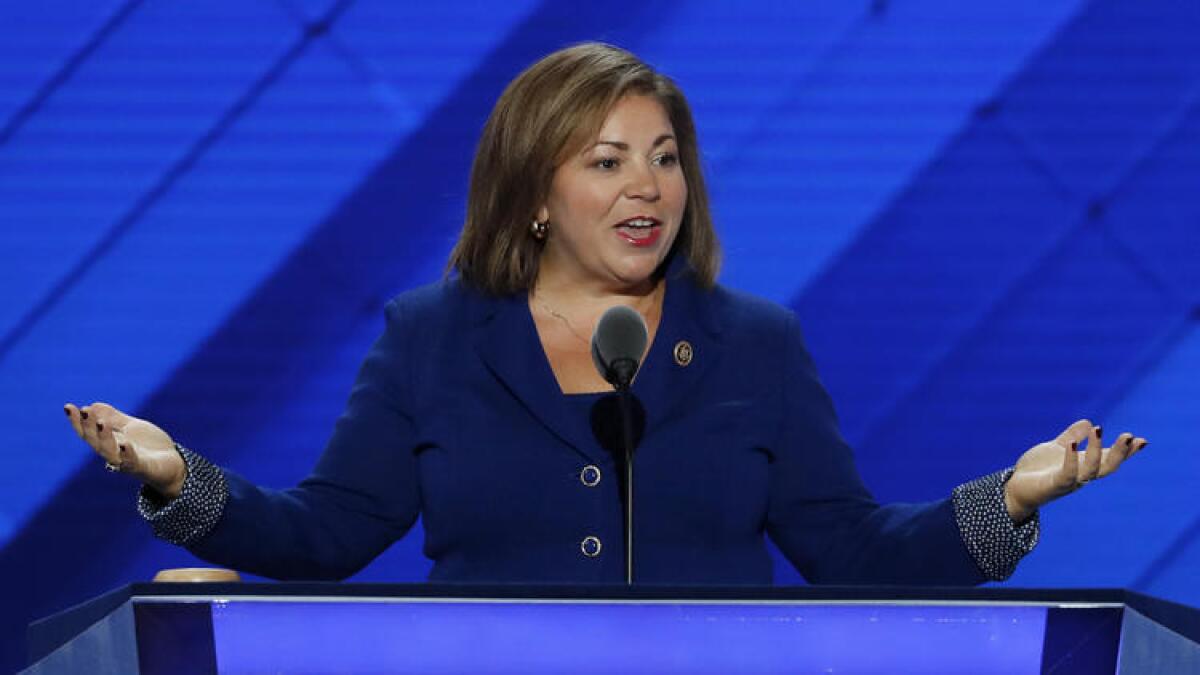
In a 98-96 vote, Rep. Linda Sanchez (D-Whittier) was elected the next vice chairwoman of the House Democratic Caucus on Wednesday, making her the first Latina to ever serve in House leadership.
“We always knew it takes a lot of hard work to get a majority of your colleagues on board with something, I’ve been working at this for more than a year, worked diligently, and I knew today whatever the outcome, I left it all out on the field,” Sanchez said after the vote.
Earlier in the day, House Minority Leader Nancy Pelosi of San Francisco fended off a challenge for her post from a group of younger members, some of whom had grumbled about how long some of the senior members have been in power, and whether newer members of the caucus had a voice.
Sanchez, who at 47 will also be the youngest member of House leadership, said she heard similar concerns from members as she campaigned for the position.
“I really see the vice chair position as a conduit of information from the membership to percolate it up to leadership,” she said. “I’ve heard it all in the last year, I’ve taken the time to really listen to some of their ideas, some of their concerns, some of their suggestions. I’ll be in a unique place to be able to sit in leadership meetings and try to make sure they’re aware of these discussions or these issues.”
The outcome of the election would have been historic either way. Sanchez beat out Rep. Barbara Lee (D-Oakland), former head of the Congressional Black Caucus, who would have been the first black woman elected to House leadership.
Lee ran on a promise to create more ways for members to work on issues they care about, such as task forces and community meetings, if they aren’t on the related committees. She also said Democrats need to do more to talk directly to constituents across the country, and said she plans to find a way to do both outside of leadership.
“I’m going to create ways to do it, trust me,” Lee said after the vote. “I think that’s what we all have to do when we don’t have a sort of framework that’s institutional; we have to get out of the box and create those frameworks.”
Fellow California Democrats said it was a tough vote between hardworking, well-liked members. Three fewer votes were cast in the vice chair race than in Pelosi’s race for House minority leader early in the day, but with secret balloting, it wasn’t clear which members of the caucus didn’t vote.
Kamala Harris names first staffers for her U.S. Senate office
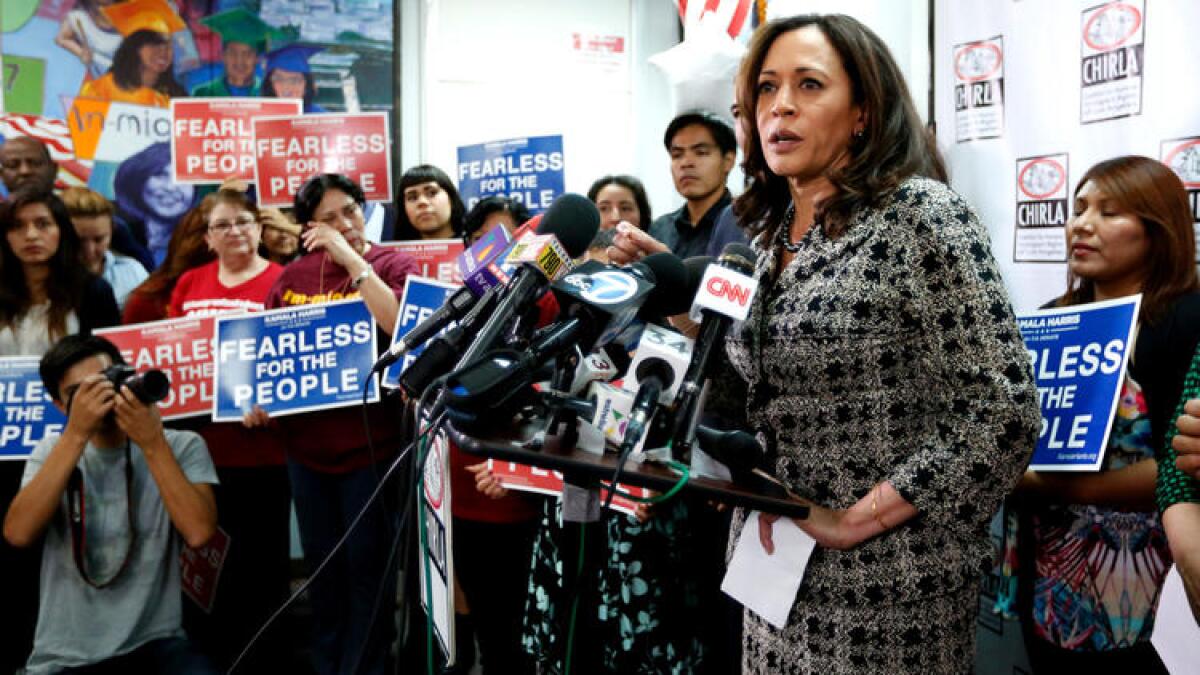
Senator-elect Kamala Harris is making her first hiring move, announcing Wednesday that her chief deputy in the attorney general’s office, Nathan Barankin, will be her chief of staff when she replaces Sen. Barbara Boxer (D-Calif.) in November.
“Nathan has been my trusted advisor and right hand for many years in the Attorney General’s office. He is an exceptional lawyer, legislative expert, and career public servant. He has served three different Attorneys General of California in executive roles and has worked as a constitutional litigator and an advisor to the California Senate leadership for many years. I look forward to continuing to work with Nathan in the United States Senate,” Harris said in a statement.
New senators are sworn in Jan. 3. Harris also announced half a dozen people to help set up her new office, including advisors Debbie Mesloh, Michael Troncoso and Tony West.
Also helping from Harris’ camp is director of scheduling and operations Cortney Bright; deputy campaign manager Jill Habig; campaign manager Juan Rodriguez; advisors Brian E. Nelson, Matthew Spence, Hillary Blout and Lane Dilg; as well as press secretary Nathan Click.
Don’t expect Legislature’s self-styled moderate Democrats to embrace new taxes, even for transportation
Democrats who take the oath of office next week in the California Legislature will find their ranks have swelled, with the party now holding a supermajority of seats in both houses.
But there are likely to be notable intraparty disagreements on economic issues, none more important than taxes.
“I think we need to be very careful about taxes,” said Assemblyman Jim Cooper (D-Elk Grove), co-chairman of a business-aligned bloc of Democrats that calls itself the “moderate caucus.”
One tax proposal sure to face lawmakers in the coming weeks is a proposed increase in the state gas tax to help fund billions of dollars in transportation projects. A broad package of proposals designed to improve roads and highways failed to move forward in the previous session, in large part because the gas tax increase required a supermajority vote in both houses -- and Republicans balked at the idea.
Which gets back to the skepticism of some of the business-aligned Democrats to vote for a new tax.
“I think we need to be very careful,” said Cooper of a tax hike.
The looming transportation debate, say some, offers insight into the limits of Democratic dominance even in an era where the party’s political power seems stronger than ever.
Bernie Sanders tells California audience that Democrats ‘cannot be the party of the liberal elite’
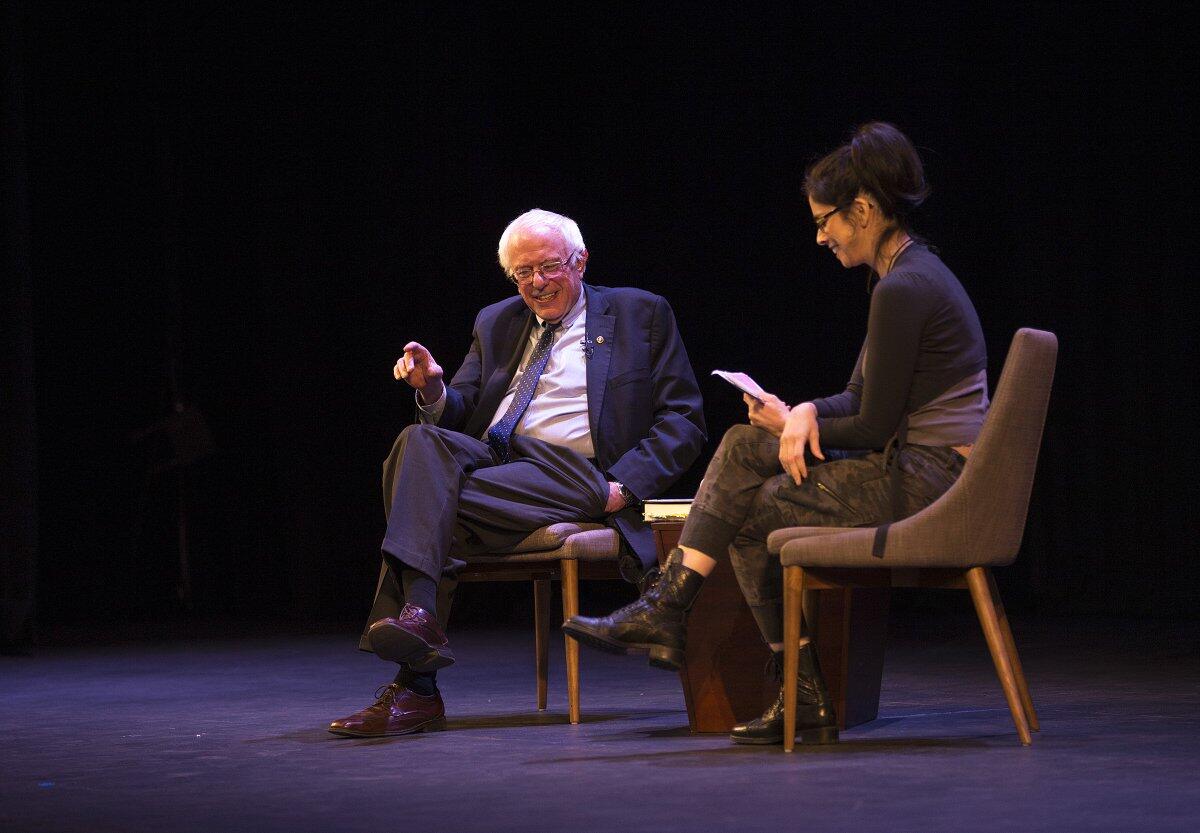
Vermont Sen. Bernie Sanders spoke to a sold-out crowd of 1,400 Tuesday night in Glendale, trying to help supporters grapple with the election of Donald Trump and chart a path forward.
Opening her conversation with Sanders at the Alex Theatre, comedian Sarah Silverman posed a question with a four-letter word she said has “been on everybody’s mind since the election.”
“What the [expletive]?” Silverman said to laughter and applause. “Is that the entire question?” Sanders responded, before warning that the Democratic Party “cannot be the party of the liberal elite.”
Sanders told the audience that it would be a mistake to assume that the only reason Trump won was because his supporters are “racists, sexists and homophobes.”
“What he touched on in many, many parts of this country is a pain and a level of despair that you never, ever see on television,” Sanders said. “A lot of people are suffering, a lot of people are hurting and they need a party which brings them into the process.”
Sanders continued to de-emphasize identity politics, a move he’s made in several media outlets in recent days, saying “it isn’t enough” to support a candidate because she’s a Latina or a woman. Democrats, Sanders said, need to stand against racism and discrimination, but also emphasize progressive values such as fighting Wall Street and drug companies.
He repeated his belief that the “overwhelming share” of Americans support his progressive ideals, including a desire for clean air and water, free college tuition and greater pay equality for women, all topics that drew sustained applause from the audience.
“As we try to figure out how best to deal with a President Trump, and I’m as reluctant as you to say that phrase ... please do not believe that members of Congress can do this alone. We need a mass movement of millions of people who are engaged,” Sanders said.
Bernie Sanders talks with Sarah Silverman about the election before a sold-out crowd in Glendale
Los Angeles Rep. Xavier Becerra makes a bid to lead Democrats on House tax-writing committee
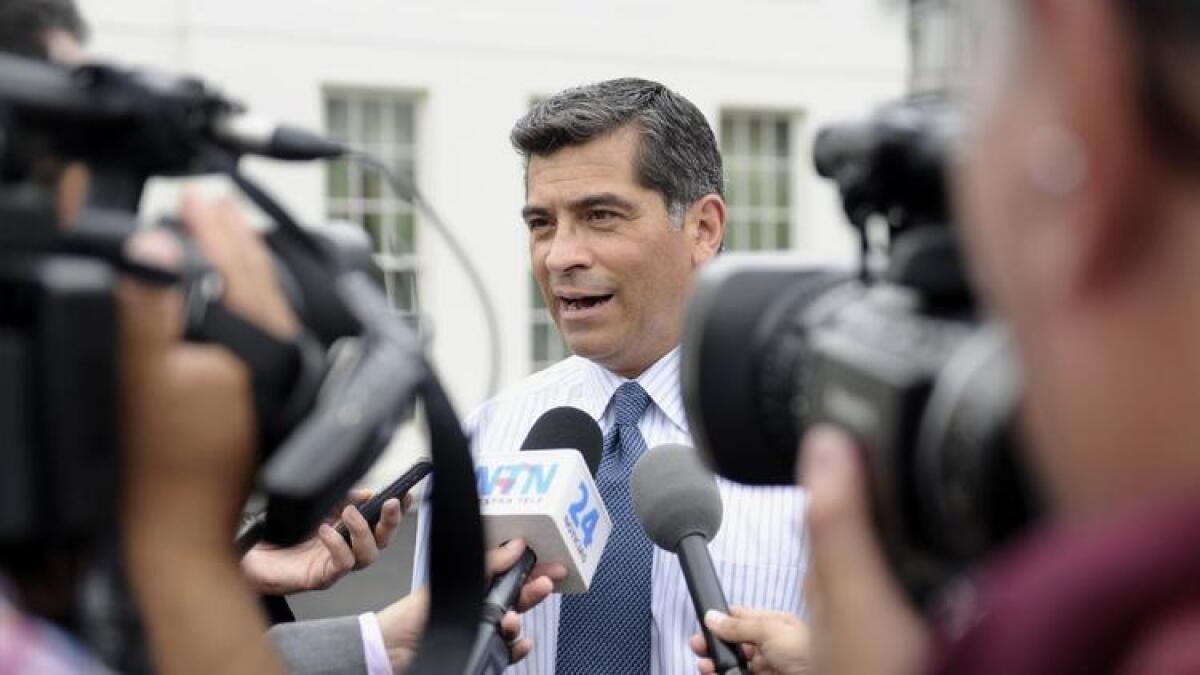
House Democratic Caucus Chairman Xavier Becerra (D-Los Angeles) is seeking to become the ranking Democrat on the House Ways and Means Committee following news Tuesday that the current ranking member Rep. Sandy Levin (D-Mich.) will not run for the position again.
Levin, 85, said it was time to give younger members a chance to lead Democrats on the powerful tax-writing committee ahead of expected fights with the Trump administration and House Republicans over healthcare policy and tax reform.
Becerra asked for support in a letter to colleagues Tuesday night.
“With the White House and Congress in Republican hands, we need a strong, experienced and energetic leader who will take the fight for our democratic values on the Ways and Means Committee to the American people,” Becerra said. “Over the next two years, many of America’s toughest policy decisions will play out in this committee.
The member who will become the Democrats’ next leader on the committee isn’t determined by seniority. The ranking member elections have not yet been scheduled. Becerra is the committee’s sixth-highest ranking Democrat, and the ranking Democrat on its Social Security Subcommittee.
The committee’s second- and third-ranking Democrats, Reps. Charlie Rangel (D-N.Y.) and Jim McDermott (D-Wash.), are both retiring this year. Though he hasn’t officially signaled one way or the other, Rep. John Lewis (D-Ga.) the fourth-ranking Democrat on the committee isn’t expected to pursue the job.
That leaves the race down to Becerra and the fifth-highest ranking Democrat on the committee, Rep. Richard Neal (D-Mass.), who challenged Levin for the ranking member position in 2010 and lost. Neal has not said if he plans to run.
Becerra, the fourth-highest ranking Democrat and the most senior Latino in the House, is term-limited as caucus chairman and had no other step upward in House leadership unless House Minority Leader Nancy Pelosi (D-San Francisco), House Minority Whip Steny Hoyer (D-M.D.) or Assistant Democratic Leader James Clyburn (D-S.C.) stepped down. The three are up for reelection in Wednesday morning’s leadership vote.
Becerra was a vocal surrogate for Hillary Clinton’s presidential campaign, and spent the last year crisscrossing the country for her and for House candidates. His name was floated as an early possibility for vice president, or for a cabinet position.
After a tough election fight, Douglas Applegate says he isn’t done challenging Rep. Darrell Issa

Democratic congressional candidate Douglas Applegate came within a few thousand votes of knocking off GOP Rep. Darrell Issa of Vista, and now says he’s going to give it another try in 2018.
“As a Marine Colonel, I know that the hardest fights often take a couple of battles — and I look forward to continuing our fight in the days, weeks, and months ahead,” Applegate said in a statement released Tuesday. “That’s why I’m announcing my intention to run for Congress in 2018.”
John Burton says he’s the the leader of California’s ‘Liberal Party’ — and proud of it
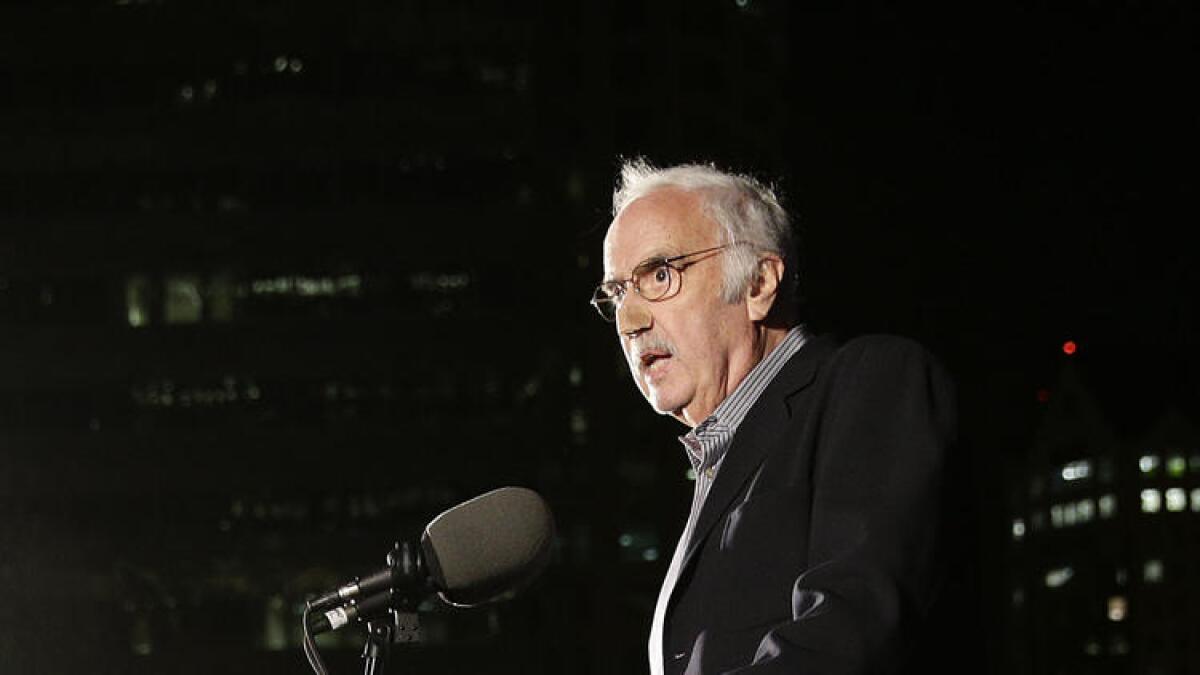
John Burton isn’t afraid of the “l” word.
The chairman of the California Democratic Party wasn’t shy about calling it the “Liberal Party” in an email urging members to run to become delegates. For years Republicans have used the term “liberal” as a pejorative. Many Democratic politicians prefer to be called “progressive.”
The message sent by Burton, the former president pro tempore of the state Senate, also laid out “what California Democrats stand for” — a list of policy positions that largely mirrors the party’s official political platform.
Among the highlights of Burton’s list:
- A “common sense ban on deadly assault weapons”
- Abolishing capital punishment
- Endorsing Black Lives Matter
- A belief that “healthcare is a human right” and support for a single-payer health care system
- Support for debt-free college and free community college
California Republicans allege that the state’s online voter registration system isn’t secure
Leaders of the California Republican Party are alleging that the state’s online voter registration system is susceptible to voter fraud, and say they are considering possible legal action in the days or weeks to come.
Harmeet Dhillon, the state party’s former vice chair and now a member of the Republican National Committee, said Sunday that party leaders believe the 4-year-old system allows multiple people to be registered from the same computer.
“The [California] secretary of state’s website does not track the IP addresses of the people who register to vote,” Dhillon said in a phone interview. “You could literally register hundreds or thousands of people from the same computer.”
When asked Tuesday how a single computer used to register multiple voters might be an indicator of fraud, Dhillon said she believes such a situation makes investigating fraudulent activity more difficult. But she said she does not support any ban on public computers for registering voters, such as the ones used in libraries.
The voter registration website, which asks for personal information, including a driver’s license number and the last four digits of a Social Security number, was launched in 2012. State elections officials boasted last month of a record number of voter registration visits — more than half a million — on the website over two days in late October.
“There is more security on the websites that I shopped on Black Friday than there is on the secretary of state’s website,” Dhillon said.
An email sent to GOP leaders last weekend by the chairman of the California Republican Party, Jim Brulte, suggested possible legal action over the online site. The email, a copy of which was obtained by the Los Angeles Times, also outlined a handful of other “voter registration/turnout irregularities” during the 2016 election cycle.
In a written statement to The Times, Secretary of State Alex Padilla said his staff regularly assesses security of the site and blocks any suspicious activity.
“Undermining confidence in our elections by making unfounded claims of security vulnerabilities and voter fraud is irresponsible,” Padilla said. “I will continue to work to protect the integrity of our elections systems while making the voting experience, from voter registration to casting a ballot, accessible, fair and honest.”
Padilla was vocal over the weekend in criticizing the unproven allegations of widespread voter fraud in California by President-elect Donald Trump.
------------
3:37 p.m.: This article was updated with comments from Harmeet Dhillon regarding the security of public computers.
FOR THE RECORD, 7:25 p.m.: A previous version of this post incorrectly quoted Harmeet Dhillon as saying, “You could literally register hundreds of thousands of people from the same computer.” The figures she cited were “hundreds or thousands.”
This article was originally published at 2:26 p.m.
California Democrats jump in to support Nancy Pelosi’s minority leadership bid
House Democrats come together Wednesday to vote on their leadership for the next Congress, and with a challenge to House Minority Leader Nancy Pelosi (D-San Francisco) looming, her supporters have taken to social media in recent days to explain why they back the long-serving leader.
Pelosi, who has been in House leadership for nearly two decades, has cast herself as a steady hand for Democrats as they push back against President-elect Donald Trump’s policies, including repealing the Affordable Care Act and deporting millions of people in the country illegally.
Pelosi’s challenger, Rep. Tim Ryan (D-Ohio), represents a state that Trump won, and he has made the case that Democrats need to appeal to Middle America if they want to regain House control.
Several of California’s 39 Democrats joined the social media rally behind Pelosi, posting their own reasons to #StandWithNancy.
House Majority Leader Kevin McCarthy (R-Bakersfield) has taken a few swings at Pelosi since Democrats’ losses Nov. 8, saying keeping her in charge means Republicans will continue holding majority control of the House.
The National Republican Congressional Committee also jumped in Tuesday, hanging a banner outside their Washington office urging Democrats to “Hire Nancy” and joining the tweetstorm online. Pelosi’s staff responded, calling it a distraction from Trump’s transition.
Democrat who lost to Darrell Issa vows to return in 2018
Kevin de León, Nancy Pelosi strategize ‘to protect California’s progressive policies and values’
California Senate leader Kevin de León met with House Minority Leader Nancy Pelosi on Tuesday to discuss how they will “protect California’s progressive policies and values,” De León said in a tweet.
The two Democratic leaders have said they are willing to engage the White House on common objectives. But they also have vowed to wage fierce opposition against the Donald Trump administration and a GOP-controlled Congress, which California lawmakers have said could threaten the state’s work on issues such as healthcare, immigration and climate change.
The state Senate has said it plans to hire its own outside counsel for guidance on how to fend off unfriendly directives from Trump.
Rep. Janice Hahn to resign seat early to be sworn in as L.A. County supervisor

Rep. Janice Hahn (D-Los Angeles) will resign her congressional seat Sunday so that she can be sworn in as the newest member of the Los Angeles County Board of Supervisors.
Hahn will be sworn in Monday. Hahn’s staff said she has already submitted the necessary letter announcing her resignation to House officials.
Congress is expected to leave for the year Dec. 9, but still needs to pass a resolution to continue funding the government.
New members, including Hahn’s replacement representing the L.A. area’s coastal cities, Nanette Barragán, will be sworn in Jan. 3.
4:22 p.m. Dec. 1: The post has been corrected to reflect that Hahn’s resignation takes effect Dec. 4. It was originally published Nov. 29.
Republican Assemblyman Marc Steinorth hangs on to his seat, beating Democrat Abigail Medina
Assemblyman Marc Steinorth (R-Rancho Cucamonga) has defeated Democrat Abigail Medina to keep his seat in a surprisingly tight race.
The Associated Press called the race for Steinorth on Monday evening, nearly three weeks after election day. According to the latest election returns, Steinorth was ahead by 2,513 votes.
Medina’s strong showing in the primary — when she won by three percentage points — and the district’s high Latino voter registration made the 40th Assembly District a major target for Democrats this year.
State and county parties spent more than $2.4 million in an attempt to unseat Steinorth in the 40th Assembly District, and GOP committees spent $1.2 million defending him.
Medina, a San Bernardino school board member, was boosted by Tom Steyer’s NextGen political action committee, while Steinorth benefited from spending by groups funded by oil companies, the real estate industry and other business interests.
Much of the Democrats’ campaign centered on trying to tie Steinorth to Donald Trump in mailers and advertisements. Assembly Speaker Anthony Rendon also showed up to campaign with Medina on several occasions.
Underscoring the importance of this race to Democratic leaders, Medina was one of four legislative candidates to be endorsed by President Obama in the final weeks of the campaign.
Democrats clinch a supermajority in both houses of the California Legislature after Josh Newman wins state Senate seat
Democrat Josh Newman has defeated Assemblywoman Ling Ling Chang (R-Diamond Bar) to win the race for the 29th Senate District, giving Democrats in the Legislature a two-thirds majority in both houses.
The Associated Press called the race Monday evening for Newman, who had been steadily gaining ground as provisional and absentee ballots were counted over the last three weeks.
As of Monday afternoon, Newman’s lead over Chang had grown to more than 2,100 votes.
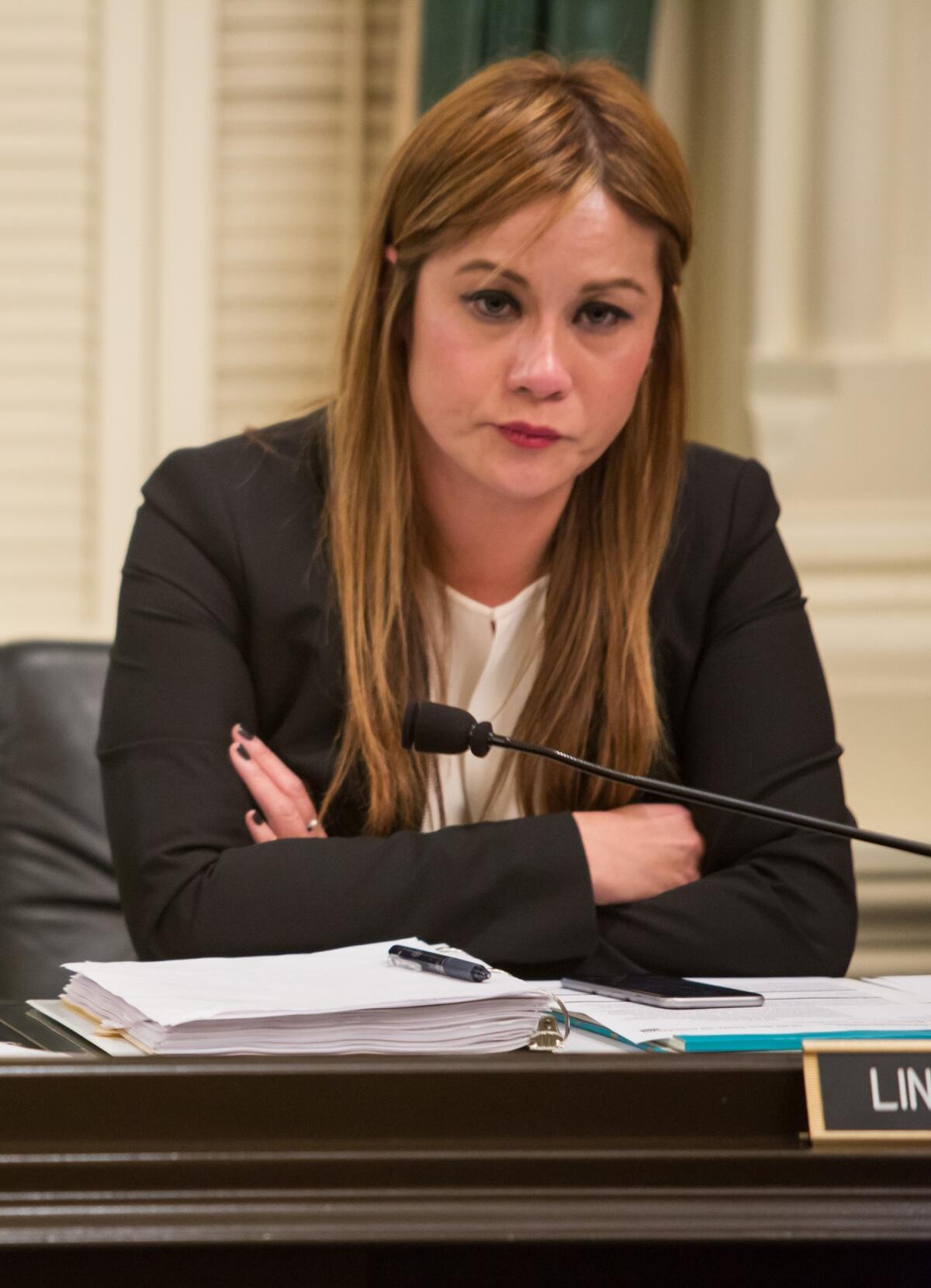
“I am immensely honored to have earned the trust and support of so many of my neighbors, who’ve placed their faith and trust in me as their next state senator,” Newman said in a statement, crediting his supporters with helping counter what he called the “obscene levels of spending” in the race.
Democrats had already secured a supermajority in the state Assembly with the defeat of Republican legislators Young Kim (R-Fullerton), Eric Linder (R-Corona) and David Hadley (R-Manhattan Beach).
With a supermajority, a political party can raise taxes, place measures on the statewide ballot, enact laws immediately with an “urgency” clause and override a governor’s veto.
In a statement, Senate President Pro Tem Kevin de Leon congratulated Newman on his “clear and impressive victory.”
“He will bring bold ideas, independent thinking and boundless energy to our Caucus and our State Capitol,” De Leon said. “I look forward to welcoming him to our enthusiastic and expanding Senate Democratic majority and working with him to continue California’s unprecedented progress.”
Newman will be sworn in Dec. 5.
For the record, 6:03 p.m.: An earlier version of this post reported that Ling Ling Chang is a state senator. She is an assemblywoman.
The post was originally published at 5:49 p.m.
Republican Rep. Darrell Issa wins reelection after close battle with Democratic challenger Douglas Applegate
All signs pointing to reelection for Rep. Darrell Issa
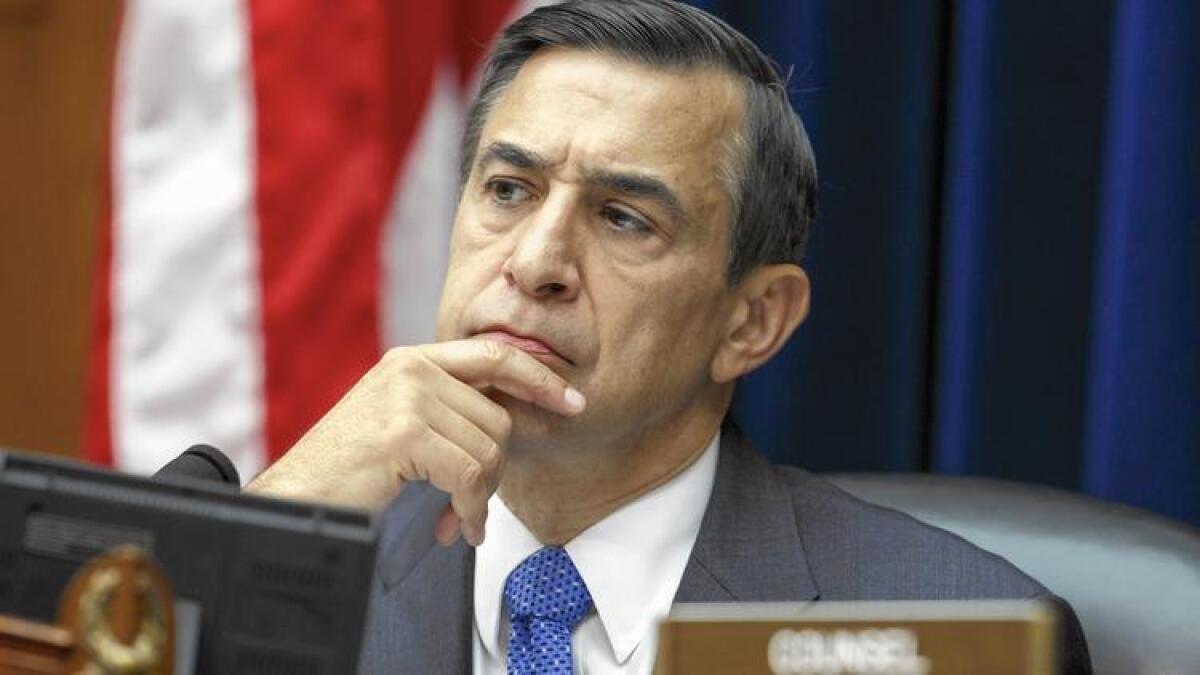
In a race that’s been too close to call since election day, Vista Republican Rep. Darrell Issa appears to have built an insurmountable lead in his bid for reelection over Democratic challenger Doug Applegate.
Issa led by 2,348 votes as of Monday morning — less than 1% of the overall vote.
San Diego County spokesman Michael Workman said Monday that there are an estimated 1,000 ballots left to count in the race for California’s 49th Congressional District. That will make it practically impossible for Applegate, a retired U.S. Marine colonel, to close the gap.
Newman’s lead in state Senate race increases slightly but no supermajority news before Thanksgiving
Democrat Josh Newman continues add votes to his lead over Assemblywoman Ling Ling Chang (R-Diamond Bar) in their drawn-out battle for state Senate.
The race is being watched closely statewide, since the Democrats’ prospects for a supermajority in both houses hinges on the outcome.
With updated vote counts released Wednesday afternoon, Newman was leading by 1,527 votes, up from a lead of 1,396 Tuesday.
The results are likely to be clearer Monday, when San Bernardino County is scheduled to release its latest counts. (While he was leading in Los Angeles and Orange County counts, Newman had been trailing Chang in San Bernardino County.)
“We feel really good about the trend, and we’re cautiously optimistic,” said Derek Humphrey, a consultant for the Newman campaign.
California still has just under 1.5 million ballots to count

More than two weeks after election day, county officials across California have nearly 1.5 million ballots that have yet to be checked or counted.
Roughly 44% of the official total — 1,466,308 — were in Los Angeles and San Diego counties. State officials said the count could be static for days because of the Thanksgiving holiday break.
Two pending ballot races were called by the Associated Press on Wednesday: Voters narrowly rejected Proposition 53, an effort that sought to force statewide votes to fund a major water project and the future of high-speed rail. And they narrowly approved Proposition 66, which aims to speed up the death penalty.
As the California count has dragged on, former Democratic presidential candidate Hillary Clinton’s lead in the national popular vote has increased to about 2 million.
There are multiple reasons for the long wait: California is home to more voters than any other state across the country. It also has more election laws designed to maximize a voter’s chances of casting a ballot.
By law, counties have up to 30 days to certify the final results to state election officials. In many cases, the uncounted ballots are the ones that were dropped off on election day or ballots that arrived in the mail at the last minute.
State law also allows for any ballot postmarked by election day that arrives no later than three days later to be counted.
California mayors have a message for Trump about the border

Christina Bellantoni, The Times’ assistant managing editor of politics, speaks with L.A. Mayor Eric Garcetti and San Diego Mayor Kevin Faulconer at the Essential Politics post-election symposium on Nov. 17 in downtown Los Angeles. More coverage at l
How will California’s leaders interact with the Trump administration?
San Diego’s Republican Mayor Kevin Faulconer and Los Angeles’ Democratic Mayor Eric Garcetti joined The Times’ Christina Bellantoni for a post-election symposium to discuss just that. Here are some highlights.
On the border wall
San Diego is the largest border city to Mexico. Faulconer called the city’s relationship with the neighboring country one of its greatest strengths.
“We are building bridges down at the border. Literally,” he said about a newly opened pedestrian bridge between his city and Mexico. He also cited job creation on both sides of the borders as a major benefit and importance of trading with our neighbors to the south.
On President-elect Trump’s relationship with California
When it comes to federal funding, both mayors hope President-elect Trump will not turn his back on the state’s infrastructure or advancements in combating climate change.
“The Port of L.A. in Long Beach is responsible for 43% of the consumer goods that come by sea into this country,” Garcetti said, stressing the state’s importance to the rest of the country. He later added, “I hope we have an administration that doesn’t bury their heads in the sand when it comes to climate change.”
On whom they voted for
Neither Garcetti nor Faulconer voted for Trump. Garcetti voted for Hillary Clinton, having spent months campaigning for her in swing states and back home. He also offered his theory on Trump’s win.
Faulconer, who supported Marco Rubio during the primary and criticized Trump’s rhetoric toward women and immigrants, said he voted for House Speaker Paul D. Ryan on election day. It’s worth noting Ryan was not an official write-in option on the California ballot.
Will Faulconer run for governor?
The short answer is no.
“No plans to run for governor. I just got re-elected as Mayor of San Diego.”
On whether California should secede from the United States
Despite a renewed push from the “Cal-exit” secessionist movement, the mayors agreed California should not try to separate from the rest of the country.
“I think it’s a bad idea,” Garcetti said. “I love this country and I plan to have the political winds blow from the west.”
“We’re a great state,” said Faulconer. “What makes us great is we may have different views and opinions … but the strength of California is the strength of all of us coming together to make it a better state … So yeah, we’re going to stay as one state and do our best.”
Watch the full interview above. To learn more about Times events, sign up for the Essential Politics newsletter.
Kamala Harris sets up political action committee
Teachers and school officials say the battle is not over for bilingual education in California

Proposition 58, which overhauls English-only instruction in California, cruised to victory on election night, granting public schools more power to develop and implement their own bilingual and multilingual programs. But it will now be up to parents and teachers to make that happen.
That could prove challenging, given the troubled legacy of bilingual education in the state and as schools continue to grapple with teacher and funding shortages.
Less than 5% of public schools offer bilingual and multilingual programs, though there are now 1.4 million English learners statewide — about 80% of whom speak only Spanish.
Meanwhile, the number of bilingual education teachers has declined over the last six years, down to 693 teachers last year.
California voters approve an effort to speed up the death penalty with Prop. 66
California voters have chosen to approve a ballot proposition that seeks to speed up the death penalty process, a late count of ballots has shown.
Proposition 66 intends to speed up executions by designating trial courts to hear petitions challenging death row convictions, limiting successive petitions and expanding the pool of lawyers who could take on death penalty appeals. As of Monday, the proposition was leading with 51.3% of the vote and on Tuesday, an Associated Press tally of votes found the proposition had received enough votes to pass.
Just two days after the election, with returns still being counted, death penalty opponents filed a preemptive lawsuit to try to block implementation of the proposition.
In contrast, Proposition 62, which would have replaced capital punishment for murder with life in prison without parole, failed with 46.1% of the vote and was called by the Associated Press the morning after election day.
California transportation efforts are officially dead for 2016
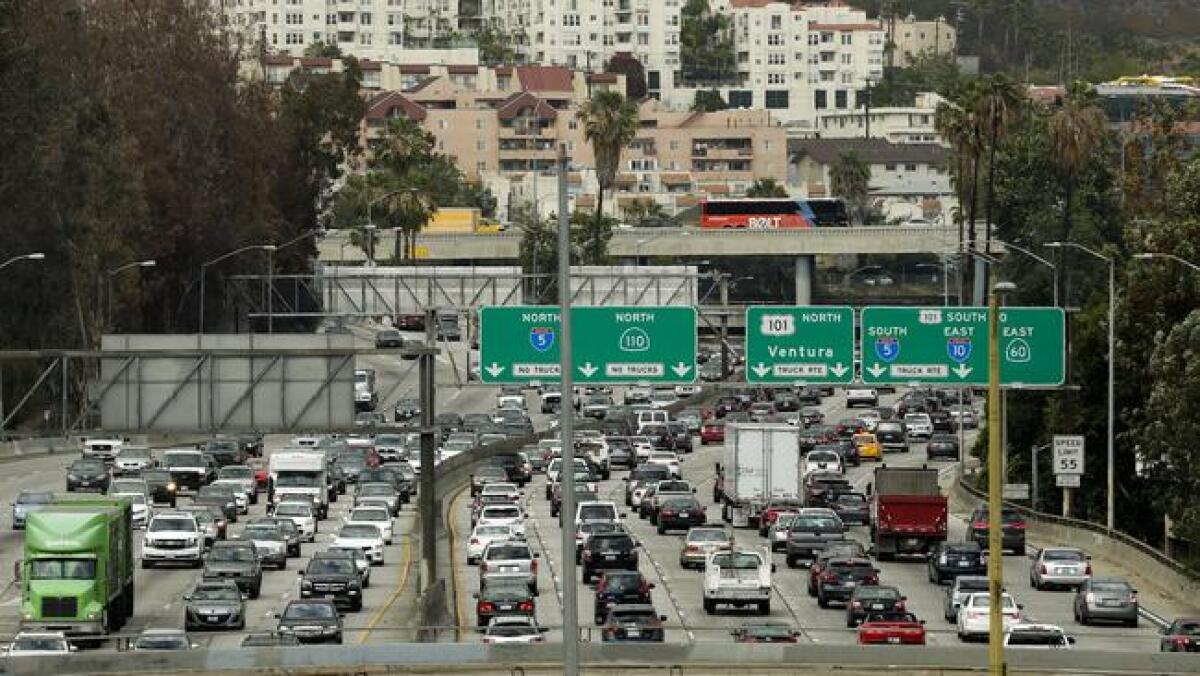
Speculation over a potential last-minute push on a transportation funding plan ended Tuesday, when Gov. Jerry Brown and legislative leaders declared there would be no lame-duck negotiations this month.
The current two-year session of the Legislature officially ends on Nov. 30, and lawmakers have left talks on a multi-billion transportation plan in limbo since adjourning in August.
Brown joined Senate President pro Tem Kevin de León (D-Los Angeles) and Assembly Speaker Anthony Rendon (D-Paramount) in ending any speculation of a late effort to bring current lawmakers back to the state Capitol.
“While there will not be a lame-duck session of the Legislature to approve a transportation funding deal in 2016, our work on this critical issue continues,” the three men wrote in a letter to transportation groups.
Brown had put forth a $3.6-billion transportation proposal this summer, while some Democratic legislators wanted a plan to repair roads and highways of $7.4 billion. The long impasse over a deal centered on Republican opposition to efforts to raise the state gas tax as part of the package.
Brown and the legislative leaders wrote that they remain committed to working on the issue when the new Legislature convenes in January.
Voters narrowly reject Proposition 53 and future votes on big infrastructure projects
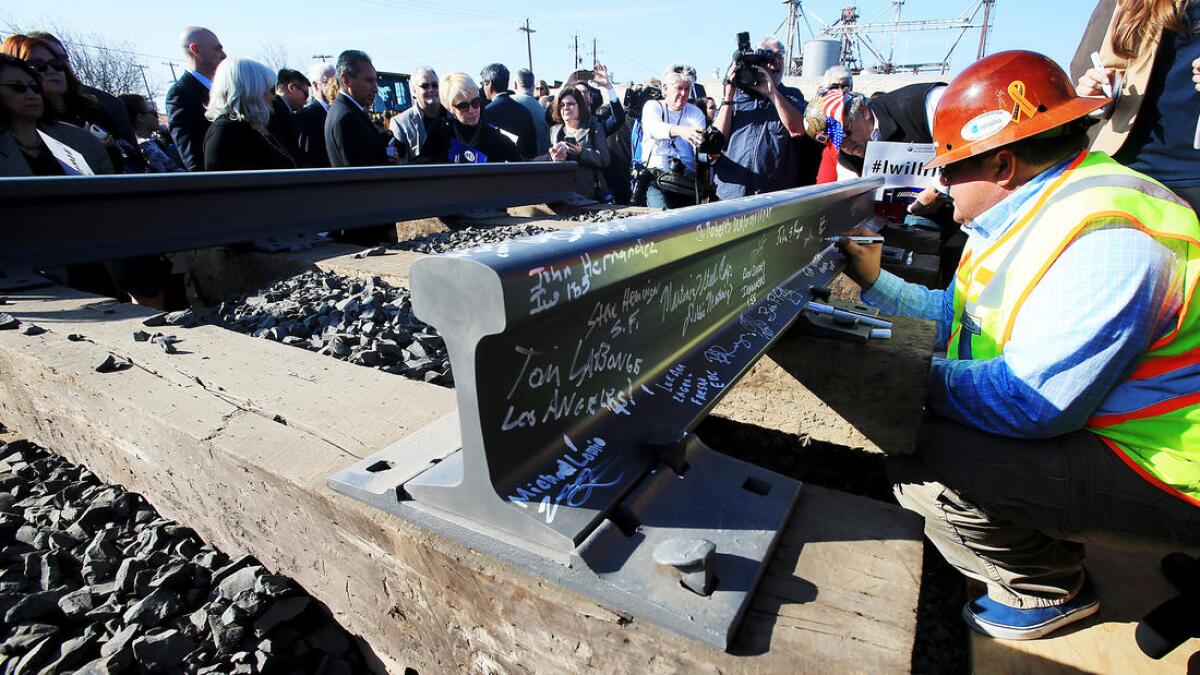
Proposition 53, an effort that sought to force statewide votes to fund a major water project and the future of high-speed rail, failed in a late count of ballots Tuesday.
An Associated Press tally of votes found the ballot measure, which had been trailing since election night, narrowly lost.
Proposition 53 would have required state revenue bonds, borrowing that’s generally paid back by users of a large public works project, of $2 billion or larger to be approved by voters statewide. Revenue bonds could be an integral part of the future $17-billion effort to build twin underground water tunnels through the Sacramento-San Joaquin River Delta region. They could also be required to complete the controversial high-speed rail project from San Francisco to Los Angeles.
Throughout California history, only bonds re-paid by taxpayers through the state budget — general obligation bonds — have been subject to approval through a ballot measure.
Proposition 53’s author, Stockton agribusiness owner Dean Cortopassi, insisted that his proposal was a way to force additional transparency about the cost of long-term government debt. He single-handedly bankrolled the ballot measure, but it spent much of the campaign season under the radar on a ballot featuring 17 propositions.
Gov. Jerry Brown launched a flurry of last-minute campaign events to help defeat the proposition, an effort backed by both business and labor groups that believed the new law would create an impediment to major projects across the state.
Democrat Josh Newman’s lead widens in state Senate race against GOP assemblywoman
Democrat Josh Newman takes the lead in drawn-out battle over state Senate seat and supermajority
Josh Newman has taken the lead in his tightly contested race for a Southern California state Senate seat that could hand a supermajority to Democrats in both houses of the Legislature.
Newman, a Democrat, is ahead by 829 votes following the latest release of vote counts by Orange County elections officials Monday afternoon.
The new vote count does not include updated returns from Los Angeles County, where about 18% of voters in the 29th Senate District live, or San Bernardino County, which contains 8% of voters.
On Friday, GOP Assemblywoman Ling Ling Chang (R-Diamond Bar) was ahead, but her lead had narrowed to fewer than 200 votes.
Newman’s position could change yet again with new tabulations from San Bernardino County, where he had previously been trailing Chang by 2,294 votes.
Los Angeles County plans to release updated numbers later Tuesday, while San Bernardino County has a planned update Wednesday.
House Minority Leader Nancy Pelosi lays out her priorities for aggressive opposition against Trump administration
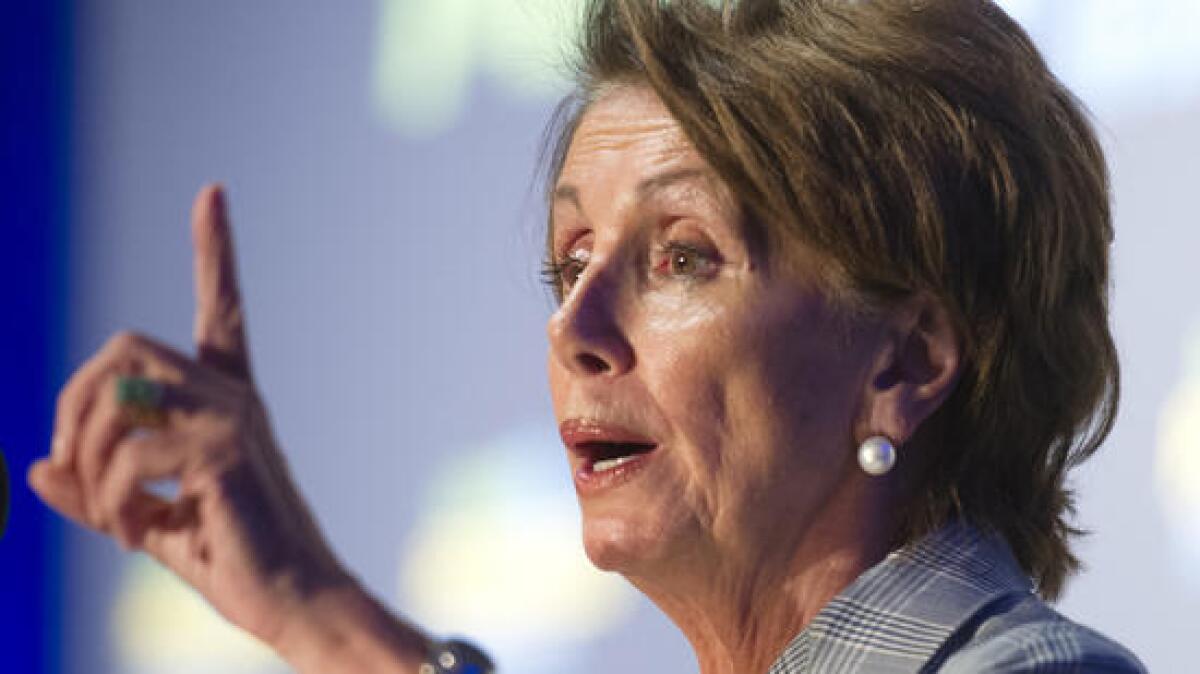
House Minority Leader Nancy Pelosi says she plans to lead an aggressive opposition against President-elect Donald Trump and a GOP-controlled Congress, naming jobs, veterans and Medicare as the top priorities.
But first, Pelosi, who is being challenged for her leadership position by Rep. Tim Ryan of Ohio, is making an attempt to quell disenchantment within the House Democratic Caucus she has run for 14 years.
In a letter to colleagues sent Wednesday, Pelosi (D-San Francisco) said Democrats must push back against the privatization of the Veterans Affairs health system and “insist on a bill that puts good-paying jobs for workers first — not one that is a corporate tax break disguised as an infrastructure bill.”
On Medicare, she said the GOP is “feeling emboldened to shatter the sacred guarantee that has protected generations of seniors.”
“If Speaker [Paul] Ryan presses forward with his plans to end Medicare as we know it, we will stand firmly and unified to stop him,” she said.
Pelosi’s leadership has come under fire from her opponent for the minority leader role, who has said Democrats have been reduced to their smallest congressional minority since 1929. But Pelosi has countered that she has the support of two-thirds of the caucus and helped Democrats regain the majority in 2006 while President George W. Bush was in office.
In an interview with Politico, the Democratic leader said she is the only one who can bring Democrats back to the House majority.
“I don’t intend on this phone call, or any conversation with members, to make myself a lame duck,” Pelosi told Politico. “What you have to do when you’re going into this is to go in with the most strength as possible. That’s just the way it is.”
California Legislature sees a rise in diversity but a drop in women
The new California Legislature will look slightly more racially and ethnically diverse than the last, but its number of women has dropped lower than it has been in more than two decades, according to an analysis of preliminary 2016 election results from the California Research Bureau.
Of the 89 members in office, the number of nonwhite lawmakers has increased from 47 to 53, with gains made among Asian/Pacific Islander, Latino and multiracial lawmakers.
The rise in diversity is most pronounced in the Assembly, where the majority, or 54%, of legislators are now minorities.
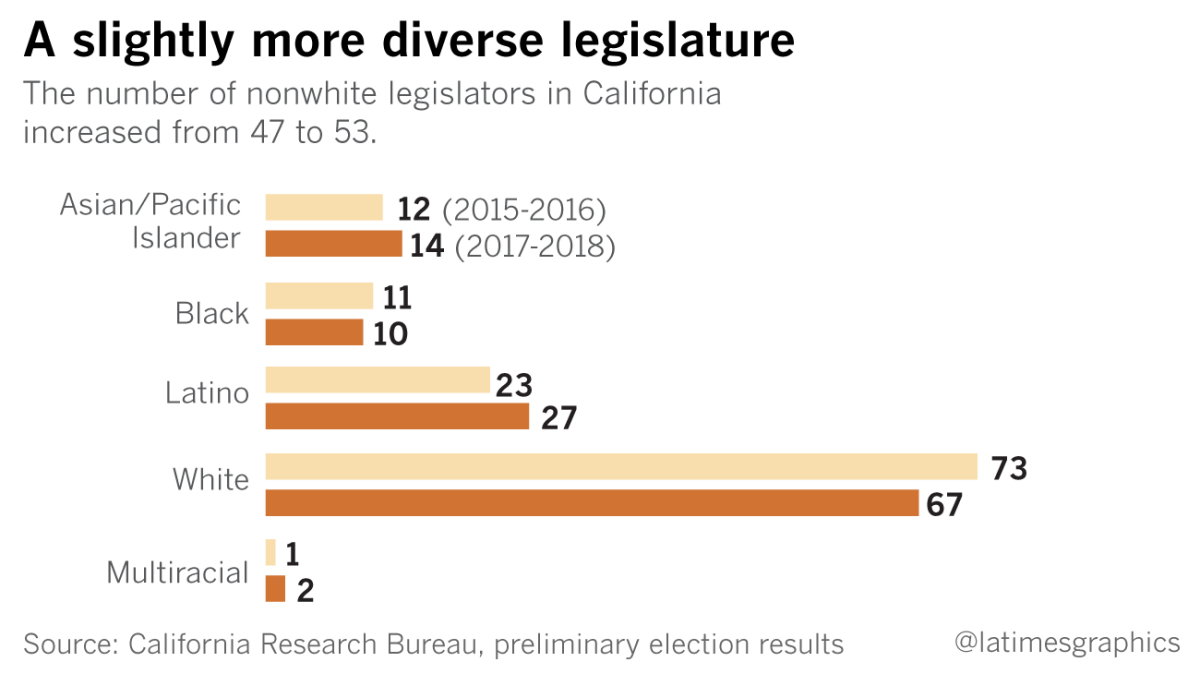
But the number of black lawmakers decreased by one. The total of female legislators dropped by four and now stands at 27. There have not been fewer women in office since 1991-92, and only in 1997-98 has that figure been equally low.
Assemblywoman Cristina Garcia (D-Bell Gardens), vice chair of the California Legislative Women’s Caucus, said the Democratic Legislative Women’s Caucus over the last two years “has worked to identify, recruit and help women run,” she said. But leaders on both sides of the aisle needed to replicate those efforts, she said.
“Unfortunately, there’s a real chance that not a single Republican woman will be elected this cycle to the Legislature even though half were termed out,” she said.
All demographic groups saw decreases in the number of women, except Latinas, which doubled their ranks from 5 to 10 lawmakers, according to the report.
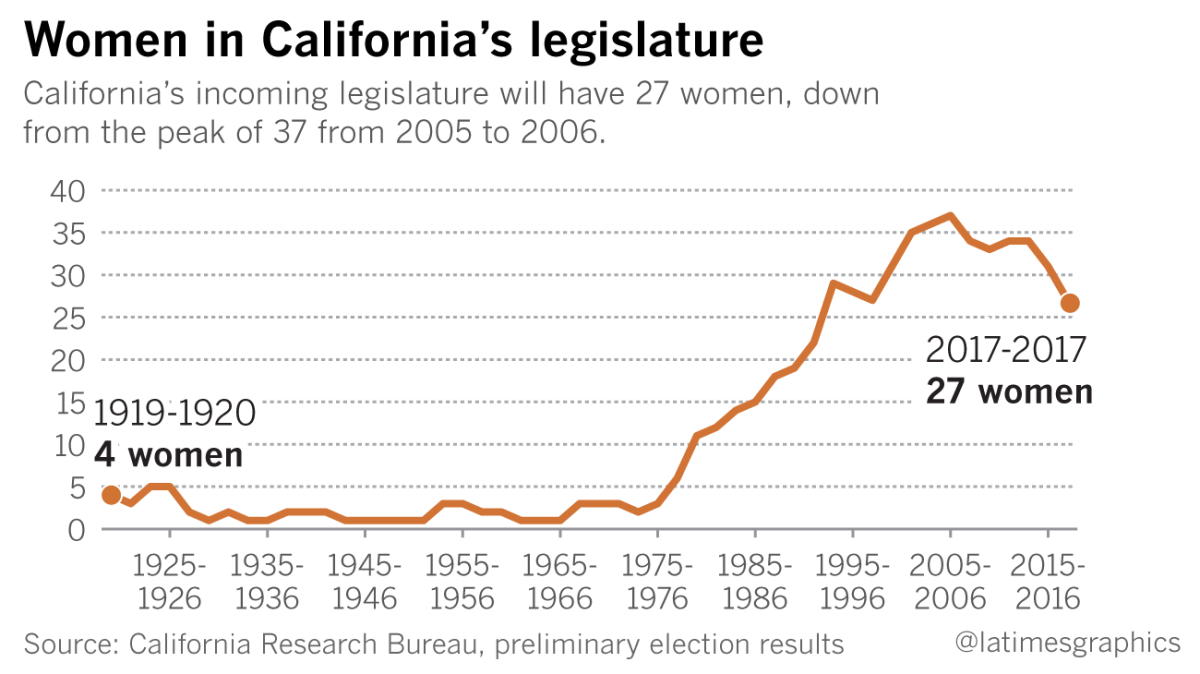
Assemblyman Luis Alejo (D-Salnias) said that was due to an intentional and well-coordinated effort to close the gender gap led by the California Latino Legislative Caucus.
Latino lawmakers had been watching the number of women in office decline since 2014, Alejo said, and last year endorsed 10 Latina candidates out of the 14 they supported for the state Assembly and Senate.
Latinas saw wins in districts where Latinos had never held office before and that many initially thought unlikely, such as Monique Limon in Santa Barbara and Sabrina Cervantes in Riverside County.
“We were very strategic about recruiting, endorsing and financially supporting Latina candidates,” said Alejo, chair of the caucus. “We were very successful because of the early commitment and planning that we carried out this election cycle. But it’s not enough and we are committed to increasing the overall numbers of women.”
More than 2 million California votes remain to be counted with almost half in Los Angeles and San Diego
Skelton: Colin Kaepernick complains about the system. He should work to change it by voting

America has a lot more pressing concerns than whether a mediocre quarterback for a lousy football team stands or kneels during the national anthem.
Standing during the pregame ritual, as practically all of us do, shows respect for the flag and expresses pride and gratitude in being an American.
We thank our lucky stars.
Kneeling, as San Francisco 49er Colin Kaepernick has been doing all season to protest alleged police brutality and the oppression of black people, is certainly within his right.
Personally, I think it’s misguided because it disrespects the core foundation of America and the Constitution that guarantees us the right to protest against systemic imperfections. Protest the imperfections, but not the whole of America, which the national anthem honors.
Moreover, it’s counterproductive. Black lives do matter, and too many police need to be better trained and not so quick on the trigger. But the simplistic kneeling by Kaepernick and other players who have copied him has focused much more attention on their behavior than on the real problems they’re protesting.
What really fries me, however, is that Kaepernick — the supposed committed idealist — didn’t bother to vote Nov. 8.
California Democrats brace for President-elect Donald Trump
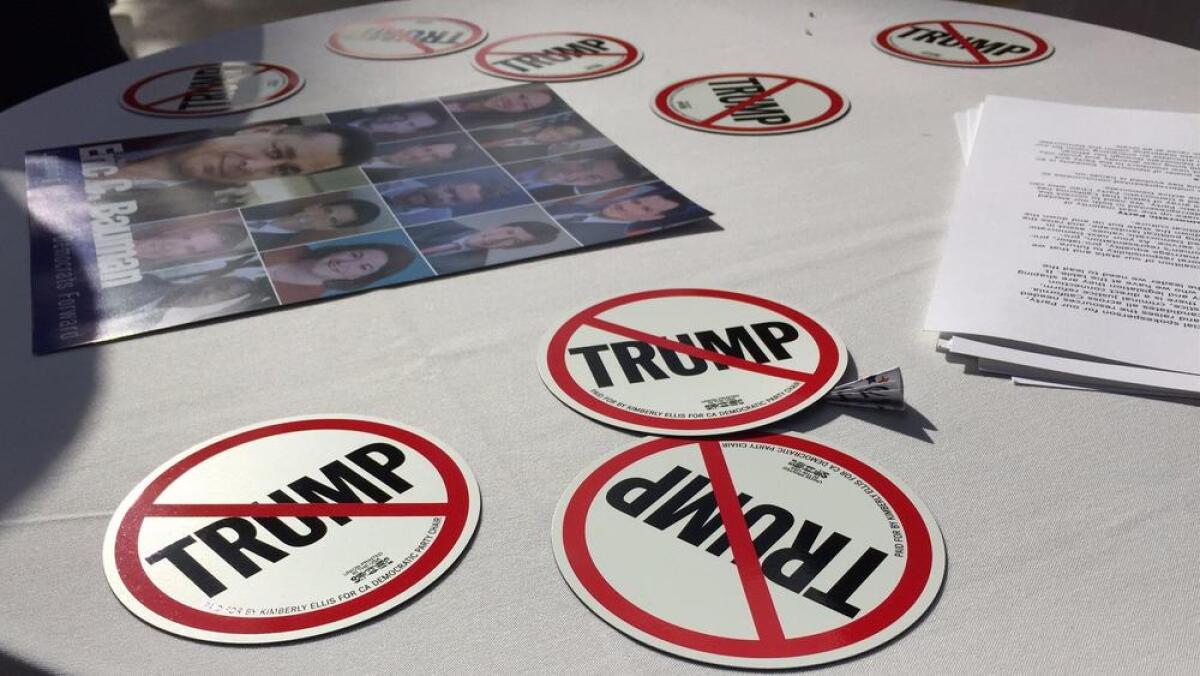
Leaders of the California Democratic Party spent the weekend in San Diego strategizing how to deal with the political era of President-elect Donald Trump. The meeting ended up being part therapy session, part pep rally.
“Donald Trump’s election was a shocking mistake of historical proportions. His dangerous ideas and policies threaten the freedom, the safety and the prosperity of every American,” said environmental activist Tom Steyer, a San Francisco hedge fund billionaire who has been flirting with a 2018 run for governor. “This is our moment. We will rise to the occasion because there is no one else.”
Secessionists formally launch quest for California’s independence
Supporters of a plan for California to secede from the union took their first formal step Monday morning, submitting a proposed ballot measure to the state attorney general’s office in the hopes of a statewide vote as soon as 2018.
Marcus Ruiz Evans, the vice president and co-founder of Yes California, said his group had been planning to wait for a later election, but the presidential election of Donald Trump sped up the timeline.
“We’re doing it now because of all of the overwhelming attention,” Evans said.
The Yes California group has been around for more than two years, Evans said. It is based around California taxpayers paying more money to the federal government than the state receives in spending, that Californians are culturally different from the rest of the country, and that national media and organizations routinely criticize Californians for being out of step with the rest of the U.S.
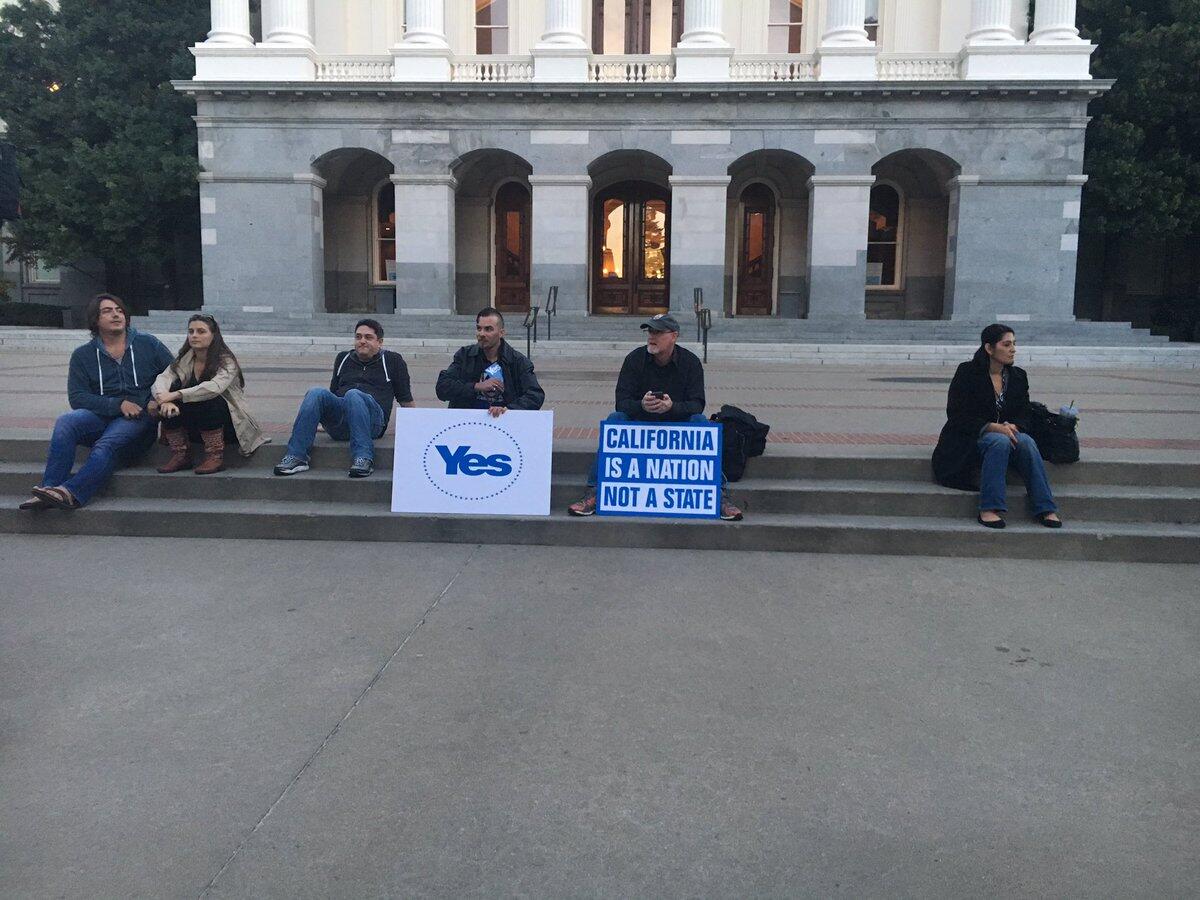
The attorney general’s office will give the ballot measure a title and summary, and Evans said he hopes to begin collecting signatures to get it on the ballot in the spring. Qualifying ballot measures typically requires significant resources to pay signature gatherers, and Yes California doesn’t have major financial backing. But Evans said 13,000 people have volunteered to collect signatures.
“This is real,” Evans said. “We treat it seriously.”
Various groups have made noise about California forming its own country in the wake of Trump’s election this month, most prominently Silicon Valley financier Shervin Pishevar. But similar proposals have dotted the state’s political landscape for years. Yes California has tried and failed previously, and Silicon Valley venture capitalist Tim Draper was not able to get a proposal to split California into six states onto the 2016 ballot.
California Democratic Party leaders may be asked to fess up when paid to back ballot measures
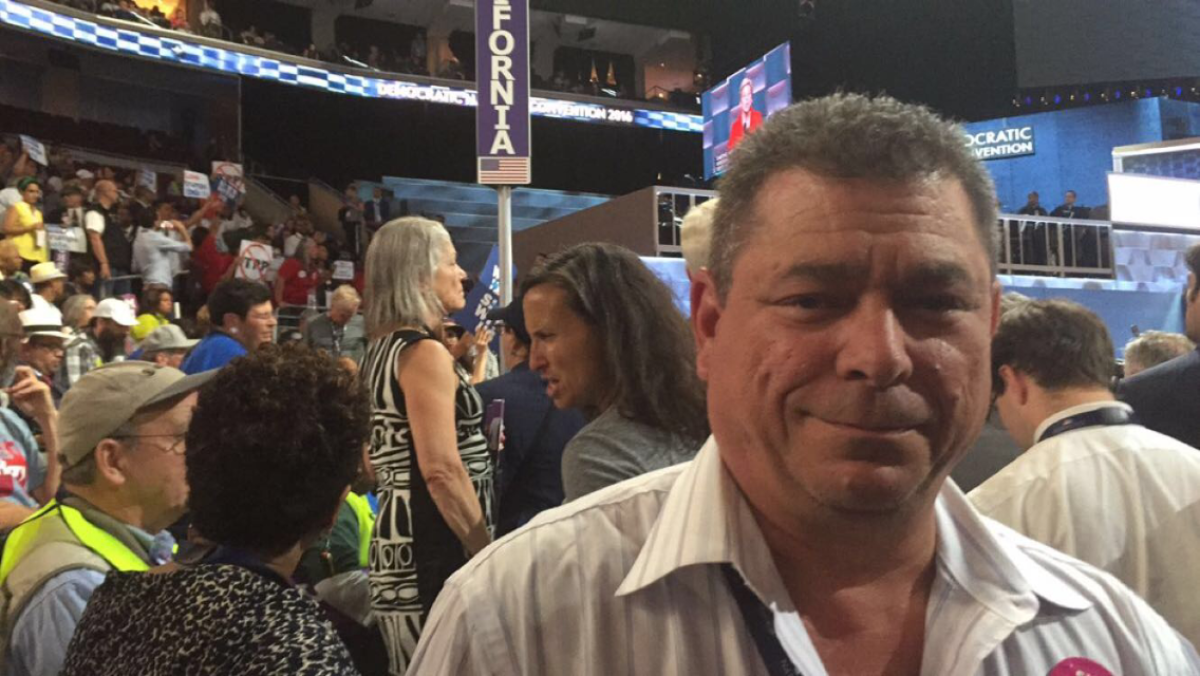
The California Democratic Party is considering a new policy that would require party leaders to fully disclose any compensation they receive to advocate for a statewide ballot initiative or candidate for state office.
The push for transparency comes after Eric Bauman, chairman of the Los Angeles County Democratic Party and a candidate for state party chairman, faced criticism after his political consulting firm was paid by opponents of Proposition 61, which voters rejected on Nov. 8.
The statewide ballot measure sought to lower prescription drug prices by requiring that state agencies pay no more for medicines than the federal Department of Veterans Affairs.
Bauman’s firm, Victoryland Partners in North Hollywood, received more than $100,000 from the pharmaceutical industry that opposed the measure.
The firm was also a paid consultant for supporters of Proposition 51, a $9-billion bond for school construction projects across the state; Proposition 52, to make permanent the hospital fee program that helps fund Medi-Cal; and Proposition 64, to legalize marijuana. All three measures passed.
Democrat Susie Shannon of Los Angeles said the new policy is necessary so party members know if any party leaders are being paid to lobby them on behalf of a ballot measure or candidate.
“What is at the core of the integrity of this party is transparency,” Shannon said.
The issue came before the rules committee at the California Democratic Party’s executive meeting in San Diego this weekend. The committee voted to draft the proposal so that it can be presented for a vote at the party’s May convention in Sacramento.
Bauman told the committee he was in favor of the change.
“I support this 100%,” he said.
Kimberly Ellis, who also is running for chair of the state party, said the initial proposal calling for members to simply disclose any financial interests in a ballot measure or candidate was too vague, and asked to committee to broaden its scope.
“Is this a party of the special interests or is it a party of the people?” asked Ellis, executive director of Emerge California, which works toward increasing the number of Democratic women elected to public office.
California Democratic Party shuns donations from ‘big oil’ — for now

The California Democratic Party will no longer accept political donations from oil companies or their representatives in Sacramento.
The decree was handed down by Chairman John Burton and announced at the party’s executive committee meeting in San Diego on Saturday.
“I felt that big oil was just swaggering around the Capitol,” said RL Miller, president of Climate Hawks Vote Political Action and chair of California Democratic Party’s Environmental Caucus. “They just have too much influence in Sacramento.”
Miller urged Burton to enact the new policy. Burton’s term as chairman of the party ends next year, however, and the ban can be rescinded by the party leader who takes his place.
Bernie Sanders supporters blame corporate Democrats for Trump victory
Supermajority hanging in the balance, state Senate race margin narrows to just 187 votes

The Senate race between Assemblywoman Ling Ling Chang (R-Diamond Bar) and Democrat Josh Newman has narrowed significantly, making the Democrats’ chances of securing a supermajority in both houses of the Legislature suddenly much more likely.
As of Friday afternoon, as outstanding votes continued to be counted, Chang’s lead over Newman had been cut to just 187 votes in the 29th Senate District, which includes parts of Orange, Los Angeles and San Bernardino counties.
The day after the election, Chang enjoyed a nearly 3,900-vote advantage, but that lead shrank dramatically as mail and provisional ballots were tallied this week.
Democrats already have secured a supermajority in the Assembly, but doing the same in the state Senate, where they needed to flip only one seat, seemed unlikely until Friday’s vote totals were reported.
With a supermajority, a political party can raise taxes, place measures on the statewide ballot, enact laws immediately with an “urgency” clause and override a governor’s veto.
It could be more than a week before the final tally is made available: Orange County, which accounts for the biggest bloc of voters in the district, says it has about 13,000 ballots left to count in the race. San Bernardino County needs to count about 2,000 ballots, according to officials.
“I don’t think all the votes will be counted before Thanksgiving Day,” said Jim Nygren, a consultant for Chang. “We’ll just keep watching the votes.”
If either candidate decides to ask for a recount, which they would be required to pay for, the final outcome may not be determined for months.
Times staff writer Liam Dillon contributed to this report.
Rep. Ami Bera declared winner in his reelection race

Rep Ami Bera will keep his U.S. House seat after a narrow victory over Sacramento County Sheriff Scott Jones in California’s 7th District.
When the Associated Press called the race Friday afternoon, more than a week after the election, Bera led Jones by a little more than 6,000 votes, or less than three percentage points.
His win ends a contentious race that saw both candidates plagued by scandals.
Bera faced scrutiny due to revelations his father illegally funneled money to two of his past campaigns. In August, a federal judge sentenced the elder Bera to a year and a day in prison. The congressman has said he didn’t know about his father’s illegal behavior and in May the U.S. attorney’s office said it found no evidence he was involved.
Over the summer, allegations surfaced that Jones sexually harassed a subordinate at the Sheriff’s Department. In a court deposition, a female deputy working for Jones said he made multiple unwanted sexual advances to her more than a decade ago, the Sacramento Bee reported in July. Jones has denied the allegations.
Bera used the allegations and Jones’ tough stance on illegal immigration to compare his opponent to Donald Trump, who has faced claims of sexual harassment from multiple women.
Times staff writer Christine Mai-Duc contributed to this report.
Kamala Harris zings Trump attorney general pick: ‘Jefferson Beauregard Sessions’ is ‘troubling’
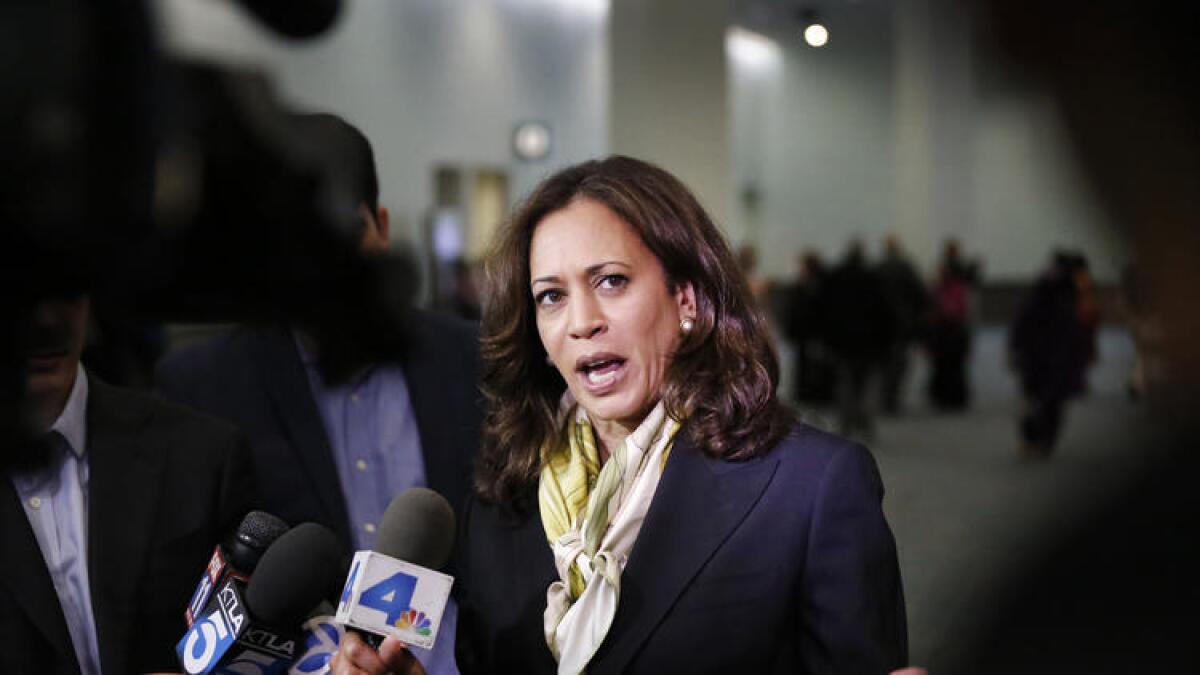
California’s newly elected U.S. Sen. Kamala Harris on Friday criticized President-elect Donald Trump’s choice for attorney general, saying he holds views that are “incompatible with constitutional guarantees.” She pointedly referred to GOP Sen. Jeff Sessions of Alabama by his given name: Jefferson Beauregard Sessions.
Sessions is considered one of the most conservative members of the Senate, and in the 1980s his nomination to become a federal court judge was blocked over allegations he made several racially offensive remarks.
Harris called the selection “troubling.”
“I have deep concerns about Senator Sessions’ nomination. Particularly, I am concerned with his support for policies that would undermine core Department of Justice functions and his views that are incompatible with constitutional guarantees,” Harris said in a statement.
She also said Sessions deserves a fair and thorough confirmation hearing by the Senate.
Democratic Rep. Ami Bera’s lead grows in tight Northern California congressional race
What’s next for Assemblywoman Patty Lopez? Maybe a run for L.A. school board
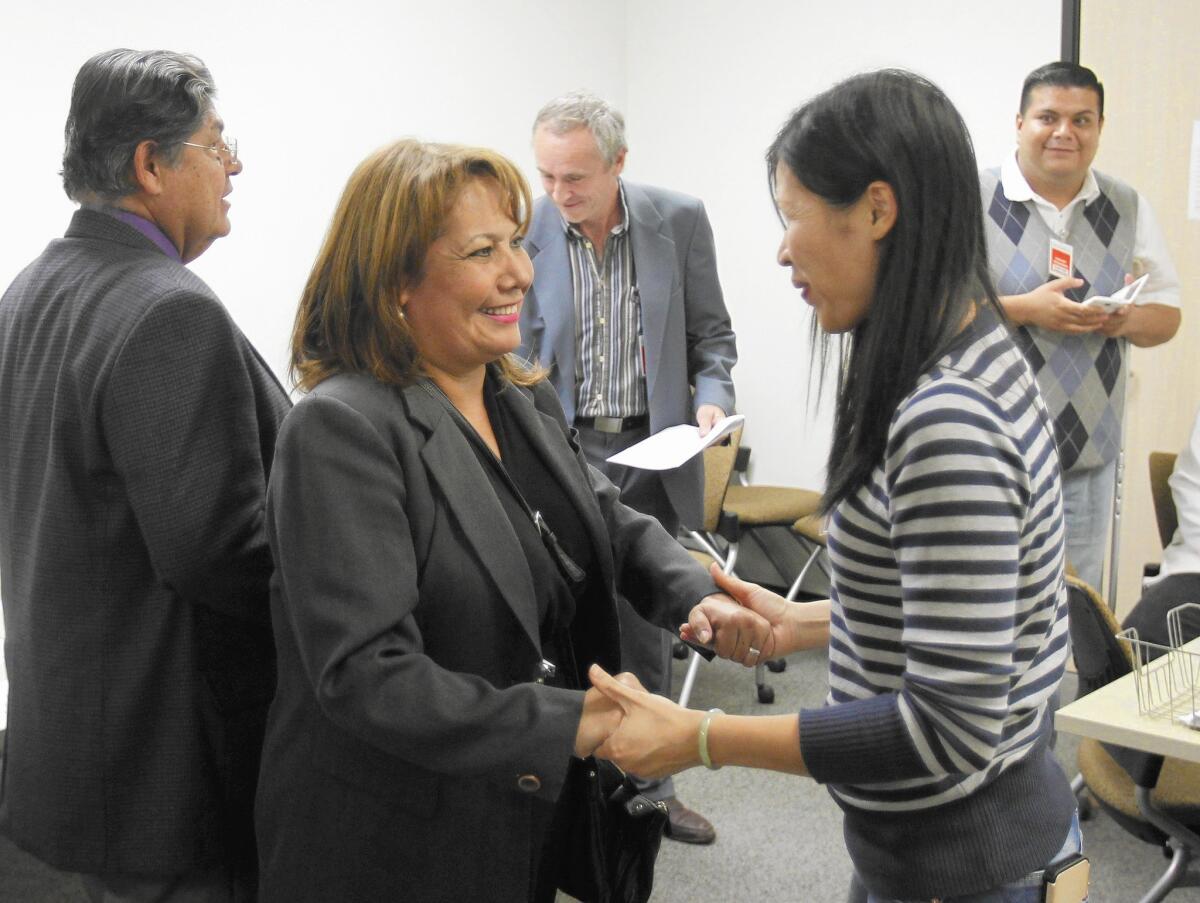
Defeated first-term Assemblywoman Patty Lopez (D-San Fernando) is eyeing a run for the Los Angeles Board of Education next year.
Lopez, who lost her 39th District seat to former Assemblyman Raul Bocanegra last week, filed papers with the Los Angeles city clerk to run for the school board seat.
She has until Dec. 7 to submit at least 500 nominating signatures for her campaign. Lopez would be running to replace Monica Ratliff, who is raising money for a possible City Council run. Ratliff represents the LAUSD board’s 6th District, which includes much of Lopez’s current Assembly district.
The city’s primary elections will be held March 7, and the general election is May 16. If elected, Lopez would serve a 5 1/2-year term, as local school board elections are to be synchronized with state and national election cycles starting in 2020.
Lopez, a local community activist who shocked the Democratic establishment when she beat Bocanegra in 2014, ran on a platform focused on education, and has maintained her advocacy for adult education in particular during her time in Sacramento.
In recent weeks, she had expressed a desire to return to community activism if she was not reelected.
Rep. Keith Ellison, who is in the running to be the next DNC chair, will meet with California Democrats on Saturday
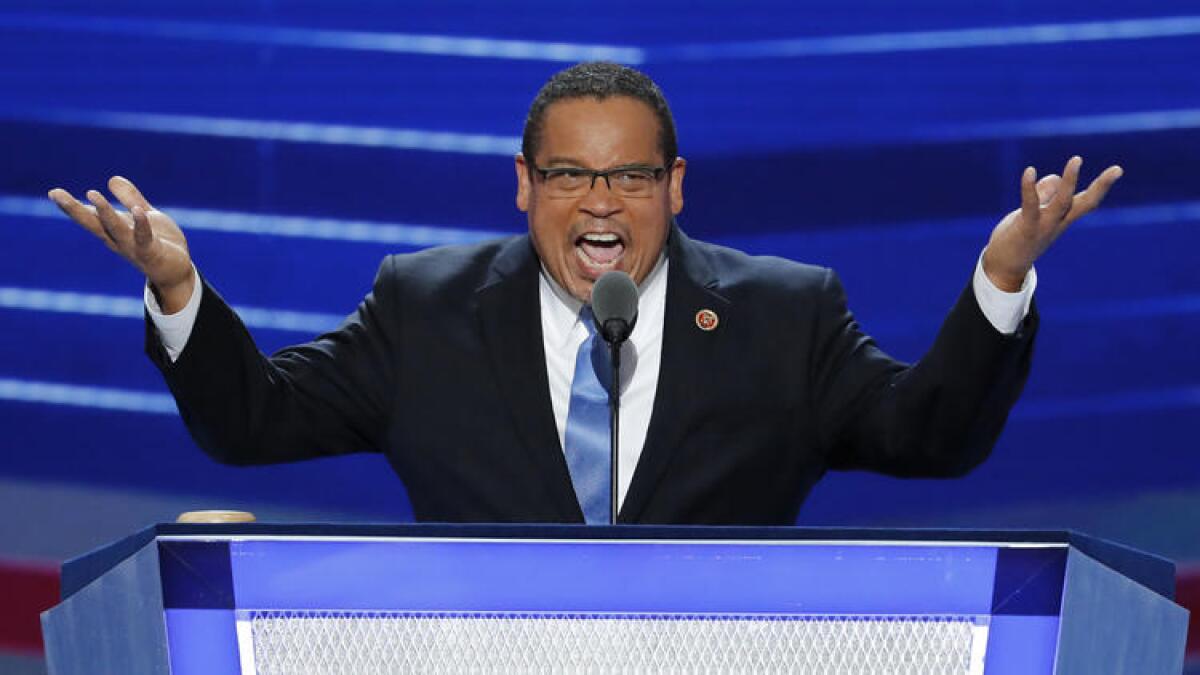
Rep. Keith Ellison of Minnesota, who is gathering support in his bid to be the next chairman of the Democratic National Committee, will meet with California party members this Saturday as they prepare for the new political era of President-elect Donald Trump.
Ellison, a progressive Democrat who was the first Muslim American elected to Congress, will be speaking to members of the California Democratic Party’s executive committee at their weekend conference in San Diego.
Trump’s victory over Hillary Clinton, and how the party should respond, is expected to be a primary topic at the meeting.
Ellison’s bid to head the DNC already has the support of Sen. Bernie Sanders and New York Sen. Charles Schumer.
The national party was rocked by controversies this past election season, including leaked emails that hastened the departure of former chairwoman Rep. Debbie Wasserman Schultz of Florida. The emails, made public by WikiLeaks, showed her staff members discussing ways to undermine Sanders during the Democratic primary.
In Donald Trump’s America, will California replace Texas as chief antagonist?
As California turned blue on election night, state political leaders found themselves at odds with an incoming presidential administration some see as an existential threat to the progressive work they have accomplished.
In the days since, California’s Democratic leaders have rushed to set up the state as a liberal counterweight to President-elect Donald Trump, laying the groundwork for four years of battles with Washington.
The posture is out of character for a state that in recent times has not tended to view federal power with hostility. But it seems to be taking a cue from a perennial rival: Texas playing the role of chief antagonist to President Obama.
Better get a jump on it if you want tickets to Donald Trump’s inauguration
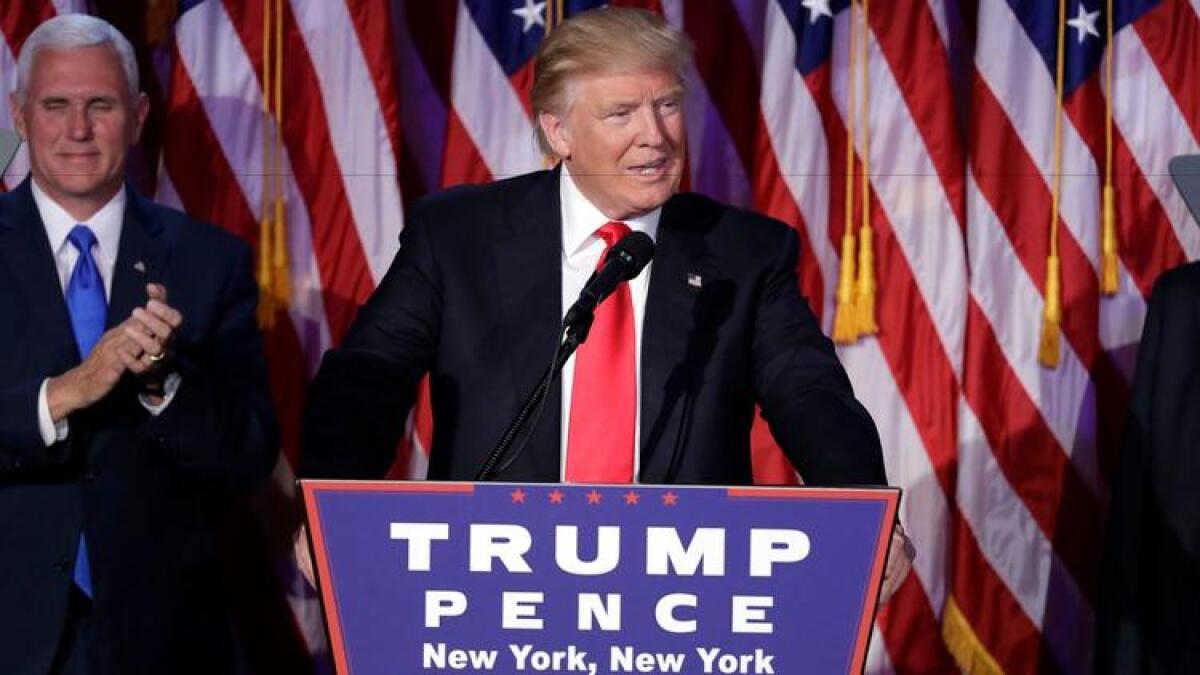
Want to be there in person to see Donald Trump sworn in as the nation’s 45th president? It’s time to start talking with your member of Congress.
Each congressional office receives a limited number of tickets for the swearing-in ceremony held on the Capitol’s west steps on Jan. 20. The tickets are normally standing room only, and there are some spaces in the area to glimpse the new president taking the oath even if you don’t get a ticket.
It’s not yet clear how many tickets each office will get this year, and a few offices have already started talking about giving them away. The majority of California’s 55 members (39 of whom are Democrats) haven’t put out a public call for takers yet.
But Rep. Linda Sanchez (D-Whittier) announced she’s distributing her district’s tickets by lottery, and Rep. Darrell Issa has announced he’s allowing people to request them on his website.
With the unexpected-by-many election result, some Washington hotels still have rooms available at a premium price.
Assemblywoman Young Kim concedes in Orange County race against Sharon Quirk-Silva
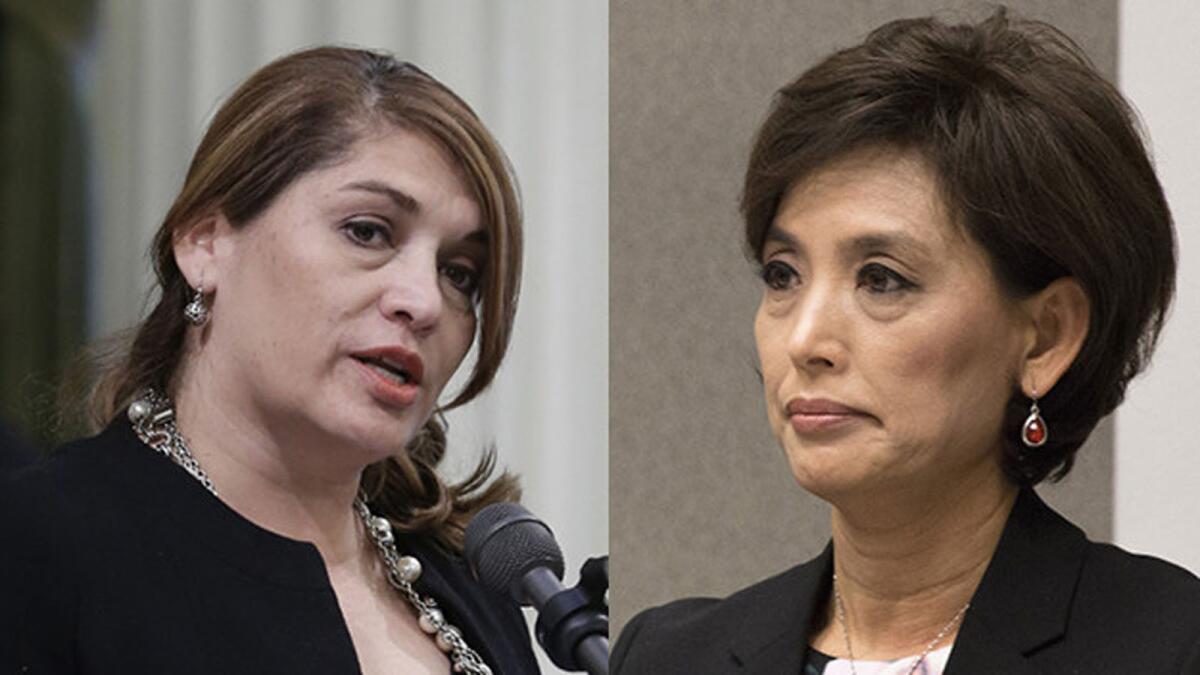
In the close race for the 65th Assembly District, Republican Assemblywoman Young Kim (R-Fullerton) has conceded to Sharon Quirk-Silva, according to a statement released by Kim Thursday evening.
Kim said she called Quirk-Silva Thursday to congratulate her.
“As our area faces some serious challenges in the weeks and months ahead, I will keep Sharon Quirk-Silva in my prayers that...she will have the knowledge and judgment to be the leader our area deserves.”
The closely watched race drew millions of dollars in spending from both parties and helped Democrats secure a supermajority in the Assembly.
Quirk-Silva declared victory Wednesday, after her election night lead grew by nearly 3,000 votes as absentee ballots were counted. As of Thursday evening, that lead had grown to more than 6,600 votes, or 5 percentage points, according to the latest vote count with the Orange County Registrar of Voters.
The Associated Press called the race in Quirk-Silva’s favor Thursday.
Kim thanked her campaign staff and volunteers, saying the result was “obviously disappointing.”
Strategists explain what happened during the 2016 election at Times symposium
How did Donald Trump end up on the path to the White House?
Nine days after the presidential election, a bipartisan group of consultants and politicians came together for an L.A. Times panel to figure out what we all just went through and what’s next.
Democratic consultants including Sean Clegg, who worked for California Sen.-elect Kamala Harris this cycle, agreed that Trump’s populist message tapped into a part of the electorate in Rust Belt states that Hillary Clinton’s campaign did not appeal to.
“It was the economy, stupid, and we were stupid on the economy,” Clegg said.
Mickey Kantor, a former Commerce secretary under President Bill Clinton, said Trump’s win reflected a worldwide angst among older workers about their place in a rapidly shifting economic and technological landscape, and cited Britain’s “Brexit” vote to leave the European Union.
“People are looking for something strong that they can hang onto,” he said.
Trump, he said, provided that.
Tim Clark, the Trump campaign’s California director, said since there was no ground game in California, volunteers focused on calling swing states.
Others wondered whether Trump would fulfill his promise to deport millions of Mexicans in the United States or establish a registry for Muslim Americans.
“We should take him at this word,” said Bill Burton, deputy White House press secretary in President Obama’s first term.
Kantor called the controversial appointment of Stephen K. Bannon as Trump’s chief strategist “ominous,” and rumors that Sen. Jeff Sessions (R-Ala.) could end up on Trump’s Cabinet “a real problem.”
Republican strategist Rob Stutzman, who used to work in former California Gov. Arnold Schwarzenegger’s administration, was an outspoken Trump opponent and questioned whether the president-elect would follow through on all of his campaign promises.
He said Trump would squander all of his political capital if he actually went through with mass deportations.
Imagine, he said, federal agents knocking on the doors of millions of immigrants in the U.S. and detaining them for deportation while their family members or neighbors capture the video on cellphones.
“And all of that goes to Facebook?” he said. “I do think [Trump] is smart enough to consider that.”
Clegg said that regardless of whether Trump follows through with this promises, “we are in for a social movement that we have not seen in this country since the 1960s” in opposition to Trump’s administration.
Bill Carrick, a Democratic consultant who advised Loretta Sanchez’s unsuccessful campaign for Senate, said Trump’s promises for new infrastructure spending and to protect entitlements would not play well with House Speaker Paul D. Ryan’s stated goals of reducing government spending.
“Everybody buy the popcorn, get in the seats — it’s gonna be a show,” he said.
California Democrats ask Obama to pardon nearly 750,000 ‘Dreamers,’ but White House says it wouldn’t work
The members of Congress who persuaded President Obama to grant temporary legal status to hundreds of thousands of immigrants brought into the country illegally as children are now asking him to use a pardon to prevent those immigrants from being deported by President-elect Donald Trump.
The White House, however, promptly batted down the idea.
Reps. Zoe Lofgren (D-San Jose), Lucille Roybal-Allard (D-Downey) and Luis Gutiérrez (D-Ill.) sent a letter to Obama on Thursday asking him to use his pardon authority to forgive the past and future civil immigration offenses of the nearly 750,000 people granted deportation deferrals under the Deferred Action for Childhood Arrivals, or DACA, program.
They believe that would keep those people from being deported, and even though it would leave them in legal limbo without work permits or visas, they could more easily apply for legal status from within the U.S. without immigration offenses on their records.
“They wouldn’t have a piece of paper, they wouldn’t have work authorization, but they wouldn’t have to be living in fear every moment of their lives about deportation,” Lofgren said after a news conference Thursday.
Lofgren, a former immigration attorney, said the pardons would probably be applied to the civil offenses related to entering and remaining in the country without authorization.
But whether a pardon would actually be applicable in the so-called Dreamers’ situation is unclear. Lawyers disagree over whether the immigrants could be pardoned for civil crimes they haven’t been formally accused of, and whether such a pardon would actually prevent them from being deported while they seek legal status.
A White House official signaled late Thursday that the administration was not considering a pardon for those registered under DACA because it believes a pardon would not allow them legal status.
“We note that the clemency power could not give legal status to any undocumented individual. As we have repeatedly said for years, only Congress can create legal status for undocumented individuals,” an administration official said.
After immigration reform efforts stalled in Congress during Obama’s first term, the Congressional Hispanic Caucus pressured Obama to act independently to protect from deportation certain immigrants brought into the country illegally when they were children. He then used an executive order to create the DACA program in 2012.
The Dreamers, one in three of whom are estimated to live in California, gave the Department of Homeland Security their fingerprints, home addresses and other information to undergo background checks that allowed them to defer deportation under DACA.
At the time, advocates and the administration emphasized that providing the information would protect the Dreamers and was worth the risk. But with Trump vowing to deport millions of people who are in the country illegally and many fearing he may let the DACA program expire, Dreamers are worried the information they provided will be used to deport them.
Rep. Judy Chu (D-Monterey Park), whose husband is an immigration attorney, said at the news conference she has been getting a flood of messages from frightened Dreamers. On Tuesday she sent a letter to Obama asking him to keep their information from the Trump administration.
“We promised these recipients security, and now they are facing a nightmare,” she said.
Roybal-Allard said those who pushed Obama to create the program and persuaded people to come out of the shadows to register with the government have an obligation to protect them.
“These are kids. We feel a sense of responsibility. We went out into our districts and we talked to the Dreamers, and they asked us, ‘Is it really OK for us to do this?’” Roybal-Allard said. “And we said, ‘No, don’t worry, you need to come forward.’ Now we are in a situation where all that we said, in fact, could possibly be reversed.”
Although the president’s pardon power is normally used for individual cases, there is some precedent for the chief executive to pardon a large group of people.
President Jimmy Carter pardoned half a million Vietnam War draft evaders in 1977, and at least seven other presidents have issued broad pardons.
Congress and the Supreme Court cannot undo a presidential pardon, nor can a new president.
Lofgren said if Obama doesn’t pardon the Dreamers, she hopes he responds with his own idea to help them.
“These young people are not alone, they are not going to be abandoned by us,” she said.
UPDATES
4:59 p.m. This post was updated with additional details throughout.
2:15 p.m. This post was updated with the White House’s response to the proposal.
This post was originally published at 11:30 a.m.
California Fair Political Practices Commission approves fines against state Sen. Tony Mendoza case
California politicians condemn Trump supporter’s remarks about internment and a ‘Muslim registry’
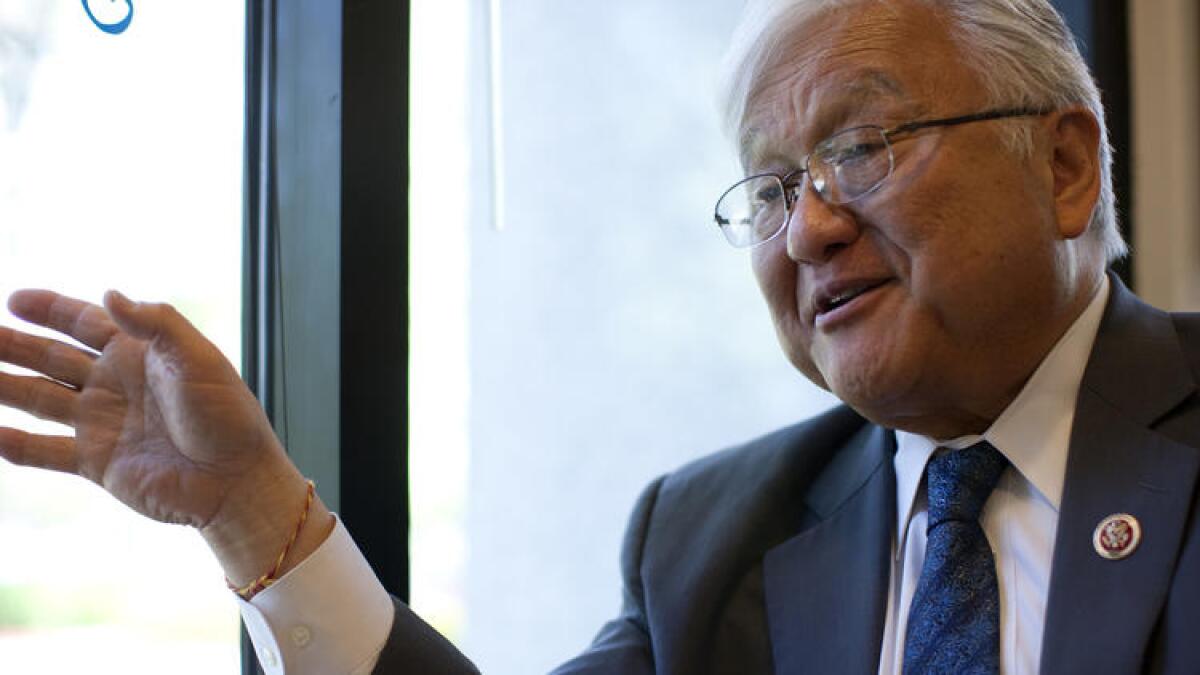
Several members of California’s congressional delegation denounced a prominent supporter of President-elect Donald Trump for his remark that the internment of Japanese Americans during World War II provided “precedent” for creating a national registration list for immigrants from predominately Muslim countries.
Carl Higbie, author of “Enemies, Foreign and Domestic: A SEAL’s Story,” defended the idea of creating a registry for such immigrants during a Fox News interview by Megyn Kelly on Wednesday night.
Rep. Mike Honda (D-San Jose), who as a child was forced into an internment camp with his family during World War II, called the remarks “beyond disturbing.”
“This is fear, not courage. This is hate, not policy. President Reagan, himself, called our internment a ‘failure of political leadership.’ This does not make America great but would take us back to the bigotry of the 1940s,” Honda said in a statement released by the Congressional Asian
Pacific American Caucus.
Rep. Mark Takano (D-Riverside) said the comment confirms many Americans’ worst fears about the incoming Trump administration.
“The imprisonment of thousands of Japanese-Americans during World War II, including my parents and grandparents, is widely understood to be one of the darkest chapters in American history,” said Takano in a statement sent to reporters. “I am horrified that people connected to the incoming Administration are using my family’s experience as a precedent for what President-elect Trump could do.”
Rep. Doris Matsui (D-Sacramento) said the United States must remain a safe haven for people of all religions, adding that “we cannot go backwards.”
Rep. Ted Lieu (D-Torrance) called on Trump to immediately condemn Higbie’s remarks and also “repudiate the idea of a ‘Muslim registry.’ ”
During World War II, more than 120,000 Japanese Americans from West Coast states were ordered to evacuate their homes and abandon their businesses and were placed in internment camps in remote areas across the West.
Supreme Court decisions in 1943 upheld the constitutionality of the military detention process. In 1988, President Reagan signed legislation that issued a formal government apology and provided reparations for those who had been interned.
“The incarceration of innocent Japanese Americans due to wartime hysteria and racism was a dark chapter in our nation’s history which led to civil rights violations so unconscionable that Congress later apologized for it,” Rep. Judy Chu (D-Monterey Park) said in a statement. “Like Japanese incarceration, imposing a registry upon American Muslims goes against our constitutional values and our very principles as a nation.”
California Rep. Mimi Walters keeps House Republican leadership post
Rep. Mimi Walters (R-Irvine) will again fill a leadership role for House Republicans.
“I am humbled that my peers unanimously reelected me to serve as their sophomore representative to House Republican Leadership,” Walters said in a statement.
Walters was tapped early for the leadership team, and she was also picked to represent her first-term colleagues in House leadership when she came to Washington in 2014. The party only has class representatives for the first two terms.
The position was created to give newer members a voice in House leadership, something Democratic members have complained they don’t feel like they have. It’s a complaint heard as part of the current challenge to House Minority Leader Nancy Pelosi (D-San Francisco).
Rep. Tim Ryan of Ohio challenging Nancy Pelosi for House minority leader
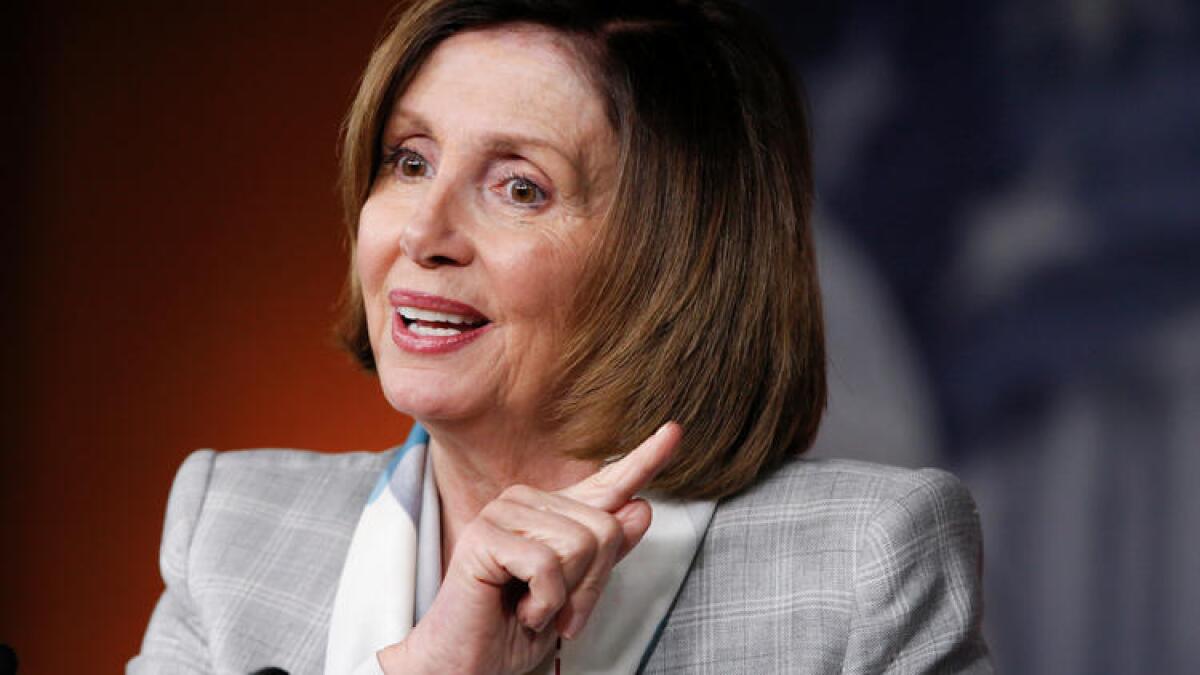
House Minority Leader Nancy Pelosi is being challenged for her leadership position by seven-term Rep. Tim Ryan of Ohio.
“What we are doing right now is not working,” Ryan said in a letter to colleagues. “Under our current leadership, Democrats have been reduced to our smallest congressional minority since 1929. This should indicate to all of us that keeping our leadership team completely unchanged will simply lead to more disappointment in future elections.”
Amid rumors of a challenge, Pelosi (D-San Francisco) had earlier agreed to push the caucus leadership election back to Nov. 30. Nonetheless, members left Thursday for the Thanksgiving break, and there is little time for opposition to organize.
Pelosi has said Democrats need to be a strong, unified force to counter President-elect Donald Trump and Republicans.
In a letter to colleagues Wednesday, Pelosi said she has the support of two-thirds of the caucus, and made the case that she helped Democrats regain the majority in 2006 while President George W. Bush was in office.
“To be a strong voice for hard-working families and to uphold the values we cherish as Americans, House Democrats must be unified, strategic and unwavering. These qualities took us to victory in 2006 and I believe they will do so again. We must start now!” she said.
Ryan, who represents a state that Trump won, noted in his letter that Democrats have controlled the chamber only twice in the last 18 years. He had a strong speaking slot at the Democratic National Convention, and was a vocal campaigner for Hillary Clinton and against Trump.
The top two House Democrats, Pelosi and Steny Hoyer of Maryland, have been in leadership positions for nearly two decades, and there have been increased rumblings from a new generation of members that it’s their turn, especially after Democrats gained less than a fourth of the seats they needed to retake the majority.
“I don’t think that you can come in and say the way forward for Democrats is to do exactly what we’ve been doing. That’s Einstein’s definition of insanity,” Rep. Seth Moulton (D-Mass.) said Wednesday. “Clearly our message hasn’t resonated, especially with people in the middle of the country.”
Several California lawmakers said they’ll support Pelosi. Rep. Doris Matsui (D-Sacramento) authored a letter signed by 50 female members (including 14 Californians) urging Pelosi to run again, saying the caucus needs her “strategic, battle-tested leadership to guide us through the years ahead.”
Rep. Eric Swalwell (D-Dublin) said Democrats need to support Pelosi as a steady hand against Trump.
Swalwell said he wants to “make sure at the very top that person is experienced and able to match the inexperience the Trump’s presidency will bring.”
What packing up a congressional career looks like
While the nation’s attention was focused on the November election and which party would lead the next Congress, or who would or would not hold on to their seats, dozens of members were quietly packing up their Capitol offices, Washington apartments and district offices.
Reps. Sam Farr (D-Carmel) and Lois Capps (D-Santa Barbara) announced their plans to retire over a year ago, saying simply it was time to go home, and have been slowing packing up decades of mementos and papers since.
Those who won’t be returning next year have to vacate their offices by Dec. 1.
“We will be sort of unceremoniously dispatched to the basement,” Capps said, where each retiring House member gets a cubicle to work from for their last weeks.
Former assemblywoman claims victory in recapturing her old seat, though race is still too close to call

Elementary school teacher Sharon Quirk-Silva has declared victory in her quest to recapture the seat she lost to Assemblywoman Young Kim (R-Fullerton) two years ago.
As of Wednesday night, the Associated Press still considered the race too close to call.
But Quirk-Silva’s campaign said in a statement that she had gained a “decisive lead” of more than 4,300 votes, and that remaining ballots would likely increase that margin.
“I am grateful to the voters for their confidence,” Quirk-Silva said in the statement. “Nationally there is a lot of anxiety about what is coming and I, too, am concerned about the direction of our country,” she said, adding that she will fight to move the state forward.
Kim’s victory in 2014 was seen as one of the major reasons Democrats lost their supermajority in the Assembly, and was again central this year to the party’s efforts to recapture one.
State and county party committees spent more on this race than any other, with both sides dropping a combined $4 million since June 30.
More than $3 million of that was spent by the Democrats, who attempted to tie Kim to Donald Trump, a strategy they’ve used in several competitive statehouse races this year.
The candidates themselves also raised sizable war chests, with Quirk-Silva raking in more than $4.3 million and Kim bringing in another $2.8 million.
Wear sensible shoes and get a good therapist: Watch California representatives give advice to their new colleagues
Six newly elected Californians are in Washington this week for a crash course in how to be a member of Congress.
They are sitting through daylong sessions on ethics, advice on hiring competent staff and managing their office budgets, and how to write legislation. Rep.-elect Jimmy Panetta (D-Carmel) compared the experience to trying to drink from a fire hose.
So The Times asked some of California’s veteran members of Congress what advice they have for new members.
Rep. Ted Lieu (D-Torrance) suggested bringing noise-canceling headphones, Rep. Linda Sanchez (D-Whittier) advised buying duplicate pairs of shoes rather than carry them back and forth across the country.
Others were more serious tips. Rep. Grace Napolitano (D-Norwalk) urged her new colleagues to find members already working on issues they care about, rather than starting from scratch all alone. Rep. John Garamendi (D-Walnut Grove) said they should go to every available training session or seminar on Capitol Hill in order to get up to speed as soon as possible.
“Follow the rules so that your good work is not undercut,” said Rep. Zoe Lofgren (D-San Jose), who leads the California Congressional Caucus.
“Get to know the Republicans from your state,” Rep. Juan Vargas (D-San Diego) said. “It’s great to work across the aisle because there are lots of things you actually can do for your state that are positive.”
Some cautioned that the pace in Washington is slower that in the Statehouse or on a city council, where some new members have served.
“Slow and steady,” Rep. Doug LaMalfa (R-Richvale) said. “Don’t get too enamored with passing a bunch of bills.”
But the most frequent piece of advice was to focus on the people who sent them to Washington.
“Effective constituent services makes you a great public servant,” said Rep. Barbara Lee (D-Oakland).
Finally, “get to know a really good therapist,” advised Rep. Mark DeSaulnier (D-Concord).
Wednesday night’s uncounted ballot total in California dips below 3.5 million
Rep. Darrell Issa in fundraising appeal: ‘Liberals are trying to steal the election’ with ‘illegal, unregistered voters’
Darrell Issa said Wednesday in a fundraising appeal that he is mounting an effort to challenge the legality of some ballots still being counted in his tight reelection race in the 49th District.
Issa, an eight-term incumbent who leads Democrat Doug Applegate by just under 2 percentage points, said he expects that lead to shrink and that “I won, but now the liberals are trying to steal the election.”
Last week, Issa said he was confident his now 4,000-plus vote lead would hold. But in Tuesday’s fundraising appeal, he said the vote could come down to absentee and provisional ballots, and his lead could shrink to within 1 point. Then, he said, “Democrats will attempt to force the Registrars to allow thousands of illegal, unregistered voters to influence the election,” Issa wrote.
Robert Dempsey, Applegate’s campaign manager, said they’re “cautiously optimistic” that provisional and late-returned mail-in ballots will push them ahead.
Provisional ballots are cast by people who might not initially appear eligible to vote for a number of reasons. Once these ballots are cast, the registrar will verify that the voter was in fact eligible to vote, and, if so, count his or her ballot. If the person is ineligible, the vote is not included. Provisional ballots are the last to be counted.
Determining whether or not a provisional voter is eligible can be a complex process with legal nuances and disagreements. The vast majority, however, end up counted.
State Sen. Connie Levya intends to file legislation to keep sex offenders from entering California schools
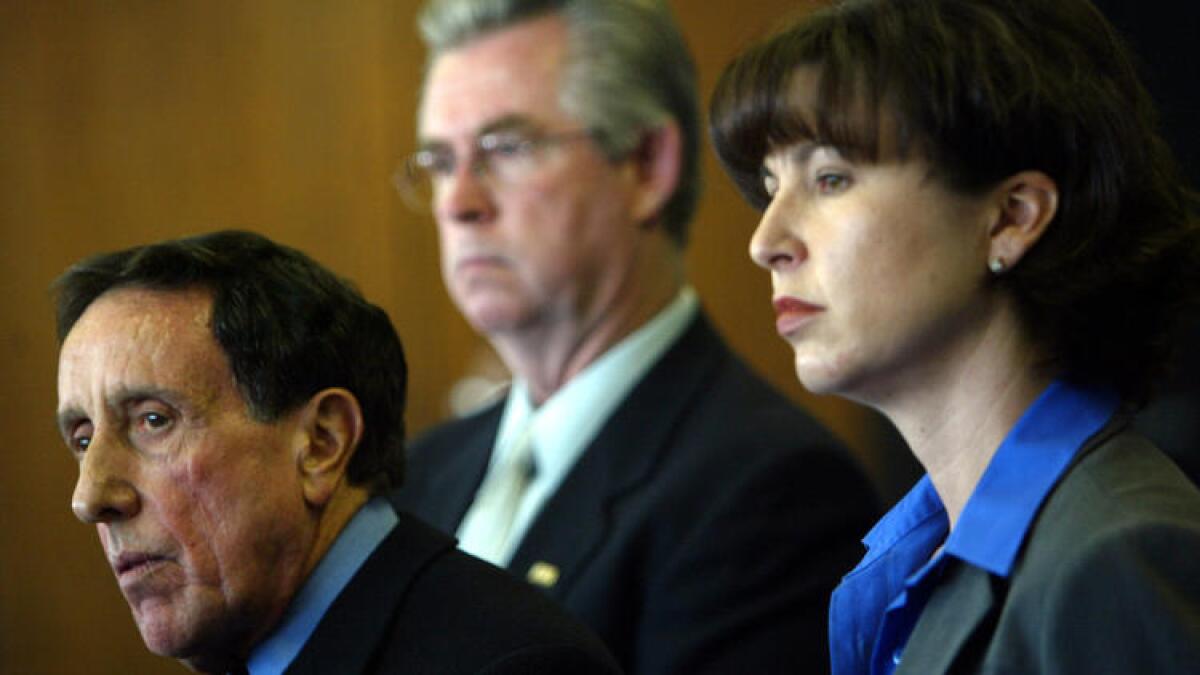
When the California State Senate convenes next month, Sen. Connie Leyva (D-Chino) says that she plans to introduce legislation to ban all registered sex offenders from school campuses without exception.
Levya said the proposal comes in response to increased concerns from parents in recent months, particularly in Fontana, where the school district approved a September 2016 policy that seeks to address the issue.
State laws keep registered sex offenders from living near schools. But those who have not been convicted of having sex with a minor under age 16 can visit or volunteer with groups or organizations that work with children if they give proper notice, are granted permission. They cannot work directly with children.
“The safety of students should always remain a top priority, so I look forward to introducing legislation in the near future that will tighten the loopholes that sex offenders could use to gain access to school campuses in California,” Levya said.
5:00 p.m.: This article was updated with information on state laws regarding sex offenders.
This article was originally published at 3:04 p.m.
Nancy Pelosi won’t be retiring any time soon
This news won’t shock people who have been paying attention to House Minority Leader Nancy Pelosi’s recent moves, but it is worth noting.
The San Francisco Democrat, just reelected to serve a 16th term in the House, has filed paperwork to run again in 2018.
The 76-year-old also is running again to be her party’s leader in the House.
Legislative analyst predicts almost $3 billion in spendable state budget surplus next year
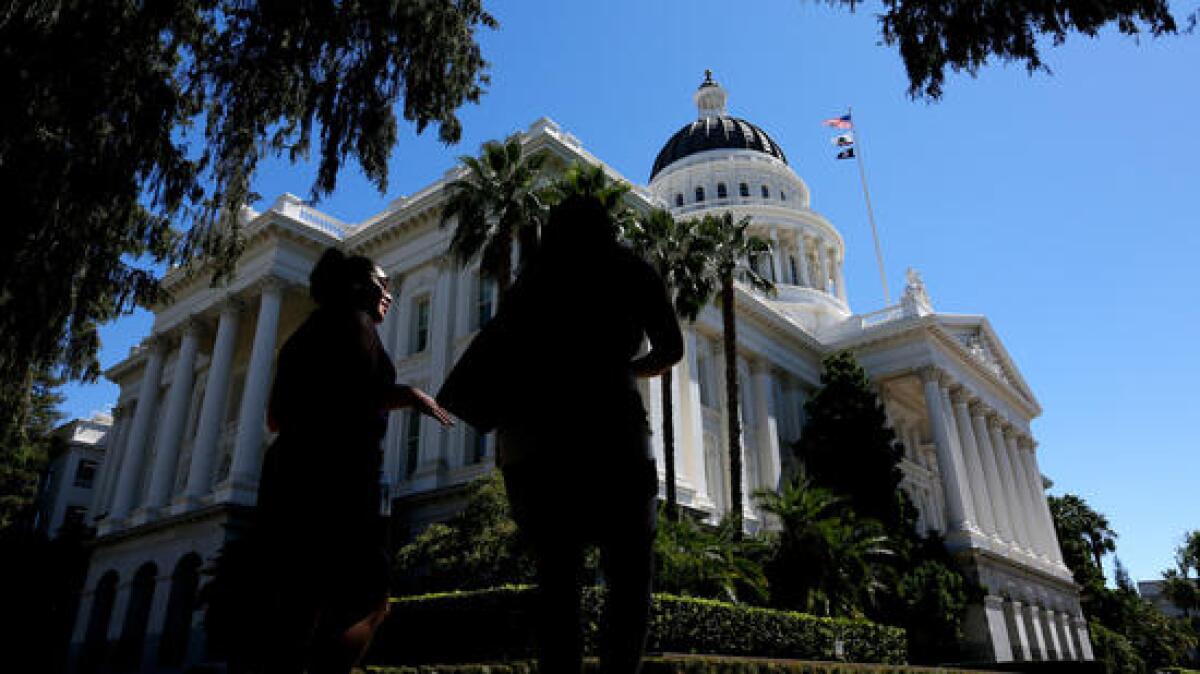
Gov. Jerry Brown and lawmakers could have $2.8 billion in discretionary dollars to spend in the state budget they will craft next year, under an analysis released Wednesday.
The annual fiscal forecast by the independent Legislative Analyst’s Office, while offering optimism about the state budget outlook in the near future, warns of considerable uncertainty after the summer of 2018.
Similar projections last year helped bolster Brown’s case for more prudence than some in the Legislature had wanted when it comes to additional spending.
In all, the analysis suggests that an economic slowdown might trigger short-term operating deficits but not a broader crisis, due to existing cash reserves.
“The state could weather a mild recession without cutting spending or raising taxes,” the report said.
A new fight seems likely over California’s long-term pension fund assumptions
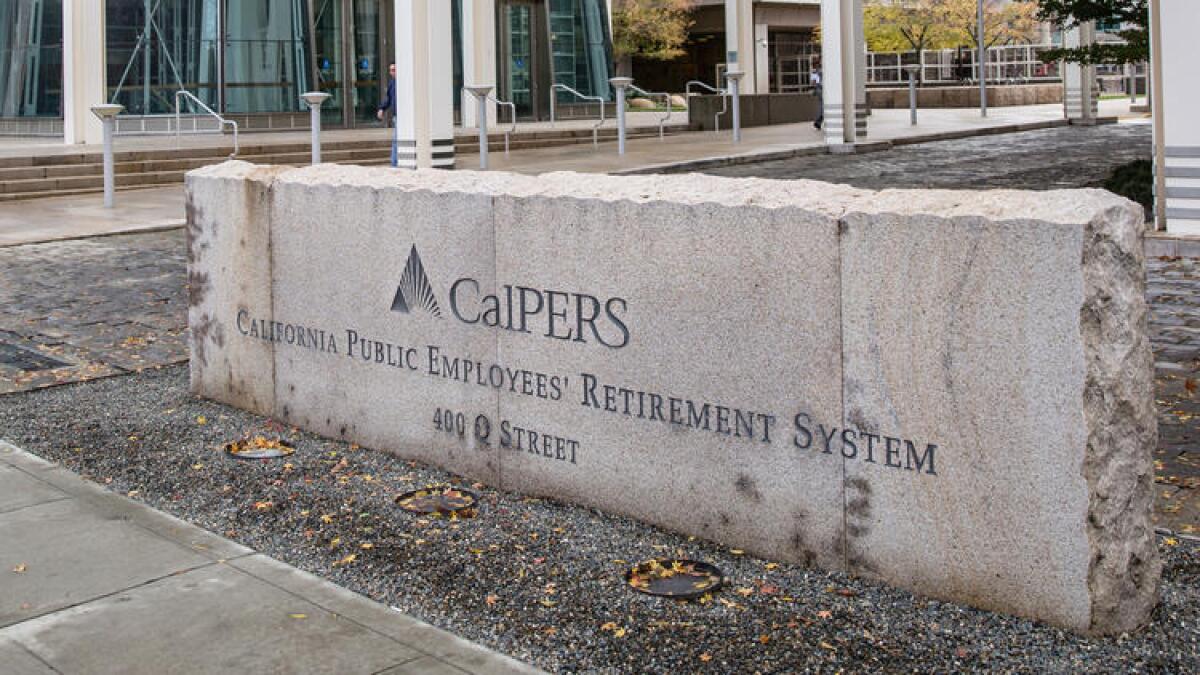
Directors of the nation’s largest pension fund could decide early next year whether to firmly ratchet down long-term investment predictions, an action that would come at a substantial cost to state and local governments.
Board members of the California Public Employees Retirement System discussed the issue at length on Tuesday and could cut the “discount rate,” the official projected rate of return on CalPERS investments, as soon as February.
“There’s a need to look at the funding of the system more closely than ever before, to ensure the sustainability of the fund over the long term,” said Cheryl Eason, chief financial officer of CalPERS, during the hearing.
The $299-billion pension fund uses an assumed annual rate of return on its investments of 7.5%. That assumption has been slightly lowered in recent years, and analysts have suggested it may still be too optimistic.
CalPERS’ own estimates show it doesn’t have enough assets to cover all of its future obligations to public sector employees. And the fund’s top investment officer said last week’s election results add an additional layer of uncertainty to its economic and stock market predictions.
The only solution, some believe, is to force local and state governments to increase annual payments from their operating budgets.
“We are going to have to potentially make some decisions that will not be comfortable,” CalPERS board member Bill Slaton said.
The debate over lowering the pension fund’s investment prediction began last year, with its leaders approving a gradual reduction and shift of costs to taxpayers. The current discussion, though, is whether the 2015 action was too timid.
CalPERS board members who come from the ranks of public employees balked Tuesday, suggesting there had not been enough time to let recent actions take effect.
“I’m a little confused at the panic and expediency that you guys are selling us right now,” said board member Theresa Taylor. “I think that we need to step back and breathe.”
An official revision of CalPERS’ investment assumptions would place significant pressure on government spending, with public employee pension obligations consuming a larger portion of taxpayer dollars. That could, in turn, squeeze other government programs.
Sen.-elect Kamala Harris meets the Capitol Hill press corps
California Sen. Dianne Feinstein preps for Supreme Court fight as top Democrat on Judiciary Committee
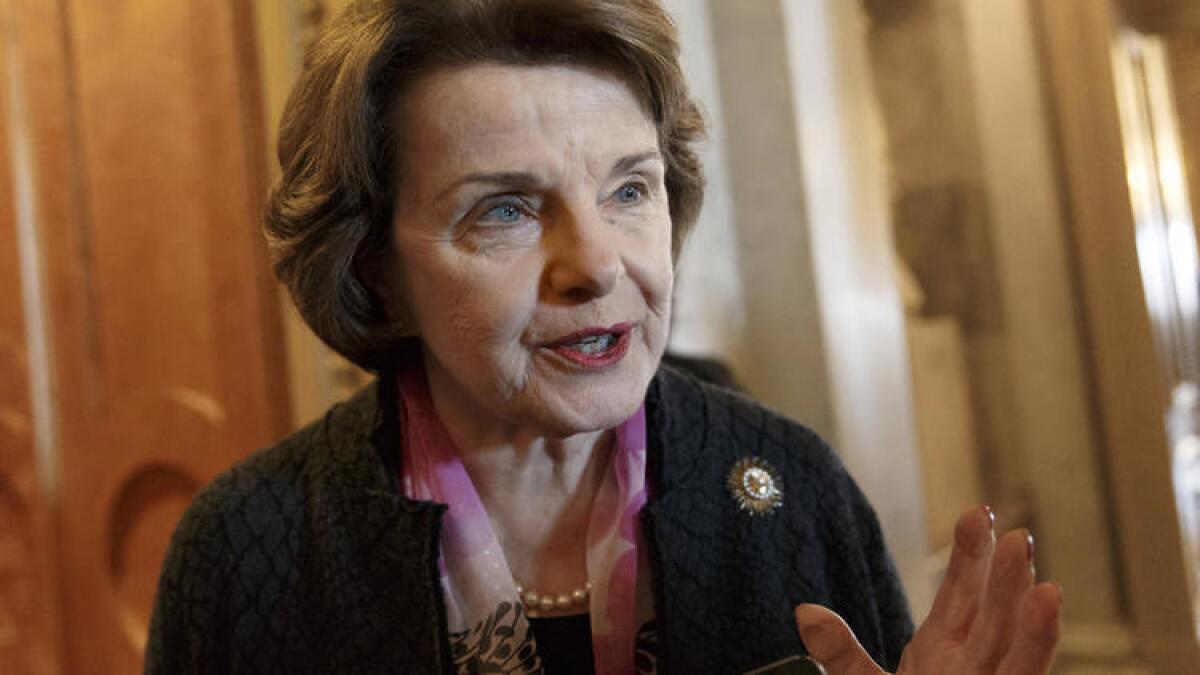
Sen. Dianne Feinstein (D-Calif.) will become the ranking Democrat on the Senate Judiciary Committee, which weighs attorney general nominees, as well as nominations to the Supreme Court and other courts, in January.
As the most powerful Democrat on the committee, Feinstein will play a major role in how President-elect Donald Trump’s Supreme Court nominees are treated and vetted.
“When President-elect Trump is willing to support responsible policies and nominees, I’ll hear him out, but this committee has a vital role to protect the Constitution and scrutinize policies, senior officials and judges very carefully, and that’s what we intend to do,” she said in a statement. “We simply won’t stand aside and watch the tremendous successes achieved over the past eight years be swept away or allow our nation’s most vulnerable populations to be targeted.”
Feinstein was a vocal critic of Republicans’ decision not to consider President Obama’s nominee to the high court, Merrick Garland, after the death of Justice Antonin Scalia.
In 1992, Feinstein became the first woman to serve on the Judiciary Committee, and she will be the first woman and the first Californian to serve as its highest ranking Democrat. She said that makes the position especially meaningful.
“It’s a special honor to be the first woman to become ranking member of this committee, not to mention the first Californian,” she said in a statement. “This committee, which touches the lives of so many Americans, will face many tough issues in the coming years, and I’ll do my level best to represent all Americans.”
The power reshuffling came after Senate Democrats picked their chamber leaders Wednesday. The committee’s current ranking Democrat, Sen. Patrick Leahy (D-Vt.), will become the ranking Democrat on the Senate Appropriations Committee. Sen. Mark Warner (D-Va.) will replace Feinstein as vice-chair of the Senate Select Intelligence Committee.
Democrat topples incumbent GOP legislator in close Assembly race
Election officials across California still face as many as 4 million uncounted ballots
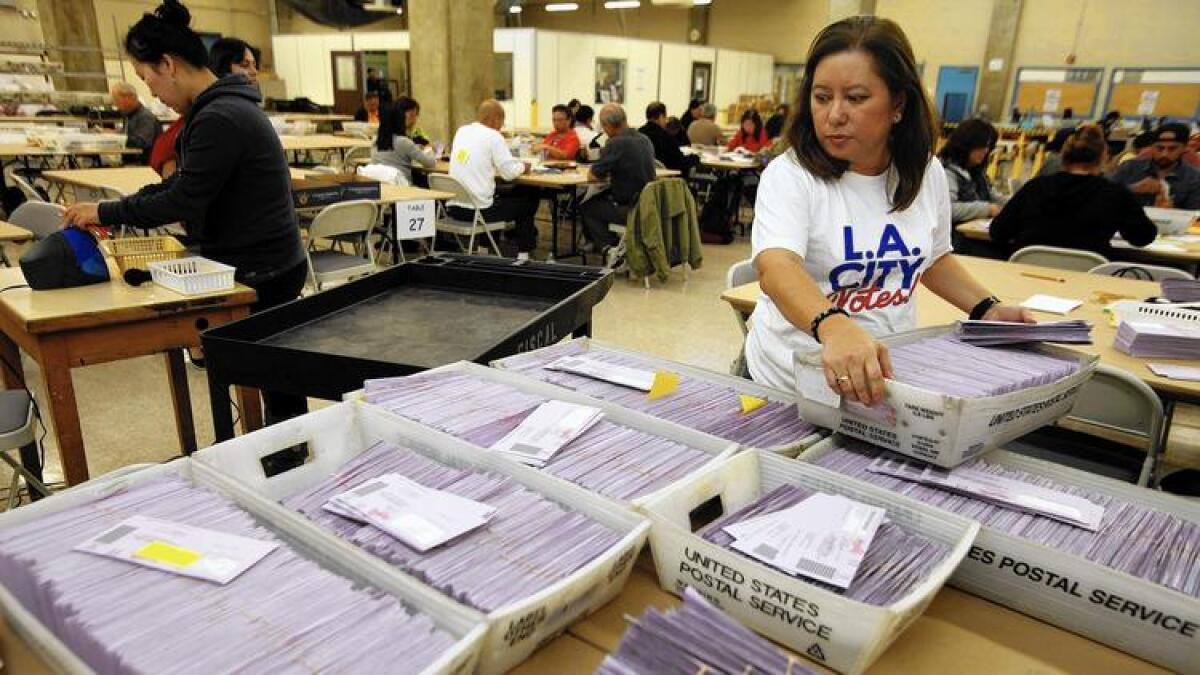
California election officials continue their efforts to review and count as many as 4 million ballots from the Nov. 8 election, a daunting process that has kept a few closely watched races in limbo for almost a week.
A report from the secretary of state’s office on Tuesday put the total number of unprocessed ballots at 4.1 million, down from the previous high of more than 4.5 million reported on Monday.
But a closer look at the report reveals that it’s not entirely clear how to estimate the total number of uncounted ballots. Most notably, several counties have not updated their official count since the middle of last week. That could mean hundreds of thousands of ballots have, in fact, been counted — but just not reported to state officials.
In San Diego County, election officials have reported that about 170,000 of the ballots on the state’s uncounted report have been counted. Los Angeles County also looks to have counted 200,000 ballots that aren’t noted in Tuesday’s report. Those changes would bring the statewide total of uncounted ballots closer to 4 million.
Two of last week’s 17 statewide propositions have remained too close to call: Proposition 53, which would require voters to approve future revenue bond proposals of $2 billion or larger; and Proposition 66, which seeks to expedite the legal appeals of prisoners sentenced to death.
In all, more than 10.5 million ballots have already been counted. By law, counties have up to 30 days to certify the final results to state election officials. In many cases, the uncounted ballots are those dropped off on election day or those arriving in the mail at the last minute.
State law now allows any ballot postmarked by election day and arriving no later than three days later to be counted. Because the third day after the election was a federal holiday — Veterans Day — state officials extended the deadline until the close of business on Monday.
California’s Rep. Kevin McCarthy will officially stay on as House majority leader
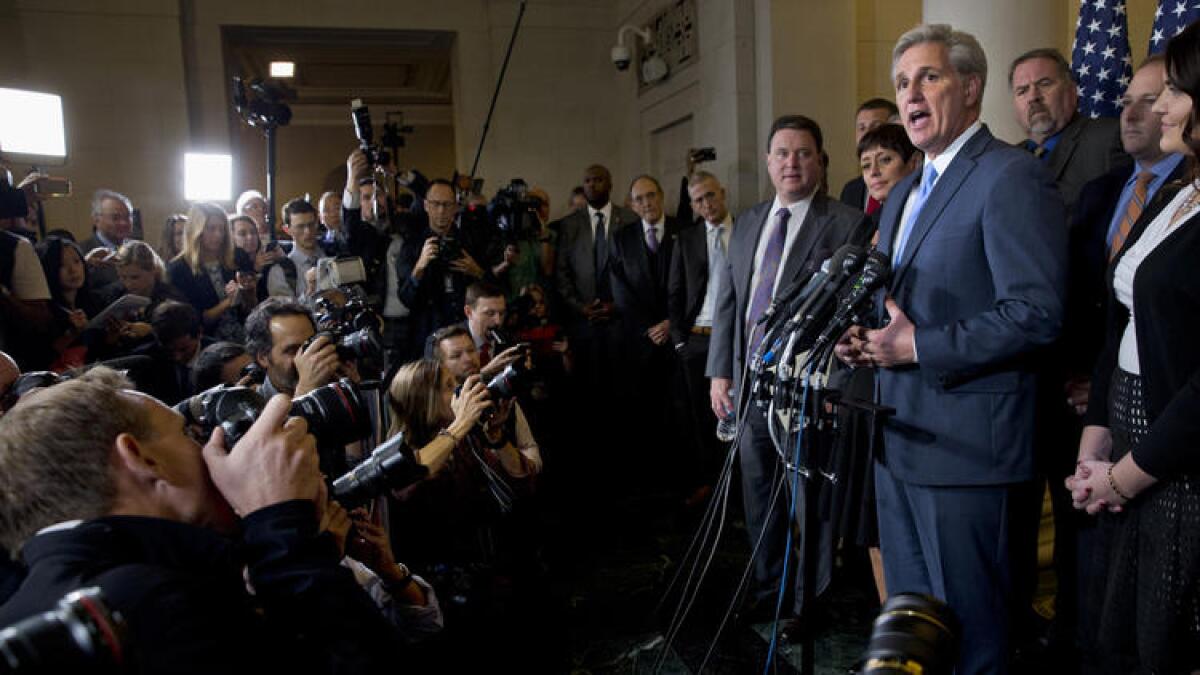
House Majority Leader Kevin McCarthy will keep his current job when the new Congress begins in January.
McCarthy was chosen by his House Republican colleagues Tuesday to remain as the chamber’s second-highest ranking leader in the new year.
The Bakersfield Republican was elected to Congress in 2006 and first picked for House leadership in 2009 at Republican’s chief deputy whip. He has been majority leader since 2014.
He was widely considered the heir apparent to former House Speaker John A. Boehner until he shocked the political world when he announced he would not run for the position when Boehner stepped down last year.
House Republicans also again nominated current House Speaker Paul D. Ryan (R-Wis.) as their choice for speaker of the 115th Congress. All members get to vote on the next speaker in January.
Democrats had also scheduled their leadership election for this week, but House Minority Leader Nancy Pelosi (D-San Francisco) moved it to Nov. 30 amid a possible challenge to her role.
California Legislative Women’s Caucus: We will fight Trump on abortion, healthcare
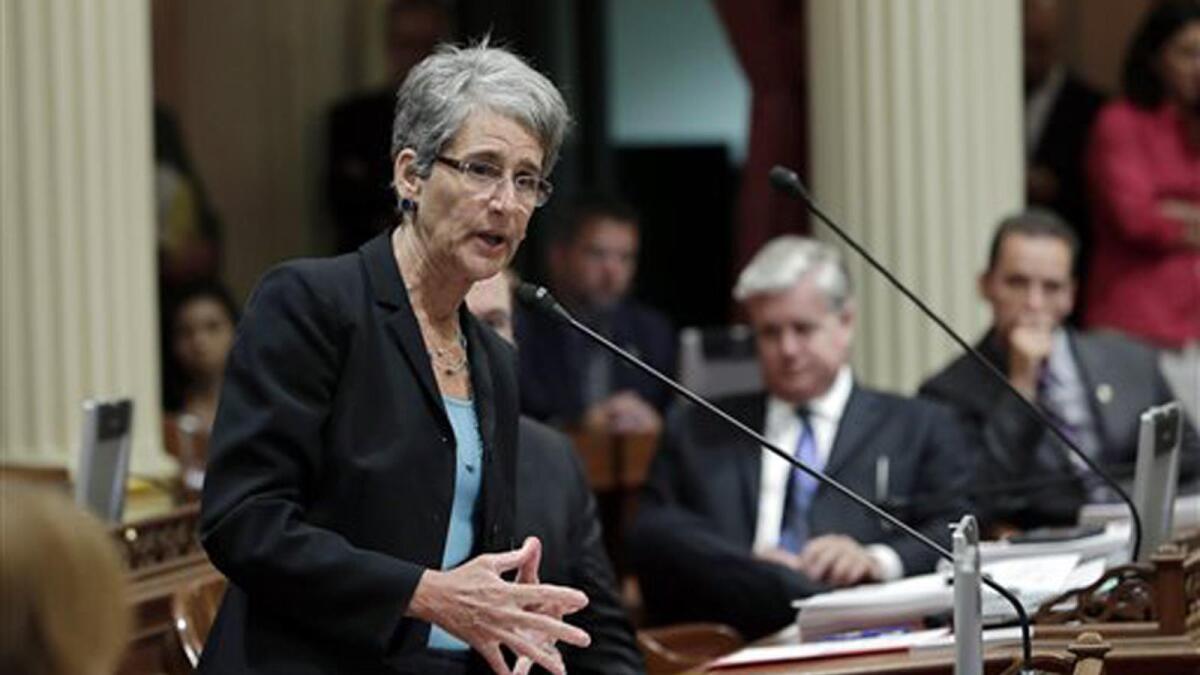
California’s women lawmakers are fighting against President-elect Donald Trump’s statements that he’d support overturning abortion rights.
“President-elect Trump’s statements and policies threaten to restrict our freedoms, cut off our healthcare, affect our economy and the pocketbooks of working families, and drag us back to an era of back alley abortions,” said state Sen. Hannah-Beth Jackson (D-Santa Barbara), chairwoman of the California Legislative Women’s Caucus, in statement from its Democratic members. “While our abortion rights will remain protected here in California due to the strength of our state laws and Constitution, we will remain vigilant in speaking out against any Supreme Court nominee who will overturn our hard-fought American freedoms and impact the economic security of working families.”
Trump campaigned on restricting abortion rights and told CBS News Sunday that he would appoint anti-abortion judges to the Supreme Court to overturn the Roe vs. Wade decision that prevented states from banning abortions, legalizing it throughout the nation. Trump indicated that once the decision was overturned, women would have to go to states without abortion bans to get one.
Assemblywoman Cristina Garcia (D-Bell Gardens), the women’s caucus vice chairwoman, said in the statement she is also worried about decreased federal funding for cancer screenings and birth control.
“We will vigorously uphold our long-held commitment to ensuring all women retain control over their bodies, healthcare and livelihoods,” Garcia said.
Assemblywoman deletes tweet that linked to a false story of anti-Trump violence
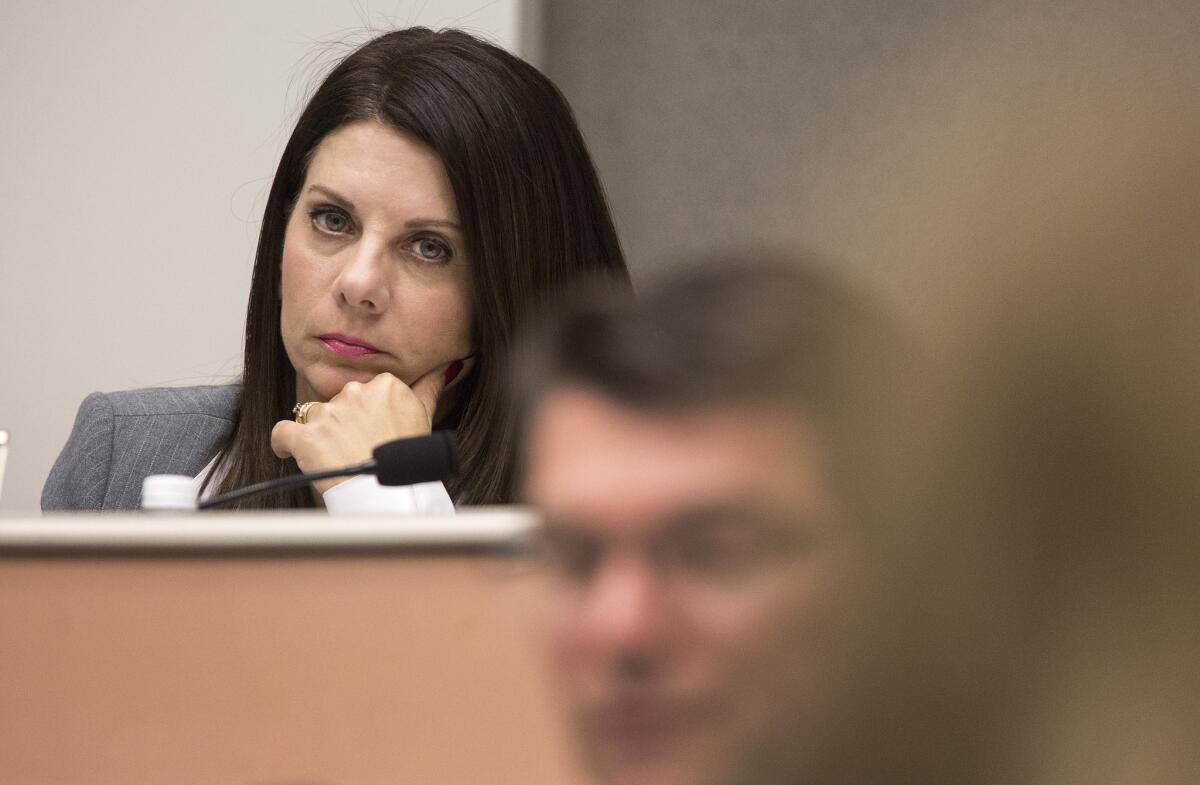
After tweeting a link to a false article about a homeless veteran being beaten to death, purportedly by protesters opposed to President-elect Donald Trump, a Southern California lawmaker has deleted the post and apologized.
The original tweet by Assemblywoman Melissa Melendez (R-Lake Elsinore) was posted Sunday night and reported by The Times on Monday. It linked to a story by a website called Christian Times Newspaper, alleging a homeless veteran was fatally beaten near Philadelphia by anti-Trump protesters.
The video in the story, however, was of an unrelated incident in 2015.
Melendez did not respond to requests for comment on Monday, but deleted the tweet on Tuesday with a brief apology.
California Rep. Karen Bass weighs in on how a Trump administration might affect black Americans
Rep. Karen Bass (D-Los Angeles) discussed how President-elect Donald Trump’s proposed policies might affect black Americans in a video posted to social media Tuesday.
“He clearly has spent little to no time in any inner-city community,” she says in the nearly 17-minute video, which was posted on Facebook and YouTube, as she ticks through several ideas Trump has put forward, including school vouchers, “stop and frisk” and increased police presence in certain communities.
“We will resist every step of the way Donald Trump moving our country backwards,” she said.
Bass spends some time at the beginning and end of the video reacting to Trump’s selection of Steve Bannon as his chief White House strategist. Critics note that Bannon, as editor of Breitbart News, has provided a platform for white nationalism.
“He’s an open anti-Semite!” Bass says in the video. “This is who he is bringing in to the Oval Office.”
State Senate leader Kevin de León heads to Morocco for conference on climate change
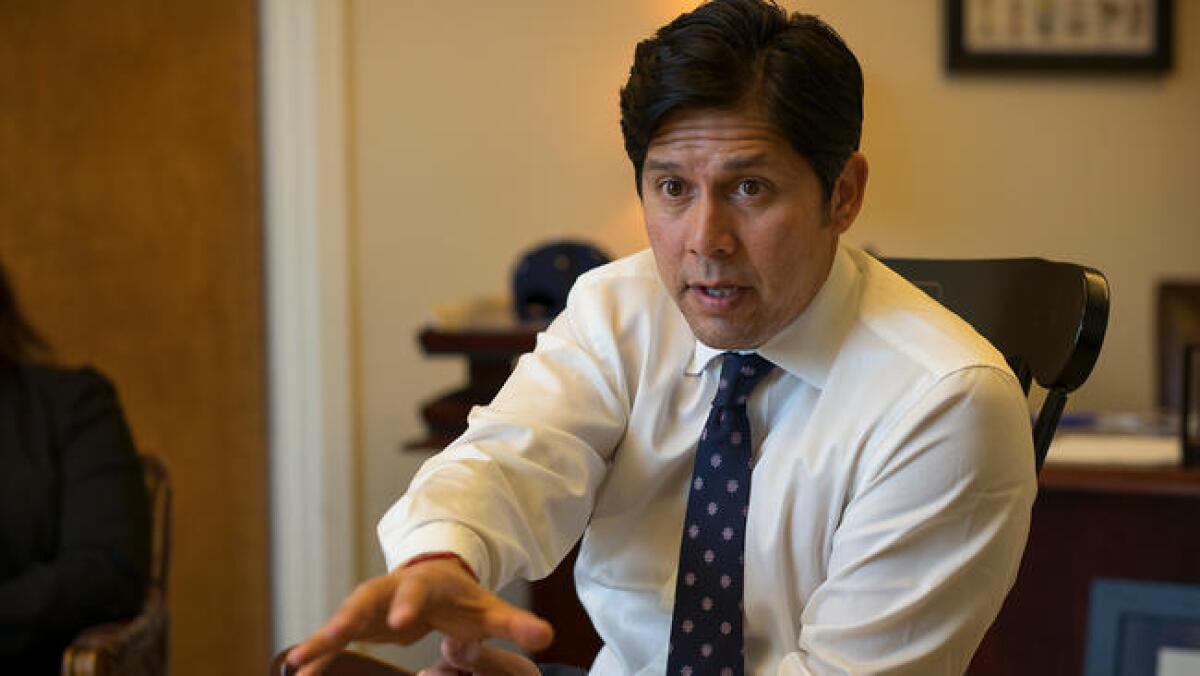
At a time when President-elect Donald Trump is threatening to roll back laws on climate change, state Senate leader Kevin de León (D-Los Angeles) on Tuesday led a delegation of California officials attending a conference in Morocco on global warming.
De León and seven other state officials are attending the United Nations 22nd Conference of Parties to discuss ways to move forward with a climate agreement reached in Paris last year. Also on the trip is Matt Rodriquez, secretary of the California Environmental Protection Agency, and other state administrators. No other elected state official is attending, according to Dana Coffman, a director of the Climate Registry, a nonprofit group that designs programs for reducing greenhouse gas emissions.
The registry is paying for the travel of De León and other Californians in cooperation with the Climate Action Reserve, a group that certifies projects that offset greenhouse gas emissions and advocates for solutions to climate change.
De León said the California delegation would work to convince officials of other governments that the state remains committed to pursuing efforts to reduce emissions.
“California leaders are committed to protecting and building upon our global leadership role in the fight against climate change,” De León said in a statement. “It would be extremely irresponsible and short-sighted to do otherwise. The world is counting on us more than ever and I look forward to reassuring our partners in other countries.”
Trump has questioned the conclusion reached by many scientists that human activity, including the burning of fossil fuels, has had significant, negative effects on the global environment.
The governor’s office said others in Morocco are Ken Alex, director of Governor’s Office of Planning and Research, David Hochschild, a member of the California Energy Commission, Alexa Kleysteuber, deputy secretary of California Environmental Protection Agency, Edie Chang, deputy executive officer for the California Air Resource Board, Emily Wimberger, chief economist for the California Air Resource Board, and Fan Dai, climate change adviser for the California Environmental Protection Agency.
Twenty-four other state lawmakers have taken fact-finding trips to China, Germany, the Czech Republic and Maui ahead of next month’s gaveling in of a new legislative session.
‘We are legitimate workers’: Erotic Service Providers Union asks Gov. Jerry Brown to decriminalize prostitution
Four members of the Erotic Service Providers Union are asking to meet with Gov. Jerry Brown to deliver a petition with 24,000 signatures in support of decriminalizing sex work.
The governor signed more than half a dozen bills this past legislative session including measures to decriminalize prostitution for minors and increase court protections for children and young adults swept into the sex trade. But sex workers said efforts to combat human trafficking do not help and can hurt everyday workers making a living in the business.
“Our population live in California, and we deserve to be represented, and we want our voices heard,” said Maxine Doogan, founder of the union. “We know that there are lots of pieces of legislation that are proposed and passed on our behalf every year calling us victims or criminals, and in fact, we are legitimate workers.”
Just four union members stood on the north steps of the Capitol on Tuesday to make their appeal. They said sex workers face discrimination and law enforcement repercussions when attending rallies.
Rep. Judy Chu asks President Obama to protect the information of ‘Dreamers’ before Trump takes office
With President-elect Donald Trump vowing to deport thousands of people in the country illegally, Rep. Judy Chu on Tuesday urged the Obama administration to protect the names of “Dreamers,” people brought to the country illegally as children who applied for temporary status in the United States.
Trump is expected to unwind the Deferred Action for Childhood Arrivals program created by President Obama that gave temporary legal status to Dreamers.
Of the 742,000 people across the country protected under DACA, about one in three are estimated to live in California and state officials are already gearing up for a fight over immigration with the Trump administration.
“These children and families provided extensive amounts of sensitive information to their government, including fingerprints and relatives’ home addresses, with the understanding that it would not be used against them. We promised them security,” Chu said in a statement. “Now they are facing a nightmare. When we asked immigrants to come out of the shadows, we never imagined the election of a candidate who ran on a policy of mass deportation.”
Chu’s staff said she’s talking with the Obama administration and federal agencies to determine what legal right to privacy those who applied for the program might have, and what might be done to make it more difficult to use the information to identify people in the country illegally.
California Sen. Barbara Boxer files long shot bill to scrap the Electoral College system
Retiring Sen. Barbara Boxer (D-Calif.) filed legislation Tuesday to abolish the Electoral College in light of Democratic nominee Hillary Clinton winning the popular vote but still losing the election.
Such legislation makes a statement after an election that shocked Democrats, but is unlikely to gain traction with Republicans holding control of both chambers of Congress in a lame duck session.
Her bill calls for an amendment to the Constitution that would end the Electoral College system. Should such a thing pass, the amendment would only take effect if ratified by three-fourths of the states within seven years after its passage in the U.S. Congress.
Clinton leads President-elect Donald Trump by nearly 800,000 votes nationally with a final count still pending, but Trump won the most electors in the electoral college system that is how the country actually picks its president.
Boxer was a vocal advocate for Clinton throughout the campaign and had said that electing the first female president was on her to-do list before leaving the Senate in January.
This is just the fourth time in U.S. history that a nominee has won the popular vote but lost the Electoral College and thus the presidency. The most recent was Al Gore’s Electoral College loss to George W. Bush in 2000.
“In my lifetime, I have seen two elections where the winner of the general election did not win the popular vote,” Boxer said in a statement. “The Electoral College is an outdated, undemocratic system that does not reflect our modern society, and it needs to change immediately. Every American should be guaranteed that their vote counts.”
Boxer has co-sponsored legislation to repeal the Electoral College before, none of the bills have been considered.
Amid rumbles of discontent, House Democrats push back leadership election as Pelosi faces possible challenge

With Democrats still reeling from last week’s loss, House Democratic leader Nancy Pelosi agreed Tuesday to a request to move the Democratic Caucus’ leadership election until after Thanksgiving.
Pelosi, a Californian who has led House Democrats for more than 16 years, including two terms as the first female House speaker, is potentially facing a challenge from Ohio Rep. Tim Ryan, who told Politico he is considering a bid.
Democrats won only six new seats Nov. 8, after months of predictions that ranged from a large Democratic win to a significant narrowing of the Republicans’ majority in the House. Coupled with losing the presidency because some traditionally blue Rust Belt states turned red, some on Capitol Hill are saying privately that it’s time for new leadership that hails from the center of the country.
The date of the leadership election has been moved back and forth a few times. At one point, uncontested races were scheduled for Thursday, while the contested races — such as the Democratic Caucus vice chairman race between two California members — would have been held after next week’s Thanksgiving break.
With Pelosi’s announcement, all of the Democrats’ leadership elections will be held Nov. 30.
In their first meeting since the election, Pelosi (D-San Francisco) told fellow Democrats on Tuesday that she doesn’t have a preference for when the election is held, but that the caucus needs to present a united front to Republicans, and soon.
“I do believe that time is important on this subject — for us to go to the table fully empowered to do what we need to do. From my standpoint, I don’t care when the election is. I do care that we have the strongest possible leadership at the table, whoever that may be,” she said, according to an aide in the room.
House Republicans’ leadership election is later Tuesday, and another Californian, House Majority Leader Kevin McCarthy (R-Bakersfield), is expected to keep his position. McCarthy took a dig at Pelosi’s potential contested election on Monday, saying that as long as she is leader, Republicans will stay in power.
2:55 p.m. This post was updated to reflect that the vice chair candidates are not both from Southern California.
Assemblywoman tweets link to fake ‘news story’ about anti-Trump protesters
It was a late-night tweet written by an outspoken Republican assemblywoman that expressed outrage over an online report of protesters, opposed to President-elect Donald Trump, fatally wounding a homeless veteran.
It also happened to be a report that was a hoax.
Lake Elsinore Assemblywoman Melissa Melendez’s tweet linked to a report by an online site called Christian Times Newspaper about what was purported to be a Friday night encounter between anti-Trump protesters and a homeless veteran in Philadelphia.
But the video linked to the story is of an incident from April 2015 that was unrelated to politics, and chronicled at the time by the Philadelphia Inquirer. The website from which Melendez found the report also falsely claimed that Hillary Clinton had filed for divorce. And the site includes a post dated Nov. 5 that suggests “sources” have said the Democratic presidential nominee and her husband, former President Bill Clinton, are “actively involved in child sex trafficking.”
A commenter on Twitter, someone who had seen Melendez’s tweet, called the protesters “animals.” The assemblywoman from Lake Elsinore, elected last week to her third two-year term, wrote back “exactly.”
Later, after it was pointed out to her that the story was false, Melendez dismissed the questions as “liberal reporters” objecting to “a news story I shared.”
Melendez didn’t immediately respond to requests for comment on Monday.
In 2015, she faced criticism for a tweet that focused on the killing of an American hostage by members of the Islamic State, a tweet that included the phrase “stand up against Islam.”
More than 4.5 million ballots still need to be sorted and tallied, state officials report
Analysts caution against blaming so-called ‘Trump effect’ for death penalty repeal’s defeat
Proposition 62, which would have repealed the death penalty in California, drew its strongest opposition among Republicans and those who voted for Donald Trump for president, according to a USC Dornsife/Los Angeles Times post-election poll.
But analysts said the narrow defeat of the initiative at the polls last week came in as expected given a sharp divide over capital punishment nationwide. They also cautioned against attributing the loss to the so-called “Trump effect,” a wave of mostly white, male voters from rural areas energized by Trump’s presidential run.
Proposition 62, which would have replaced capital punishment for murder with life in prison without parole, went down with 53.9% of people in opposition and 46.1% in support.
People who voted for Democratic presidential nominee Hillary Clinton supported repealing the death penalty by a 61% to 39% margin, while Trump’s voters opposed the proposition by an 83% to 17% margin, according to the poll conducted by SurveyMonkey. Meanwhile, 17% of Republicans supported Proposition 62 compared with 62% of Democrats and 47% of no-party voters.
But there were large splits among male and female voters, voters from different age brackets and those in different geographic areas. Opposition to the initiative was highest in the Orange County/San Diego area, where 65% were opposed, and in the Central Valley, where 64% were opposed.
The proposition drew its greatest support among black voters, 59% of whom were in favor of the repeal, as compared with 45% of white voters and 48% of Hispanic voters.
Rep. Knight says he voted for Trump after all: ‘I have made no bones about it. I have voted for Donald Trump’
As election day approached, Rep. Steve Knight (R-Lancaster) did his best to avoid talking about Donald Trump.
Knight said he wouldn’t support either Trump or Hillary Clinton after comments Trump made in 2005 about touching women without their consent came to light.
When Knight was asked in a debate hosted by the Palmdale Chamber of Commerce by a Los Angeles Times journalist who his choice for president was, he dodged the question.
“It’s probably the most difficult race in all of our lives, but in the end we will have to make a choice,” Knight said in that October forum. “I’ve come out just recently and said I don’t support either one. But I will be voting.”
The campaign of his rival, Bryan Caforio, jumped on the remark as proof Knight would vote for Trump, even though that’s not what he said. Turns out they were right.
Knight stopped playing coy on election night — sort of.
As the results came in Tuesday, Knight told a reporter with the College of the Canyons’ online news website that he voted for Trump.
“Now I have made no bones about it. I have voted for Donald Trump for president, and I have said that many times,” he said at the 1:46:22 mark in the video.
He explained: “When I said something like I wasn’t supporting, it didn’t mean I wasn’t voting for him or I wasn’t, you know, there it just meant I’m running my race and I’ve got to go out and win my race and that’s what is important to make sure we hold the House.”
Knight won reelection, defeating Caforio by 8 points.
Kamala Harris won the Latino vote in California’s U.S. Senate race, poll shows
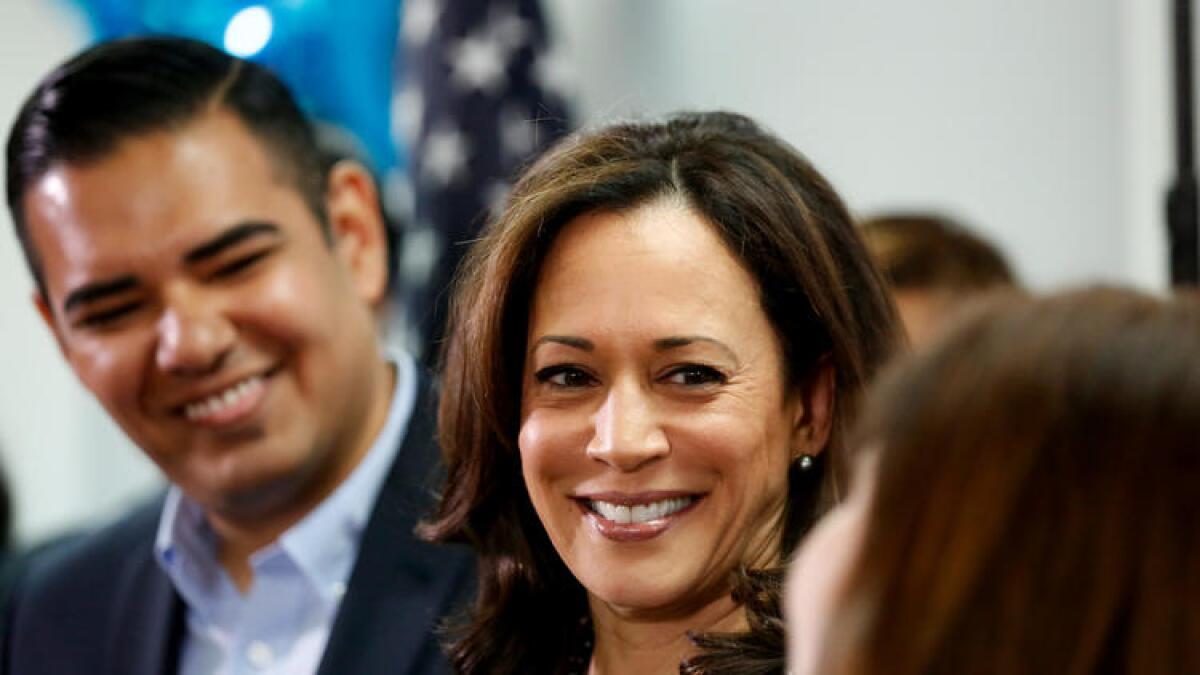
California Atty. Gen. Kamala Harris dominated Tuesday’s U.S. Senate election, beating Rep. Loretta Sanchez (D-Orange) among all major age groups, education levels and ethnicities — including among Latino voters, according to a USC Dornsife/Los Angeles Times post-election poll.
According to the survey of Californians who cast ballots in Tuesday’s election, 48% of Latino voters backed Harris compared with 40% who supported Sanchez. Sanchez, who has served in Congress for two decades, was relying on Latinos to be one of her major bases of support.
Harris also won in the Central Valley and the Inland Empire, areas where she was considered vulnerable.
The survey also found that 35% of Republicans and 15% of independents said they did not vote in the U.S. Senate race. During the final months of the campaign, Sanchez was trying to appeal to conservatives and moderates, stressing her expertise on national defense.
Though some ballots are still to be counted, the most up-to-date election returns from the California Secretary of State show that Harris beat Sanchez by a margin to 63% to 37%.
Approximately 720,000 fewer Californians voted in the Senate race than the presidential race, preliminary state figures show.
House Majority Leader Kevin McCarthy on Nancy Pelosi: ‘As long as she’s leader we keep the majority’
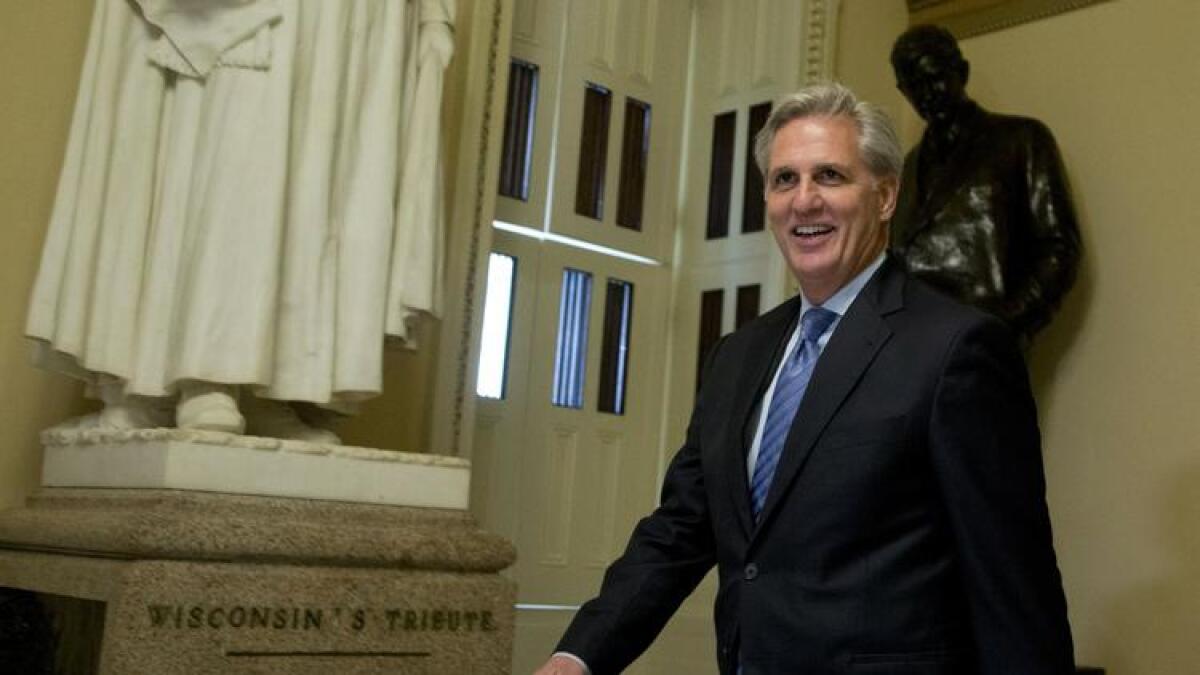
Speaking with reporters Monday, House Majority Leader Kevin McCarthy said House Minority Leader Nancy Pelosi (D-San Francisco) should stay in leadership because it benefits Republicans.
“I kind of like Pelosi staying around. As long as she’s there I think we stay in the majority,” McCarthy (R-Bakersfield) said. “If I’m being selfish, I truly believe as long as she’s leader we keep the majority.”
Pelosi has held a House Democrat leadership position for 16 years, including two terms as the first female speaker of the House, making her a rallying point for both Democrats and Republicans. Speculation about how long she plans to stay in Congress has made for a steady stream of gossip for years, especially with a bevy of younger House members waiting for a turn.
McCarthy joined House Republican leadership in 2009 as chief deputy whip. He briefly considered a bid to become House speaker in 2015.
Both McCarthy and Pelosi are expected to be reelected to their leadership positions by House colleagues this week, though there is talk on Capitol Hill that some Democrats want to delay leadership elections in order to give other candidates a chance to organize after Donald Trump’s presidential win.
McCarthy also said skeptics of Stephen K. Bannon, a controversial White House senior staff pick, should give him a chance. Bannon is controversial because he ran Breitbart News, a platform for a loose collection of extremists that includes openly racist or anti-Semitic activists.
Pelosi’s spokesman responded to McCarthy’s comments saying he was trying to distract for questions about Bannon.
“While we always appreciate Congressman McCarthy’s advice, his comments today were merely an effort to change the subject in an uncomfortable exchange with reporters about why Donald Trump has hired a white nationalist for a senior role in the White House,” spokesman Drew Hammil said.
9:23 a.m. Nov. 15: This post was updated with the correct number of terms Pelosi served as Speaker.
11:30 a.m.: This post was updated at with response from Pelosi’s office.
This post was originally published at 10:01 a.m. Nov. 14.
Times writer Michael A. Memoli contributed to this report.
Anti-Trump strategy in California races was ‘kind of a dud’
In the final weeks of the election, Democratic leaders seemed to double-down on their strategy of trying to link Donald Trump to Republican legislative candidates up and down the state.
They placed Trump’s face alongside Republican candidates like Dante Acosta and Assemblyman Marc Steinorth (R-Rancho Cucamonga) on mailers, television ads and lawn signs.
Did it pan out? Tuesday’s election results appear to say no.
So far, though it appears Democrats will pick up three seats in the Assembly, only three of the seven seats where the anti-Trump strategy was used will likely go to Democrats, and at closer margins than pollsters had expected.
“The overall impact was kind of a dud,” said Andrew Acosta, a consultant for Democrat Dawn Ortiz-Legg, who compared her Republican opponent Jordan Cunningham to Trump in mailers and television ads, emphasizing his stances on women’s reproductive issues.
Ortiz-Legg lost by 10 points. “We rolled with the Trump hit and it obviously didn’t have the impact we were hoping it would.”
State Senate leader to immigrants after Trump’s deportation promise: California ‘stands squarely behind you’
After President-elect Donald Trump, in an interview on CBS’ “60 Minutes,” promised to deport 2 million to 3 million immigrants in the country illegally who “have criminal records,” the leader of California’s state Senate called for Trump to walk back his statement.
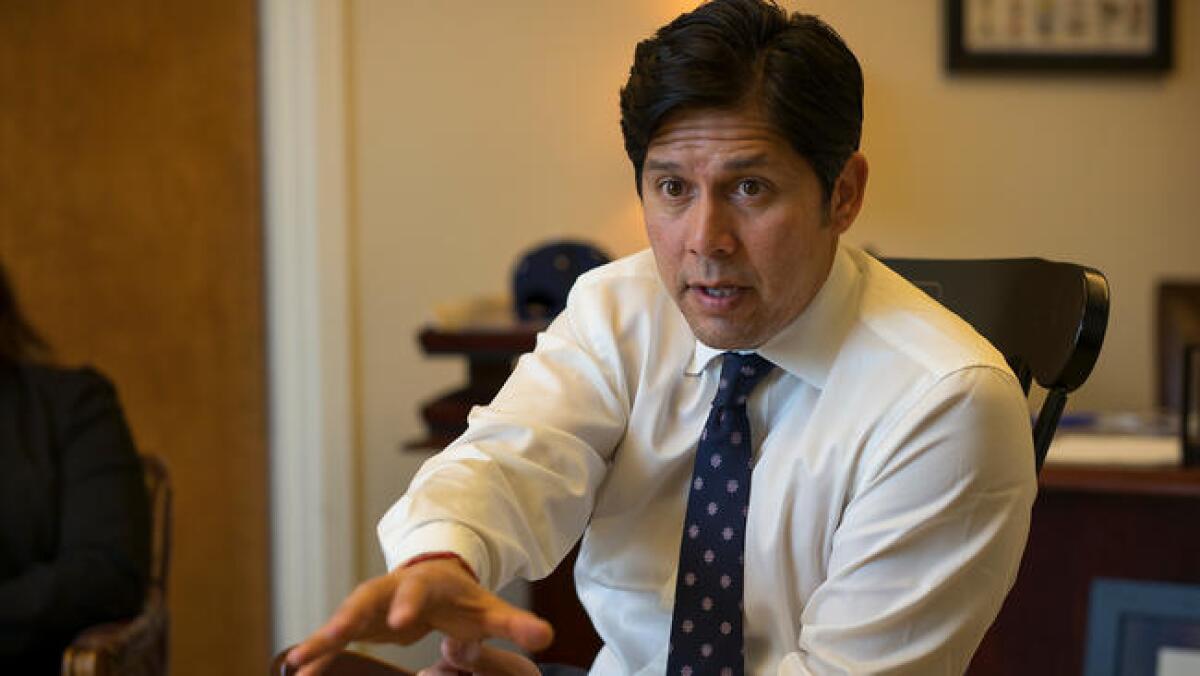
In a Sunday statement, Senate President Pro Tem Kevin de León (D-Los Angeles) promised to defend, if needed, the rights of immigrants here illegally.
Trump’s estimate of how many immigrants have criminal records far exceeds what others have found. About 820,000 people in the U.S. illegally have criminal convictions, according to the nonpartisan Migration Policy Institute, a group that is funded by Fortune 500 companies, major foundations and the U.S. and more than a dozen foreign governments.
In his statement, De León said “it is erroneous and profoundly irresponsible to suggest that up to three million undocumented immigrants living in America are dangerous criminals.”
“I also want to assure the millions of people who are here pursuing and contributing to the California Dream, but lack documentation, that the State of California stands squarely behind you, “ he wrote. “State leaders will defend your due process rights and aggressively avail ourselves of any and all tools to prevent an unconscionable over-reach by a Trump administration in California.”
It was the second statement De León released since the election indicating that California, which Hillary Clinton won by 28 percentage points, intends to forge a different path than the Trump administration.
Here’s more on how California appears to be on a collision course with Trump’s administration over immigration.
Times staffer Amy Fiscus contributed to this post.
After her failed U.S. Senate bid, Loretta Sanchez’s next move isn’t quite clear
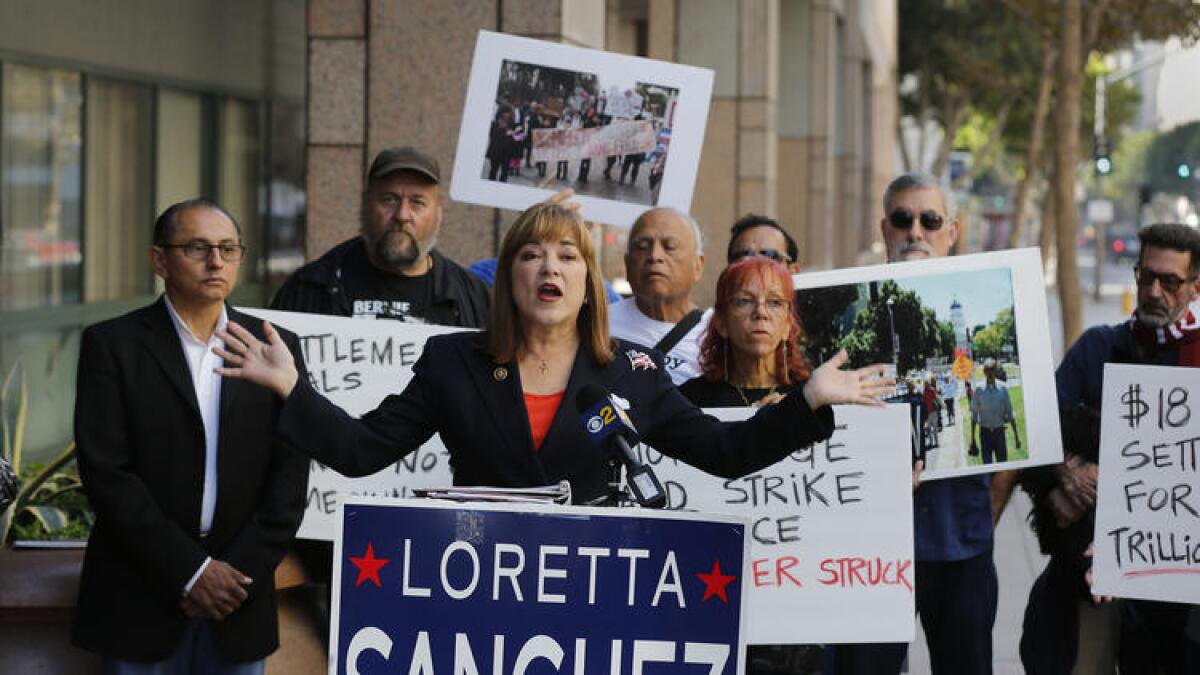
Rep. Loretta Sanchez is taking some time to consider what might be next after losing the U.S. Senate race.
California political experts weighed in on what other political offices could be open to her and what she might have to do to win in California again.
California Rep. Ted Lieu becomes ACLU donor in ‘resistance’ to Trump
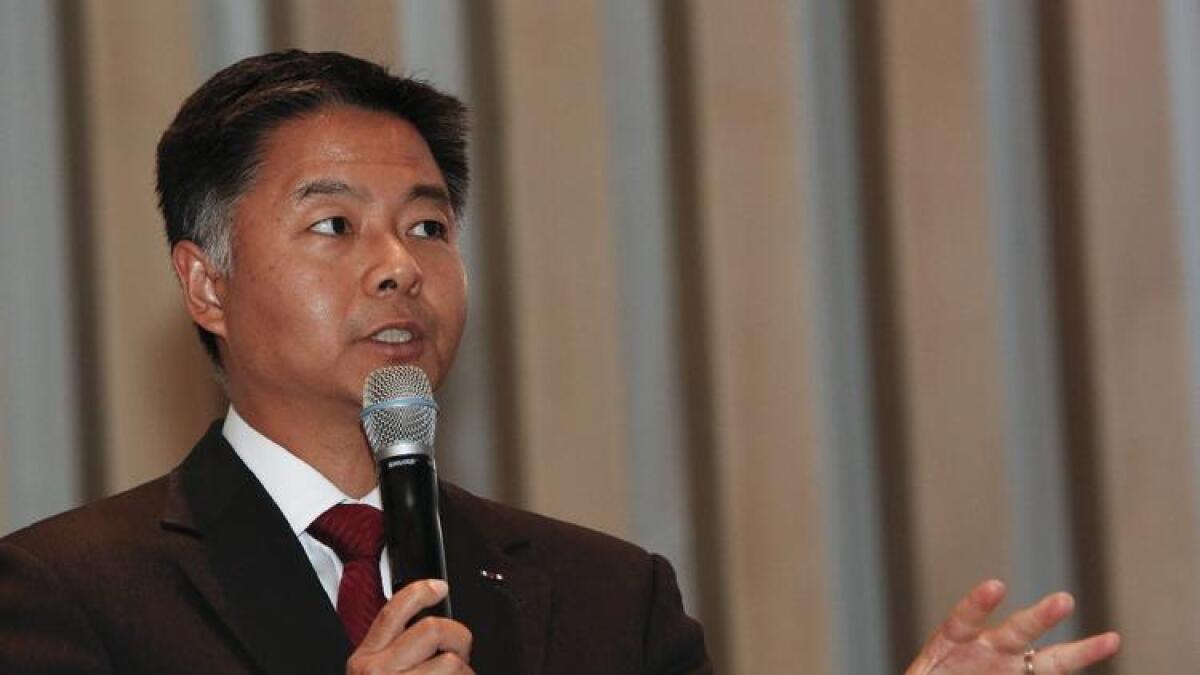
Rep. Ted Lieu (D-Torrance) said late Sunday that he will be a monthly donor to the American Civil Liberties Union to combat any unconstitutional actions President-elect Donald Trump may take after he is sworn in.
In a tweet using an expletive, Lieu said he’s going to begin donating to the ACLU “because the resistance to any unconstitutional crazy ... from President Trump starts now.”
Lieu has a law degree from Georgetown University, is a colonel in the Air Force Reserve and was just elected to serve a second term in Congress.
Marijuana legalization measure drew strongest support from young voters, Clinton backers, poll finds

The initiative that legalized recreational use of marijuana in California found its strongest support among those who voted for Hillary Clinton for president, African Americans and voters ages 18 to 29, according to a USC Dornsife/Los Angeles Times post-election poll.
Proposition 64 passed with 56% of the overall vote, but was supported by 68% of Clinton supporters and Democratic voters while it was opposed by 59% of those who voted for Republican presidential candidate Donald Trump, according to the poll conducted by SurveyMonkey.
A breakdown of the vote by race found the ballot measure drew support from 64% of African American voters, 58% of whites and 56% of Latino voters.
Though marijuana legalization was supported by 66% of voters ages 18 to 29, backing from those ages 50 to 64 was weaker at 49%.
“It can’t be denied that, like marriage equality and criminal justice reform, younger voters are more likely to be on board but that political pendulum is also swinging very fast in our direction and it’s changing the hearts and minds of every age group,” said Jason Kinney, a spokesman for the Proposition 64 campaign.
Northern California congressman shocked by Confederate flags at Veterans Day parade
Northern California Rep. Jared Huffman (D-San Rafael), was riding in a local Veterans Day parade on Friday when he spotted several young men with Confederate-related flags.
“More ugliness is coming,” he tweeted, along with a couple pictures of the people holding the flags. Huffman was elected this week to his third term representing California’s 2nd District.
He told the Santa Rosa Press Democrat he was holding an American flag in his hand, turned to the men and shouted, “This is our flag!”
He later related the incident to the election of President-elect Donald Trump and the reaction that has followed.
“This is not an isolated thing,” he told the Press Democrat. “We need to prepare for more of this because the Trump campaign has legitimized and given public space to some shadowy groups that used to hide from public view.”
California Politics Podcast: The good, the bad, the shocking from the election
California’s role in the national political discussion could be changing: the place where top leaders are the “resistance” to President-elect Donald Trump.
On this week’s California Politics Podcast, we take a full look at Tuesday’s election results. The presidential surprise outcome has important implications for the state but so too do the choices voters made on the 17 ballot propositions.
We also discuss the outcome in the U.S. Senate race, as well as our takeaways from congressional and legislative races across California.
I’m joined by Marisa Lagos of KQED News.
Leading California Democrat says the state needs a ‘legal wall’ against a Trump administration

California needs protection from the “dystopian worldview” of President-elect Donald Trump, a leader of the state’s Democratic Party said Friday.
Eric Bauman, chairman of the Los Angeles County Democratic Party, called on Gov. Jerry Brown and legislative leaders to lead an effort on statutes and constitutional amendments to “safeguard” the state from any effort by Trump to roll back existing federal policies on healthcare, immigration and climate change.
“Several months ago, I facetiously called on Governor Brown to build a wall around California to keep Donald Trump out,” Bauman wrote in a statement on Friday night. “Today, on a more serious note, I sincerely call on Governor Brown and our Legislature to build a metaphorical legal wall to keep our residents safe from the grim and cynical vision that Donald Trump has laid out for America.”
The statements by Bauman, who is running to become chairman of the California Democratic Party next year, follow concerns raised by legislative leaders shortly after Tuesday’s surprise Trump victory. On Thursday, Brown issued a more cautious statement that nonetheless promised to fight any effort to limit California’s climate change policies.
Bauman offered a more pointed reaction.
“The election of Donald Trump ushers in one of darkest eras in our nation’s modern political history,” he wrote. “Many across the state and country are frightened, and they are right to feel that way.”
California Rep. Devin Nunes named to Trump’s transition team
California’s Rep. Devin Nunes will be a member of the executive committee leading President-elect Donald Trump’s Presidential Transition Team, according to the campaign.
The seven-term Republican from Tulare is chairman of the House Select Intelligence Committee.
Nunes and the 15 others on the team, including Trump’s children and Republican National Committee Chairman Reince Priebus, will help make hiring decisions ahead of Trump’s January swearing-in.
Vice President-elect Mike Pence was named the new head of the transition team Friday.
Santa Monica native Stephen Miller is also listed as national policy director for the transition team.
Unlike possible Defense secretary pick Rep. Duncan Hunter, who was an early and vocal backer of Trump, Nunes stayed neutral during the primary and has said only that he supported the nominee of his party.
San Jose’s Madison Nguyen concedes to Councilman Ash Kalra in tight Assembly race
Madison Nguyen has conceded to fellow Democrat Ash Kalra in their close race for California’s 27th Assembly District.
Nguyen, a former San Jose City councilwoman, sent a text message to Kalra this morning congratulating him and conceding the race, consultants for both candidates confirmed.
The contest is one of a handful of legislative districts that are still too close to call. As of Friday, Kalra was leading Nguyen by about 5 percentage points, around 3,800 votes.
The battle between the two Democrats to replace outgoing Assemblywoman Nora Campos (D-San Jose) was one of the most expensive and closely watched.
Business groups seeking to elect friendly members to the state Legislature had hoped Nguyen would join the ranks of business-aligned moderate Democrats if elected.
Independent expenditure committees backed by real estate interests and charter school advocates spent more than $2.8 million to support Nguyen in the general election alone, while labor groups spent more than $2 million to boost Kalra.
Total independent expenditures in this race exceeded $7.5 million for the year.
Challengers in two close congressional races head to freshman orientation
California’s Rep. Duncan Hunter among names floated for Trump Cabinet
Rep. Duncan Hunter’s name is being floated as a possibility to serve as President-elect Donald Trump’s secretary of Defense.
Along with other prospects for the Defense secretary’s job, the San Diego-area Republican’s name appears on lists of potential Cabinet members from Politico and Buzzfeed News.
Hunter’s chief of staff, Joe Kasper, did not respond to questions Friday.
Others on the list include Stephen Hadley, who served in a national security post for President George W. Bush; Rep. Pete Sessions of Texas; former Sen. Jim Talent of Missouri; and former Gen. Mike Flynn.
Even being considered for a Cabinet position is seen as a nod to the work a person did for the president-elect.
Hunter was one of the first members of Congress to back Trump and helped lead the group of House Republicans working over the summer to get their colleagues to back the then-nominee.
The four-term congressman served in the Marine Corps, the Marine Corps Reserve and is a member of the House Armed Services Committee.
He’s been in the news recently for his misuse of campaign funds, and announced recently he would repay $49,000 to his campaign after months of revelations that he used the fund for personal expenses.
His name also appears on a list of potential secretary of Defense picks compiled by Politico.
The Buzzfeed News list also includes Hoover Institution fellow William Evers as a potential pick for secretary of Education and venture capitalist Robert Grady, a partner in San Francisco-based Gryphon Investors, as a potential for secretary of Energy.
Another Californian who could join Trump in the White House is Santa Monica native Stephen Miller, who was a senior policy advisor on the campaign and is playing a role in the transition efforts.
Kamala Harris plans to keep her day job until she begins U.S. Senate term

California’s newly elected U.S. senator, Kamala Harris, said she plans to keep doing her day job as state attorney general until the day she is sworn into her new office.
“I have every intention to continue as AG through the end of the year,” Harris told The Times in an interview Thursday.
Harris will take the oath of office on Jan. 3, and she’ll officially step down as attorney general shortly before the ceremony, she said.
Once Harris resigns her state post, Gov. Jerry Brown has the authority under the state Constitution to select a new attorney general to serve out the remainder of her term — subject to majority approval by both houses of the California Legislature.
Brown can take as long as he wishes to appoint a replacement once Harris leaves office. In the interim, the chief deputy attorney general will oversee the more than 4,500 employees in the office.
At least 4 million California ballots left to be counted, likely adding to Clinton’s popular vote lead

Elections officials across California have more than 4 million ballots that have yet to be checked or counted, a number that’s almost half as large as all the ballots tallied so far from Tuesday’s election.
The official total — 4,362,087 ballots — will undoubtedly change and possibly even grow over the next few days. Three counties, including vote-rich San Diego County, did not submit an estimate of unprocessed ballots for Thursday night’s statewide report.
In addition, California law says that any ballot postmarked by election day can still be counted if it arrives as many as three business days late. State officials have extended this year’s deadline to Monday, because that third day, Nov. 11, is a federal holiday.
More than 1 million of the pending ballots — almost one of every four — remain to be sorted and counted in Los Angeles County. Three-fourths of the ballots statewide were cast absentee, with the rest being provisional ballots cast on election day by voters whose registration information could not be quickly verified.
When adding together the new report of unprocessed ballots and those already counted, statewide voter turnout on Nov. 8 would be just over 74% — higher than turnout in 2012 but somewhat lower than the percentage of registered voters who cast ballots in 2008 and 2004.
The remaining ballots will undoubtedly shift the margins of victory or defeat for candidates and ballot measures, and could add a noticeable bump to the national vote total for Hillary Clinton. Current totals show the defeated Democratic presidential nominee with more than 5.5 million votes statewide, and Clinton holds a 28-point lead over Trump.
After the election, California lawmakers fly off to Germany, Czech Republic, China and Hawaii
With the election over, 24 California state lawmakers are jetting overseas on their annual migration for fact-finding and trade missions, this year to locations including Germany, China, the Czech Republic and Hawaii, officials confirmed Thursday.
Assembly Speaker Anthony Rendon (D-Paramount) is leading a three-legislator delegation that was scheduled to leave Thursday night for a 12-day trip to China to help boost economic ties between that country and California.
“Speaker Rendon is part of a trade delegation to learn about various ways our nations collaborate economically,” said spokesman Kevin Liao. “Given recent events, it has become even more urgent to assure our global trading partners that California is still open for business.”
Rendon is paying for the trip out of his campaign funds from supporters, which include special interests.
Other lawmakers are traveling to Maui, Germany and the Czech Republic on trips sponsored by groups funded by companies that lobby the Legislature.
Those trips drew criticism from open-government activists for allowing groups lobbying the Legislature to get face time with lawmakers away from public view at expensive restaurants, on the golf course and poolside.
“Conferences held out of state, or even the country, where lobbyists get exclusive access to lawmakers, only raises suspicions about who controls our government,” said Kathay Feng, executive director of California Common Cause. “Given the mood of the electorate, these legislators should rethink going on lobbyist junkets like these.”
A dozen lawmakers are leaving this weekend for the annual conference in Maui that is partially paid for by interests seeking favor from the Legislature, including energy companies, tobacco and telecommunication firms, and public employee unions.
The conference is being held Nov. 13 to 17 at the Fairmont Kea Lani Hotel in Wailea, and is sponsored by the Independent Voter Project (IVP), a group funded by interests including PG&E, AT&T, the Altria tobacco firm, the state prison guards union and the Pharmaceutical Research and Manufacturers of America.
The interests pay sponsorship fees to IVP, which then pays for the conference and lawmakers’ expenses.
Daniel Howle, a leader of IVP, declined Thursday to identify the legislators attending the conference. (The lawmakers will have to report the travel expenses being covered when they file financial disclosure statements in March.) He said the event allows lawmakers to hear panels of experts discussing important issues facing California, from public safety to the environment.
“The IVP conference is an opportunity to promote bipartisan relationship outside the contentious atmosphere of the state Capitol,” Howle said.
The group conducts several policy summits and meetings throughout the year, he added. “The Hawaii conference is the main event IVP relies on to raise the necessary funding to support these bipartisan meetings, provide voter education and advocate for voter rights,” Howle said.
In past years, the IVP has paid an average of $2,500 in expenses per lawmaker, including lodging at the resort where rooms have cost $350 a night. Some lawmakers pay part of their travel costs, including airfare, from their political accounts, which are filled with money from political supporters, including special interests.
The trip to Germany and the Czech Republic by nine legislators is led by Sen. Anthony Cannella (R-Ceres). It is sponsored by the California Foundation on the Environment and the Economy, a San Francisco think tank financed by special interests including Chevron, Shell, Edison International, PG&E and the State Building and Construction Trades Council.
The Nov. 13 to 21 trip is being taken “to explore the European Union’s experience with grid reliability while in the process of increasing the percentage of energy from renewable sources,” according to a statement by the foundation.
Other lawmakers on the trip are Democratic state Senators Ben Hueso of San Diego, Ricardo Lara of Bell Gardens and Bob Wieckowski of Freemont, as well as Republican Assembly leader Chad Mayes of Yucca Valley, and Assembly members Rocky Chavez (R-Oceanside). Cristina Garcia (D-Bell Gardens), Rudy Salas (D-Bakersfield), and Jim Wood (D-Healdsburg).
They will be accompanied by 16 private sector representatives, including executives with Shell Energy and PG&E.
“Germany and the Czech Republic are experiencing some of the same reliability challenges we face while integrating new energy sources into California’s complicated energy market,” Cannella said in a statement.
Voters keep California’s law banning plastic bags on the books
California voters chose to keep the state’s landmark 2014 law banning plastic bags on the books and rejected a related measure that would have redirected funds collected under the law.
Proposition 67, a referendum asking voters to either vote yes to preserve the law or no to reject the plastic bag ban, was approved by 52% of the voters.
Meanwhile, voters rejected Proposition 65, an initiative that would have sent the proceeds from a 10-cent fee imposed on consumers who don’t bring their own bags to a state fund for environmental projects.
Both propositions qualified for the ballot thanks to signature gathering efforts paid for by the plastic industry’s trade group, the American Progressive Bag Alliance.
Environmentalists accused the group of putting two different measures dealing with plastic bags on the ballot to confuse voters.
The trade group put up a fierce fight and took it to the ballot box after the state Legislature and Gov. Jerry Brown approved a statewide ban in 2014.
Cities and counties across California already had bans in place.
Gov. Jerry Brown warns Trump that California won’t back down on climate change
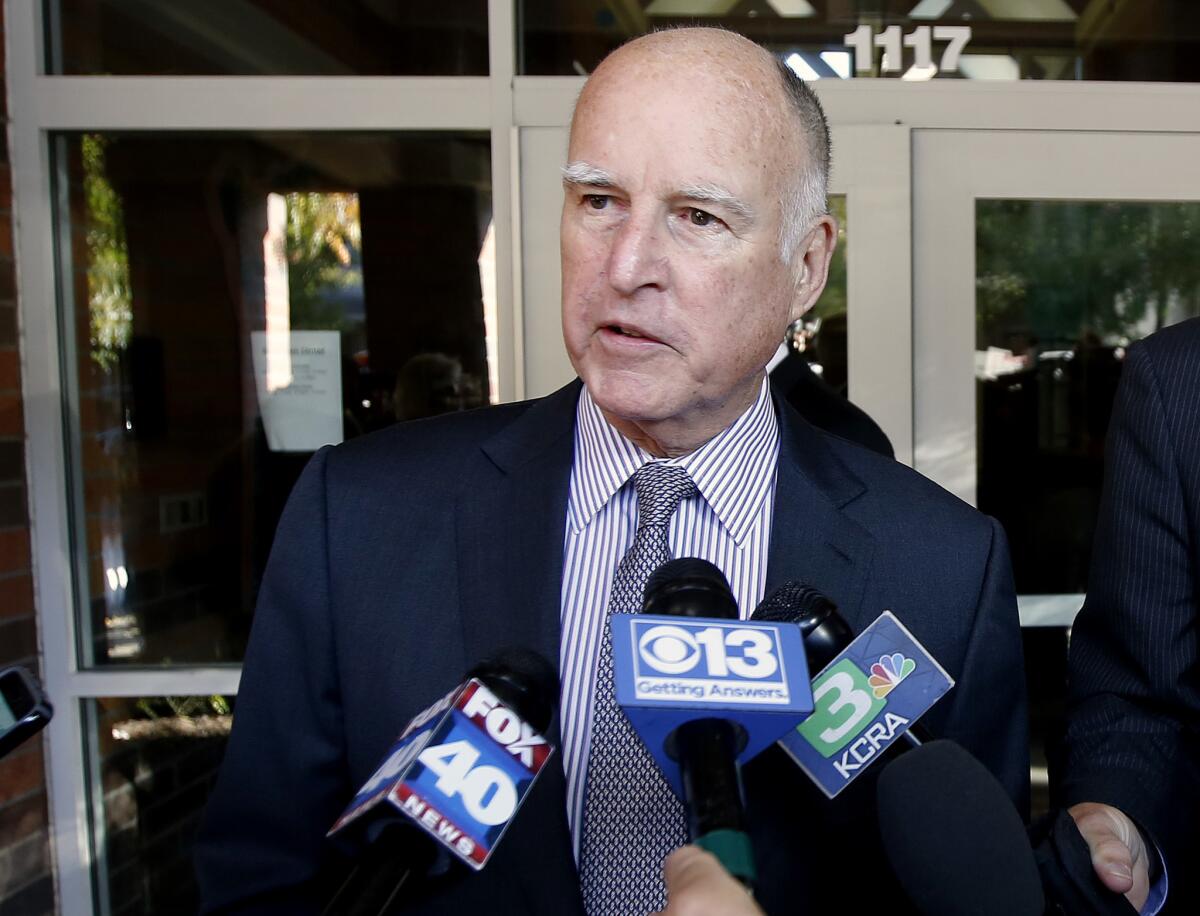
Gov. Jerry Brown said Californians should do their part in helping unify the country after the surprise election of President-elect Donald Trump, but also insists the state will “stay true” to its principles.
“With the deep divisions in our country, it is incumbent on all of us — especially the new leadership in Washington — to take steps that heal those divisions, not deepen them,” Brown said in a written statement on Thursday afternoon. “In California, we will do our part to find common ground whenever possible.”
The brief comments released by his office were the first from Brown since Trump’s surprise win. The governor told reporters Tuesday morning that the nation needed to quickly mend its fences after the divisive election, though he assumed it would in the wake of a win by Hillary Clinton. Brown made a brief trip to Colorado last week to stump for the Democratic nominee.
Few states are as likely to spar more with the new Republican president than California, where the Affordable Care Act has led to a sizeable expansion of government-subsidized healthcare and where liberal reforms of the nation’s immigration policy have strong support.
Brown’s comments come one day after legislative leaders vowed to “lead the resistance” to possible changes led by the president-elect and Republican leaders in Congress.
Though the governor struck a more conciliatory tone, his statement ended with a promise to defend the state’s existing policy choices.
“We will protect the precious rights of our people and continue to confront the existential threat of our time — devastating climate change,” he said.
Brown was sharply critical of Trump during the presidential campaign season on the issue of climate change, taking aim at statements in which the businessman said he’s “not a big believer” in the phenomenon.
In August, Brown vowed to “vanquish” climate change skeptics. “Bring it on,” Brown said at the time. “We’ll have more battles, and more victories.”
The governor’s Thursday statement ended with “E Pluribus Unum” written in all capital letters. The nation’s motto means “Out of many, one.”
There will be fewer women in California’s Legislature in 2017, but number of Latina members grows
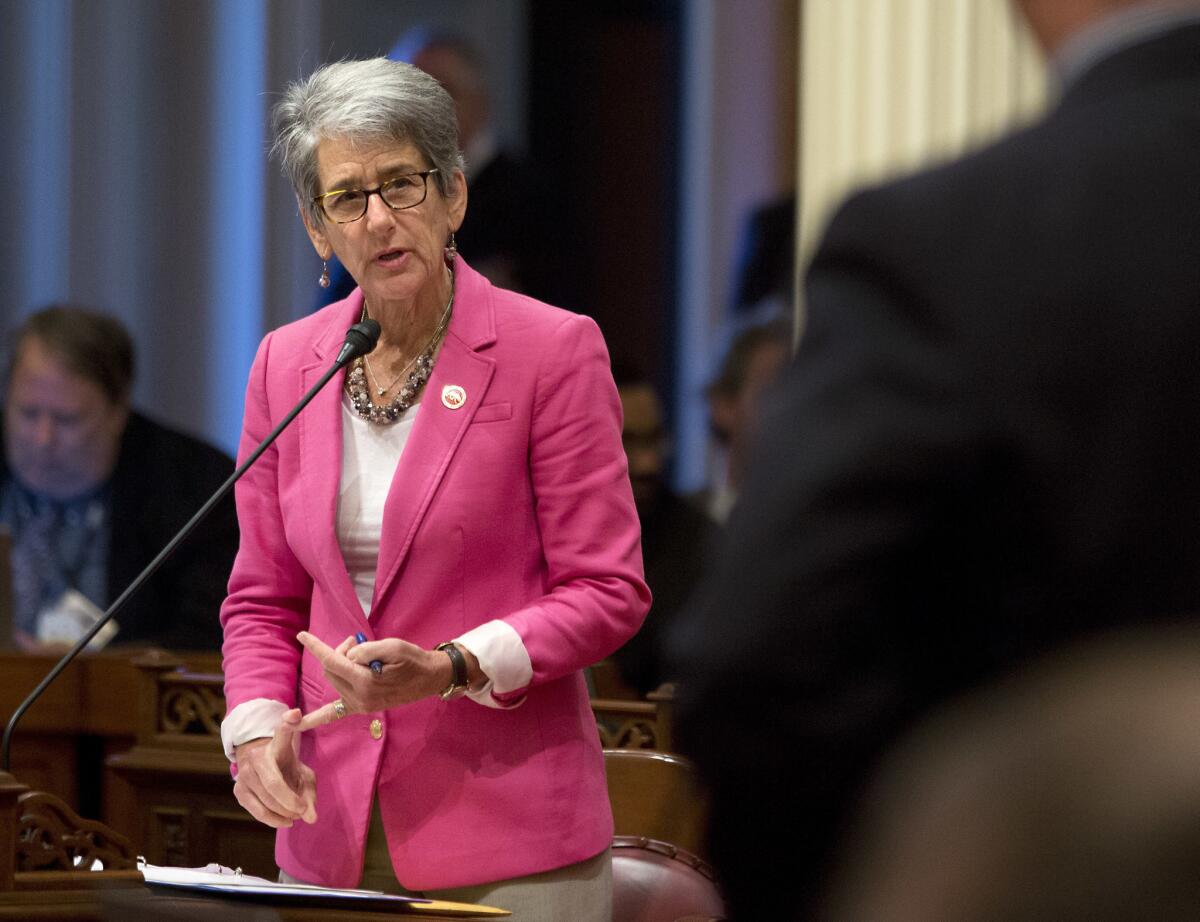
Several legislative races are still too close to be called, but leaders of the California Legislative Women’s Caucus say they expect to lose two seats each in the state Assembly and the Senate.
If the trend in the closest races holds, women will hold 10 of 40 seats in the state Senate, and 17 of 80 positions in the Assembly, according to California Women Lead, a nonpartisan association that recruits and trains women to run for public office.
More than a third of the Legislature’s 30 female members are leaving at the end of the year due to term limits or personal reasons, which has contributed to stagnating numbers of female elected officials in California.
“It was a really big deal that we were able to fill that void,” said Caucus Vice Chair Cristina Garcia.
The Democrats of the Women’s Caucus say they’re also encouraged by the fact that its party’s roster of Latina legislators will grow from five to 10, and that the number of Democratic women in the Assembly is likely to increase from 11 to 14.
Among the new Latinas to be sworn in next month will be Monique Limon, Cecilia Aguiar-Curry, Ana Caballero, Eloise Reyes and Blanca Rubio, according to unofficial results.
Assemblywoman Ling-Ling Chang (R-Diamond Bar), who is still locked in a tight race against Democrat Josh Newman for state Senate, would be the only Republican woman elected to a new position if she prevails after final votes are counted.
Garcia said following Tuesday’s election, she and other caucus leaders have already discussed how to make gains for women in the Legislature in 2018 and beyond. “We have a long way to go,” Garcia said. “I’d like us to be at least 50% of the Democratic Party [caucus], so we’re just focused on the work ahead.”
California’s top elections official calls Trump’s choice for immigration advisor ‘troubling’ and a threat to minorities
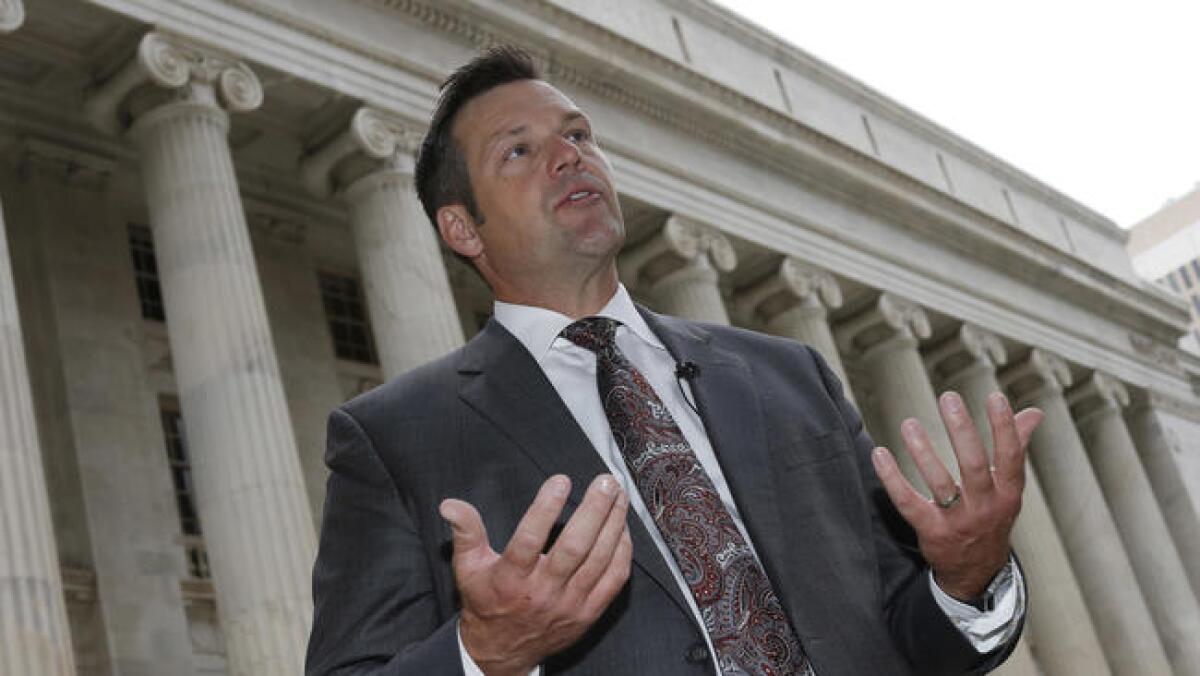
California’s top elections official lashed out Thursday at one of President-elect Donald Trump’s new immigration transition team members, calling the selection a “threat” to communities of color across America.
Secretary of State Alex Padilla criticized the choice of Kris Kobach, who holds the same position in Kansas as Padilla, as counter to Trump’s call for unity. Kobach advised the incoming president on immigration issues during the campaign, and helped draft the Arizona legislation that required immigration status checks during traffic stops.
“Mr. Trump’s selection of Kris Kobach to the immigration transition team sends a deeply troubling message that telegraphs an imminent assault on our collective voting rights and civil rights,” Padilla said in a written statement.
The secretary of state accused Kobach of having a “pattern of supporting racist, anti-immigrant policies including voter suppression and racial profiling laws.”
Proposition 66 hasn’t been called by elections officials, but death penalty opponents are already taking it to court
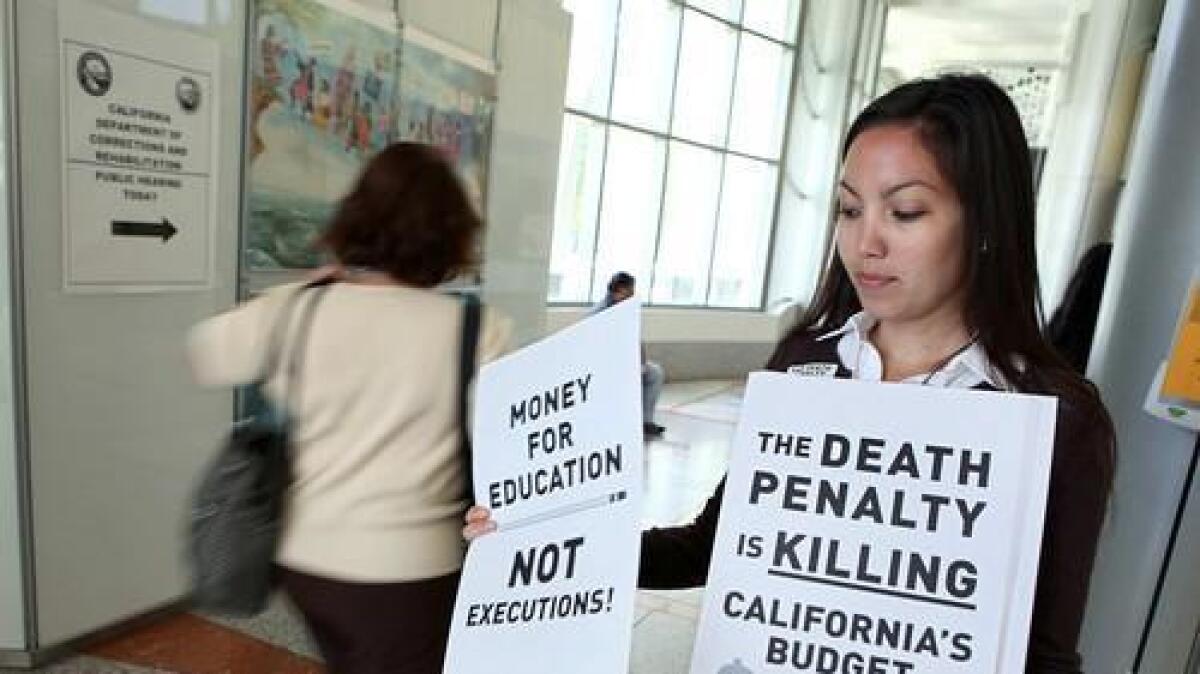
Proposition 66, which aims to speed the death penalty process in California, is still pending official approval, with election returns showing 50.9% of voters supported it.
But former state Atty. Gen. John Van de Kamp and lawyer Ron Briggs, who wrote the proposition that reinstated the state’s death penalty nearly 40 years ago, are already trying to block the implementation of the ballot measure’s provisions.
Proposition 66, which was written by death penalty prosecutors, would require the judge who originally heard a case to hear initial petitions challenging a death penalty conviction, instead of the petitions going to California Supreme Court. It also would limit the appeals process to within five years of a death sentence.
In a petition filed late Wednesday with the state Supreme Court, Van de Kamp and Briggs call the proposition invalid, saying it infringes on offenders’ rights and impairs “the constitutional and inherent powers of the courts.” Named as defendants are Gov. Jerry Brown, Atty. Gen. Kamala Harris, Secretary of State Alex Padilla and the Judicial Council, which is the policymaking body for California’s courts.
Briggs said they filed the petition because the initiative is so flawed. It will thrust further burden on taxpayers, he said, and it does not provide a funding mechanism to implement the provisions. It also “cuts everyone’s constitutional rights,” he said.
“The purpose of an appeal is for a fresh set of eyes to look at what occurred in a lower court,” Briggs said. “What 66 is saying is we are going to keep the case in the lower court, and those same eyes that convicted the defendant are going to review the appeal. We believe that infringes on the constitution and is flat out not fair.”
In a statement, Sacramento County District Attorney Anne Marie Schubert said it has been frivolous lawsuits, like the one the opponents’ filed, that have slowed down the death penalty system in the past.
“The death penalty system in California was broken, largely due to the constant wrangling and roadblocks put up by anti-death penalty lawyers and organizations,” she said. “Their lawsuits are designed to undermine the system and then use the broken system to justify abolition.”
1:40 p.m., Nov. 10: This article was updated with a statement from Sacramento County District Attorney Anne Marie Schubert on the lawsuit.
This article was originally published at 11:18 a.m.
Antonio Villaraigosa announces he’ll run for governor of California
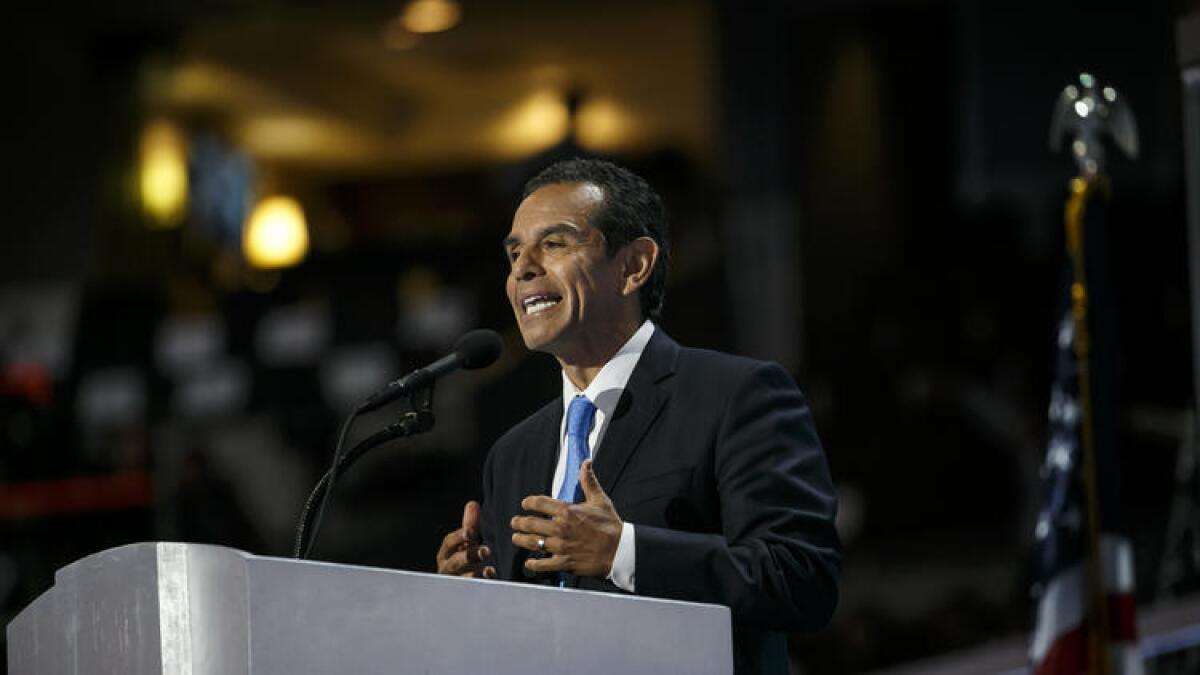
Former Los Angeles Mayor Antonio Villaraigosa on Thursday began his 2018 bid for governor after a three-year hiatus from the political limelight, joining a heady field of candidates that is expected to grow larger in the months ahead.
Read the latest California results and analysis on our post-election live blog
Want to know more about Kamala Harris’ U.S. Senate win? Wondering what is happening to California Democrats’ quest for a super-majority in the Legislature?
Join us over at our post-election live blog, where you can follow statewide, local and national races (and sort them accordingly, too!).
Senate candidate Kamala Harris makes final pitch to voters

California Atty. Gen. Kamala Harris spent the final day before election day hop-scotching from San Diego to Los Angeles, urging supporters to go to the polls to back down-ballot Democrats in tight races.
Harris started Monday morning at UC San Diego with retired Marine Col. Doug Applegate, who Democrats hope will have enough support to knock off GOP Rep. Darrell Issa, one of the Obama administration’s most vociferous critics.
Applegate told the crowd, a mix of students, union workers and party loyalists, one of the major reasons that Issa was on the ropes was because of the “racism, bigotry and misogyny” of Donald Trump, whom Issa backs.
“Kamala and I are going to stand up to extremism on both sides,” Applegate said. “We’re going to work for compromise, balance and, most importantly, we’ll both put country and our community ahead of party.”
From there, Harris took her campaign bus to the Mariscos El Cangrejo Nice restaurant in Anaheim for a rally with state Senate candidate Josh Newman.
At both stops, Harris told supporters that the “stakes are high” in Tuesday’s election and, in a nod to the presidential election, said the results would redefine the nation.
The two-term attorney general ended the day with rallies in Long Beach and at USC.
Harris faces off against Orange County Rep. Loretta Sanchez in Tuesday’s election.
Bernie Sanders campaigns for Prop. 61 in California
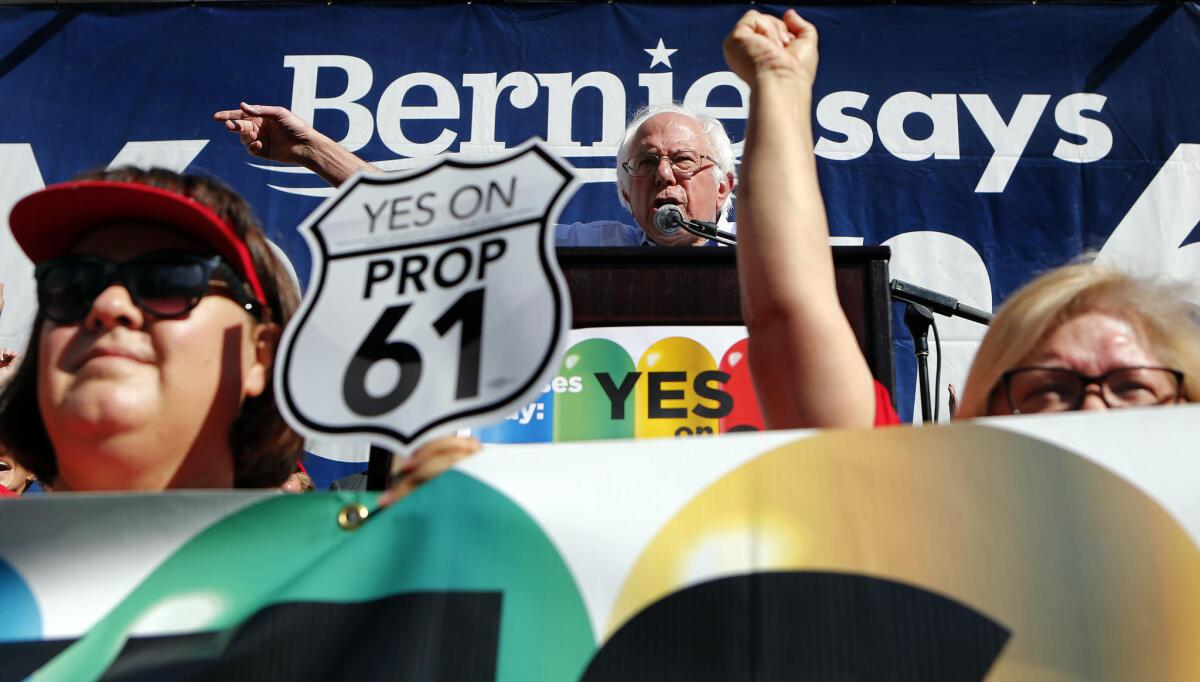
Vermont Sen. Bernie Sanders held rallies in Los Angeles and Sacramento on Monday to urge voters to support Proposition 61, the California pharmaceutical drug-pricing initiative.
Hundreds turned out to see the former Democratic presidential candidate criticize drug companies and encourage supporters to combat the influence of money in politics.
Proposition 61 would limit state government spending on prescription drugs to the prices paid by the U.S. Department of Veterans Affairs. Because the VA typically negotiates the lowest prices for prescription drugs of any public or private entity, the measure’s supporters say they hope to curb rising drug costs paid by the state.
Sanders started the day at Pershing Square in Los Angeles, where he addressed a crowd of about 200.
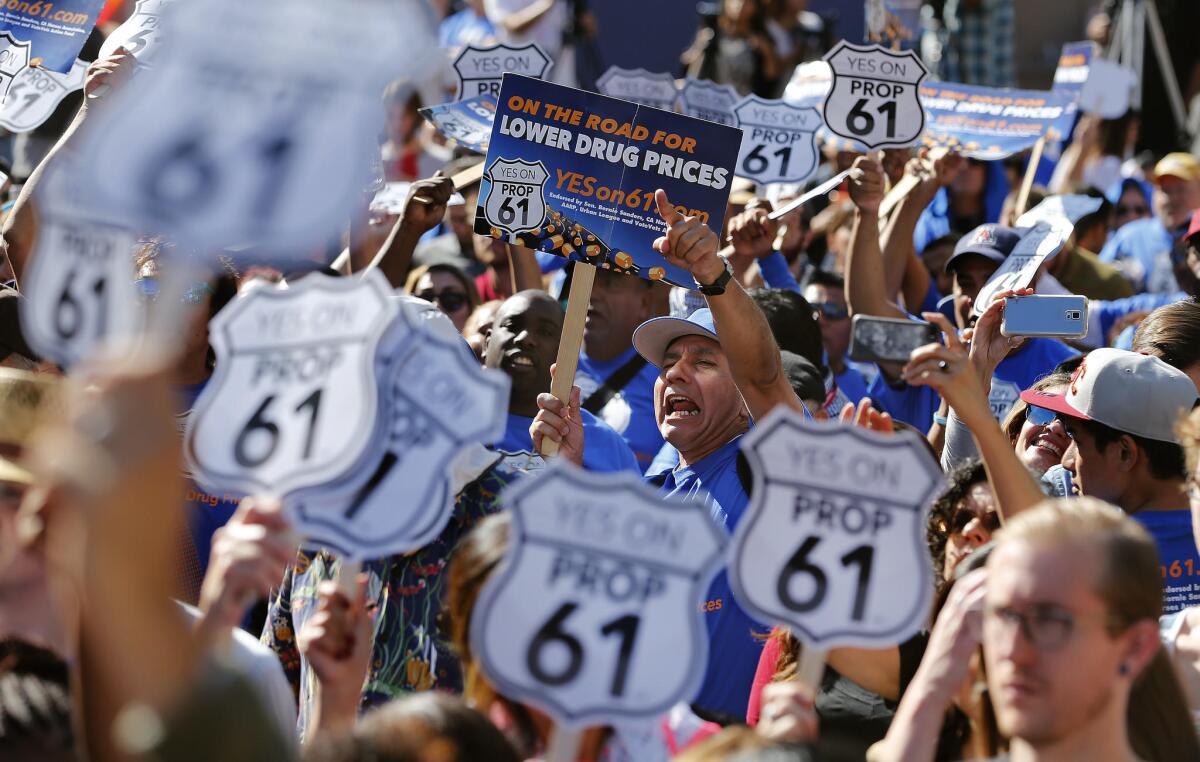
Later, he held a second rally outside the Capitol in Sacramento.
Proposition 61 is the most expensive of the 17 measures on Tuesday’s ballot. Pharmaceutical companies have contributed more than $109 million to oppose it. Supporters of the measure have contributed $18.5 million.
Rep. Loretta Sanchez and some of her California colleagues make one last group pitch
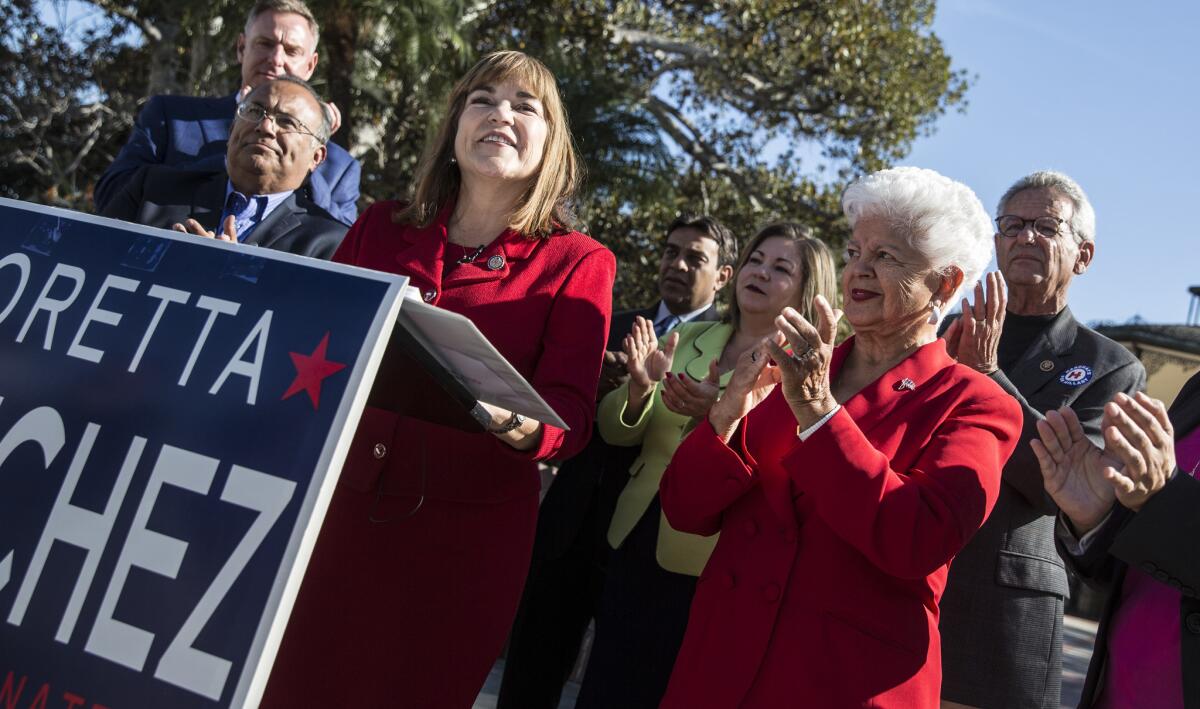
On the eve of election day, Orange County Rep. Loretta Sanchez and several of her congressional colleagues made a last-minute pitch that the state’s open U.S. Senate seat should go to a Latina from Southern California.
Representatives Judy Chu (D-Monterey Park), Grace Napolitano (D-Norwalk), Scott Peters (D-San Diego), Alan Lowenthal (D-Long Beach) and Linda Sanchez (D-Whittier), the candidate’s sister, vouched for the veteran Orange County lawmaker’s credentials and made a regional appeal to voters.
“It is time to elect a qualified Southern Californian Latina,” Linda Sanchez said at a news conference in front of El Pueblo de Los Angeles Historical Monument.
Several noted that both Sen. Dianne Feinstein and outgoing Sen. Barbara Boxer hail from Northern California. Atty. Gen. Kamala Harris is the favorite to win the Senate race and is from San Francisco, though she now lives part-time with her husband in Los Angeles.
“The future of Southern California is with this woman,” Napolitano said of Sanchez.
Assemblywoman Cristina Garcia (D-Bell Gardens) emphasized that Sanchez could be the nation’s first Latina senator and inspire millions of Latinos.
“If you can’t see it, you can’t believe it,” she said.
In a recent USC Dornsife/Los Angeles Times poll, 48% of likely voters supported Harris, compared with 31% who backed Sanchez.
The Times covers California’s election: Join us!

Join us at latimes.com for full election coverage of California’s measures and propositions.
Join us Tuesday for extensive coverage of California contests, the 17 statewide ballot measures, local initiatives and voices from the Golden State.
This week we’re giving readers full access to our election coverage. More info is here.
Race takes center stage in heated L.A. County congressional campaign
The race between Compton state Sen. Isadore Hall and former Hermosa Beach Councilwoman Nanette Barragán to replace Rep. Janice Hahn has taken a sharper, racial edge as election day approaches and the intraparty contest tightens.
Not previously well known in political circles, Barragán has mounted a serious challenge against Hall, a 15-year veteran of Los Angeles politics. Running as a progressive outsider, she has relentlessly blasted Hall’s ties to special interests in the alcohol and tobacco industries and hit him for campaign contributions he has received from petroleum interests.
In a recent interview, Barragán, who is Latina, kept the attacks going, calling the African American lawmaker “slimy.” But she did not stop there, giving a statement that some say injected race into the campaign.
Propositions on Tuesday’s ballot have set a state record for donations
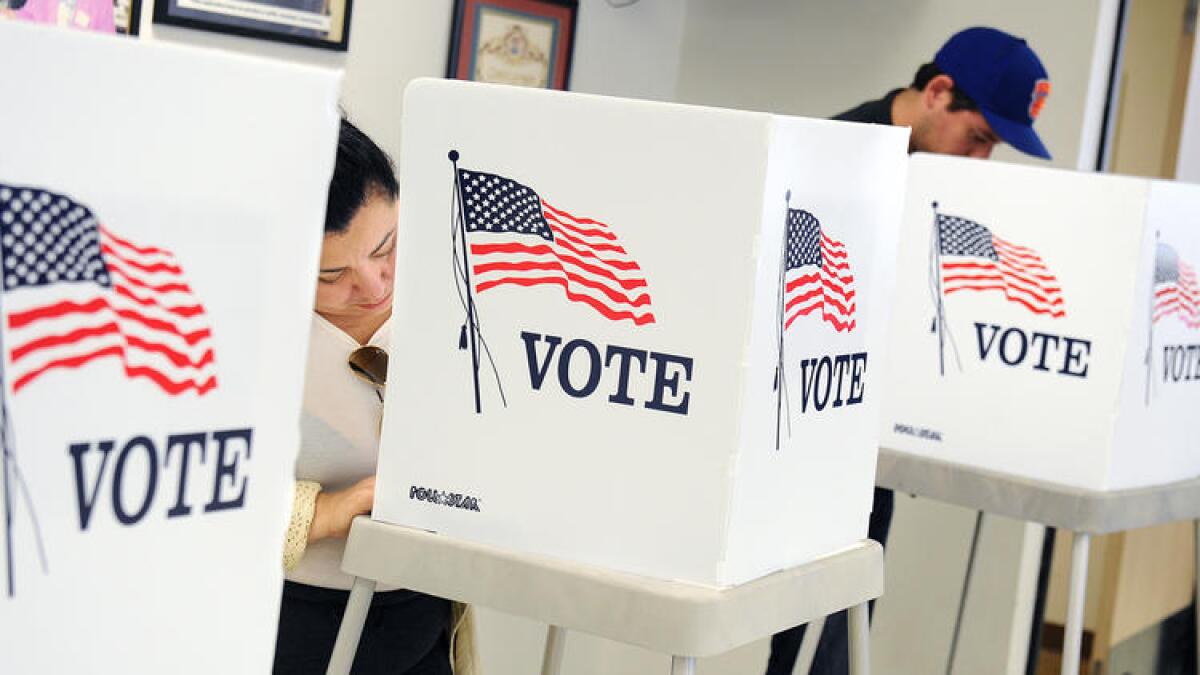
California’s 17 ballot measures have raked in $473 million in contributions, breaking a 2008 record.
A Times review of campaign finance reports and daily campaign disclosures found more than a third of the total came from pharmaceutical and tobacco companies.
Teachers, hospitals and wealthy individuals are among the other big contributors.
California absentee ballot arrives addressed to wrong voter
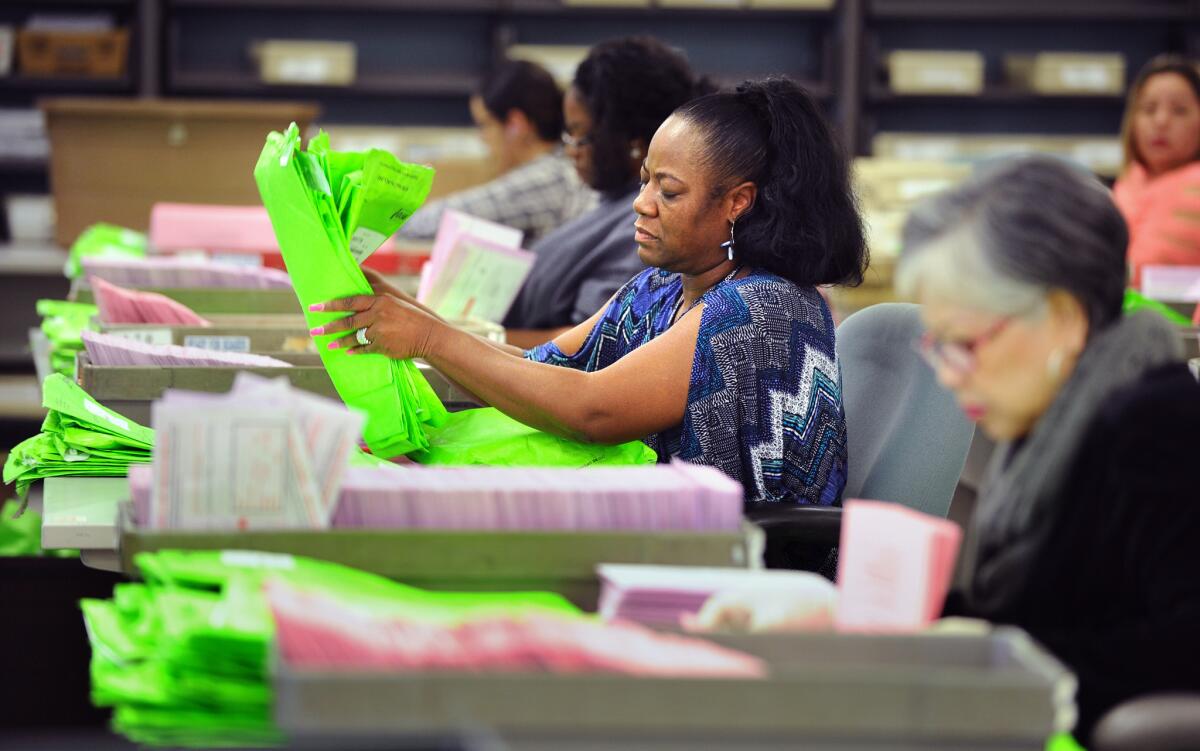
Knowing he would be out of town for election day, Todd Karr thought he was doing the right thing by signing up for an absentee ballot.
But when it arrived in the mail, the ballot had Karr’s address and someone else’s name and voter identification number.
After 15 calls to four different agencies — the registrar, the secretary of state, the Los Angeles County Democratic Party and an election-protection group — Karr was told the ballot could not be corrected.
His only option was to drive to Norwalk, stand in line and vote in person.
“I asked if they had any sense of how that could have happened, and they said no. It was a mistake,” Karr said.
Karr said he can’t make it to Norwalk today. “It looks like I will have to forgo voting at this point,” he said.
“I can’t vote on any of the ballot issues or the Senate choices, and it feels like I’ve been disenfranchised,” he said.
A representative for the Los Angeles County Registrar-Recorder/County Clerk was not immediately available to comment.
Democrats hope Latino voters can help them win an Antelope Valley seat they haven’t held since 1964
The last time a Democrat represented north Los Angeles County’s Antelope Valley in Congress it was 1964, the year Rep. Everett G. Burkhalter decided to give up his seat and retire.
That November, Republican newcomer Edwin Reinecke was able to hold back the massive Democratic wave behind President Lyndon B. Johnson and scratch out a surprise victory for the open seat representing the Antelope Valley at the western edge of the Mojave Desert.
Republicans have had a tight grip on the area ever since, as cities such as Palmdale and Lancaster blossomed with the region’s aerospace boom.
But now, thanks to the rise of Democrats and Latino voters in the high desert district, there is a chance that Republican winning streak could come to an end on Tuesday.
Democrats pulling away in San Diego County
Nancy Pelosi’s granddaughter helps the House minority leader cast her ballot
House Minority Leader Nancy Pelosi handed off her ballot to her granddaughter, Bella Pelosi Kaufman, to cast the San Francisco Democrat’s ballot for Hillary Clinton.
Pelosi’s daughter, Christine, shared a photo Monday on Twitter of the three generations placing the ballot in a box with the words “For our future.” Pelosi’s staff confirmed it was her ballot.
Pelosi endorsed Hillary Clinton the day before the California primary.
Pelosi is also on the ballot seeking a 16th term in Congress against no party preference candidate Preston Picus. She is very heavily favored to retain the seat.
These are the key congressional races to watch in California
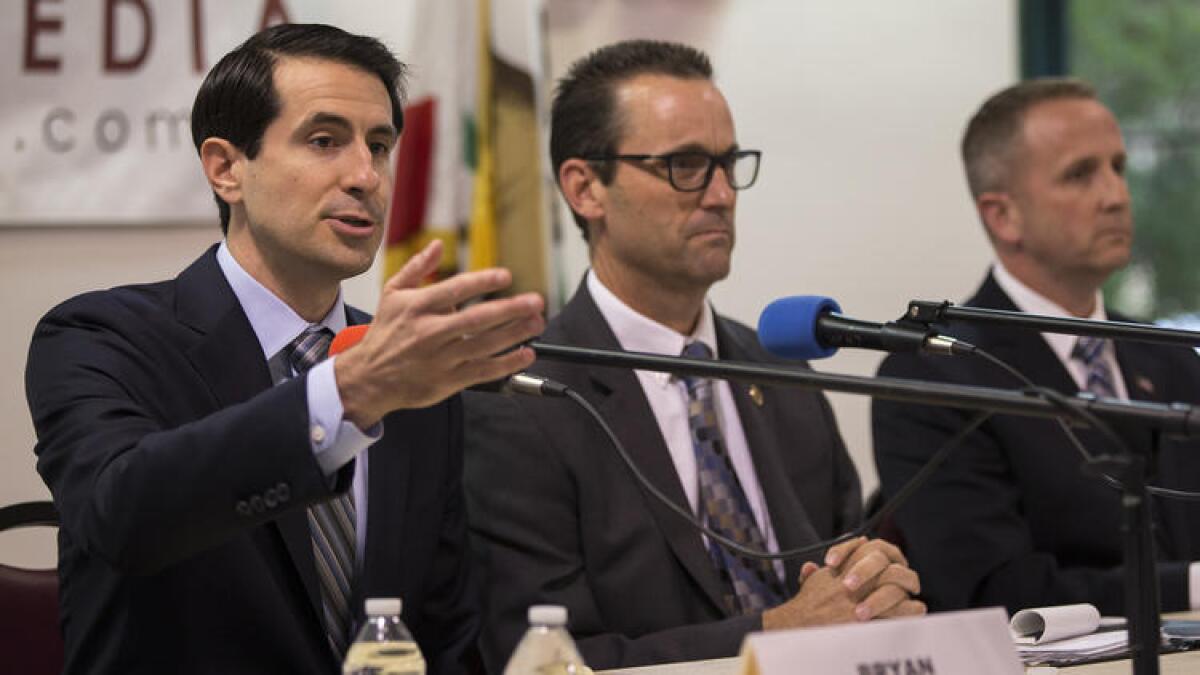
To regain control of the House, Democrats have to win 30 new seats Tuesday night. That likely requires adding to Democrats’ already hefty portion of the 53-member California House delegation — Republicans hold just 14 of the state’s seats and most of them are in solidly conservative districts.
Observers expect Democrats to win closer to 10 or 15 new seats, but if a strong anti-Donald Trump wave develops on election night, these are the California races to watch.
If a wave doesn’t develop, and Republicans have a better-than- expected night, then these are the races to watch in California.
If Kamala Harris is elected California’s next senator, who will be the state’s next attorney general?
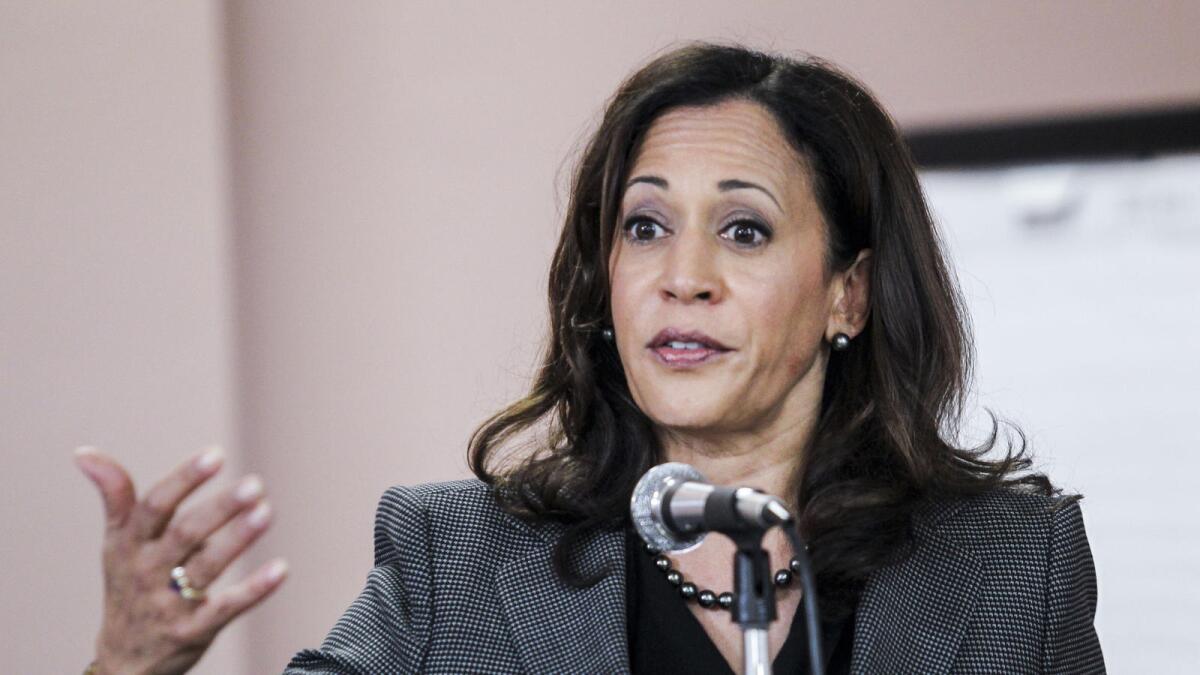
If California Atty. Gen. Kamala Harris wins in her bid to be a U.S. senator, as the polling suggests, the political drama in California isn’t going to end.
Gov. Jerry Brown will need to select her replacement as attorney general, one of the most powerful positions in state government. Brown’s office is mum on what he might be looking for in the state’s next top lawyer, but a Democratic consultant believes the governor would want a caretaker instead of a political upstart to fill out the final two years of Harris’ term.
California Gov. Jerry Brown works to get out the vote for Hillary Clinton in Colorado
One final look at the 2016 campaign and an early look at 2018 in this week’s California Politics Podcast
The long 2016 election cycle hits its final few moments with statewide polling that shows a path to victory for several closely watched crime and public safety propositions.
On this week’s California Politics Podcast, we take a dive into the latest USC Dornsife/Los Angeles Times polling on ballot measures ranging from the legalization of marijuana to Gov. Jerry Brown’s plan to revise prison parole rules.
Meantime, there’s been new buzz on the race for California governor in 2018. A former state schools chief said she’ll throw her hat into the ring, and that means an even more crowded field of Democrats who could be vying to replace Brown.
I’m joined on this week’s episode by Marisa Lagos of KQED News.
Hillary Clinton endorses Democrat Emilio Huerta in Central Valley congressional race
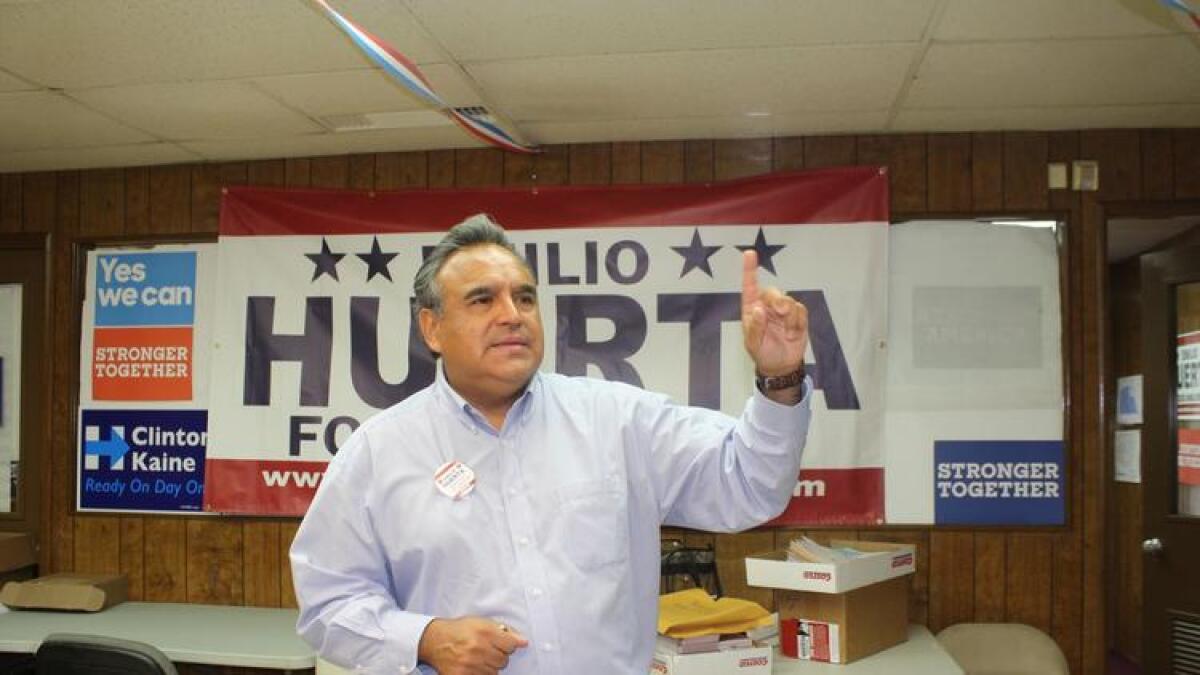
Democratic presidential nominee Hillary Clinton endorsed 21st Congressional District Democratic candidate Emilio Huerta Sunday.
Huerta faces Rep. David Valadao (R-Hanford) in the Central Valley district, a major agricultural region with a population that is nearly 75% Latino.
“I am proud to support Emilio Huerta for California’s 21st Congressional District. From his work in the Farm Workers movement with Cesar Chavez and his mother, Dolores Huerta, to his career as a civil rights and non-profit attorney, Emilio has spent his entire life working for poor and low-income families throughout California and the Southwest,” Clinton said in a statement released by the Huerta campaign.
The district is among a handful of the most closely watched in California. Huerta was endorsed by President Obama on Oct. 26.
Huerta’s mother, labor rights icon Dolores Huerta, has been a visible Clinton surrogate for months, visiting Latino communities across the country to rally a group that historically votes at lower rates but that may feel new motivation following rhetoric about Mexicans and immigrants from Republican presidential nominee Donald Trump.
Democrats have worked to tie Republican candidates to Trump, a move made more difficult in the 21st Congressional District, where Valadao announced in June he could not support Trump for president.
New poll shows Proposition 61 race virtually tied

The campaign for Proposition 61, the prescription drug pricing measure on California’s ballot, is in a statistical dead heat, according to the latest Field-IGS poll results released Friday.
The survey, which polled 1,498 likely voters between Oct. 25-31, showed the measure tied, with 47% saying they will vote yes, 47% saying they’re voting no and 6% undecided. Among those who said they’d already voted by mail, 48% said they voted against the measure while 45% said they voted for it.
The results are vastly different from the Field Poll’s September survey, which half of respondents supporting the measure, 16% opposed and 34% undecided. The USC Dornsife/Los Angeles Times poll, conducted in early September, showed the measure ahead by a nearly three-to-one margin.
The pharmaceutical industry has raised more than $109 million to oppose the measure, blanketing the airwaves statewide with ads that claim it could ultimately increase drug costs for veterans and seniors.
Supporters of the initiative, including the AIDS Healthcare Foundation, have raised more than $18.5 million, focusing its efforts on TV ads featuring Vermont Sen. Bernie Sanders, who has endorsed the measure, and rallies up and down the state.
Voter opinions on Proposition 61 were divided sharply along party, racial and generational lines.
Of those under age 40, 56% said they were voting for the measure, while only 38% of those 65 and older said they supported it.
A majority of California’s Latinos and African Americans said they support the measure at 53% and 63% respectively, while whites oppose the measure 50-45. Democrats were more than twice as likely to support the measure than Republicans, of which only a quarter said they would vote yes.
11:44 a.m.: An earlier version of this post confused spending figures with fundraising figures for the campaigns for and against Proposition 61.
10:35 a.m.: This post was updated with new spending figures for and against Proposition 61.
This post was originally published at 7:27 p.m.
Michelle Obama urges San Diego voters to support Democrats in new TV ad
First Lady Michelle Obama is the star of new television and radio advertisements airing in San Diego.
While she doesn’t mention a specific candidate or race, the ads appear aimed at getting out the vote against Rep. Darrell Issa and ensuring that Rep. Scott Peters is reelected.
“San Diego, everything we’ve accomplished over the past eight years is at stake in this election,” she says in the 30-second television ad. “That’s why we need to elect Democrats who share our values. Our votes on Tuesday will determine the path of San Diego County and our country not just for the next four years, but for generations to come. So please, vote for Democrats for Congress this Tuesday, November 8th.”
The ad is one of three that Obama has cut for California; the others are for Bryan Caforio, who is trying to defeat GOP Rep. Steve Knight, and Michael Eggman, who is trying to oust GOP Rep. Jeff Denham.
The San Diego ad is being paid for by the California Democratic Party, and comes as Issa is in an expectedly tight race with Democrat Doug Applegate. Peters is perennially considered endangered at the outset of an election cycle because of the make-up of his district, but is not considered vulnerable on Tuesday.
Why is Bernie Sanders the unofficial face of Proposition 61? Because in California, he’s more popular than Obama
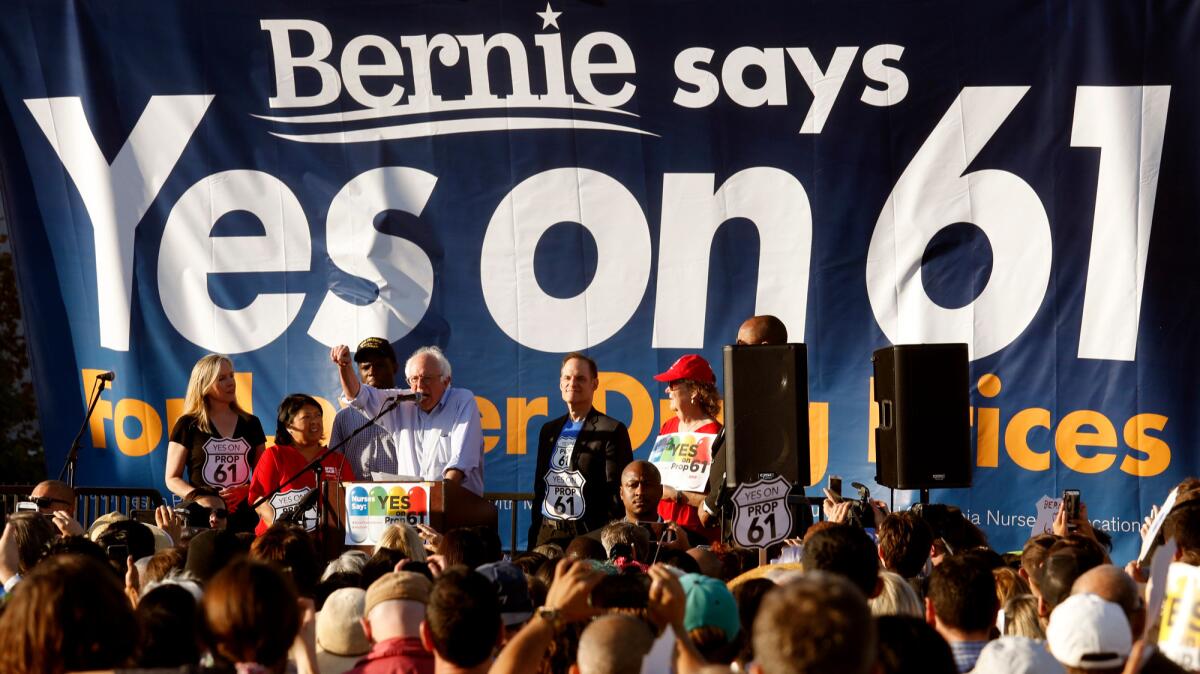
Vermont Sen. Bernie Sanders seem to be all over California these days. He’s criss-crossed the state for rallies, has been featured in television ads and infomercials, and has written editorials in the state’s major newspapers, all in support of Proposition 61.
Proponents of the measure, which seeks to limit the price state agencies pay for prescription drugs, have good reason to feature Sanders so prominently in their campaign.
In California, Sanders has higher favorability ratings than President Obama, according to a new statewide USC Dornsife/Los Angeles Times poll.
Among voters surveyed between Oct. 22 and Oct. 30, 66% had a favorable view of Sanders, while just 27% reported an unfavorable opinion of him. A full 40% of those surveyed reported a “very favorable” opinion of the former presidential candidate. Among Latino voters, Sanders’ support increased to 73% favorable compared to 16% unfavorable.
Obama, on the other hand, enjoys a relatively high 49% “very favorable” rating, with an overall favorable rating from 65% of survey participants.
The survey of 1,500 registered voters was conducted for USC Dornsife and the Los Angeles Times by Greenberg Quinlan Rosner Research and American Viewpoint. The margin of error for the overall sample is +/- 2.3 percentage points.
Sanders, who has called Proposition 61 a “profound moral issue” is expected to do some last-minute campaigning for the initiative on Monday, when he will appear at two more rallies in Los Angeles and Sacramento.
Los Angeles City Council passes resolution in support of ending the death penalty in California
Pointing to a costly system that has resulted in only 13 executions since 1978, the Los Angeles City Council on Friday passed a resolution in favor of Proposition 62, which would repeal the death penalty in California and replace the punishment with life in prison without parole.
The death penalty process has cost taxpayers more than $4 billion over nearly 40 years, the resolution states, and the practice “carries the risk that the state could execute an innocent individual,” despite the years of required appeals and multiple hearings.
Council members also passed a resolution against Proposition 66, which they said would increase the burden on taxpayers and increase the chances of the state killing an innocent person.
That Nov. 8 ballot measure seeks to expedite death sentences by limiting the appeals process to five years, exempting prison officials from the current state regulations process and expanding the pool of lawyers.
Pelosi: ‘There’s an excitement across the country about getting rid of Issa’
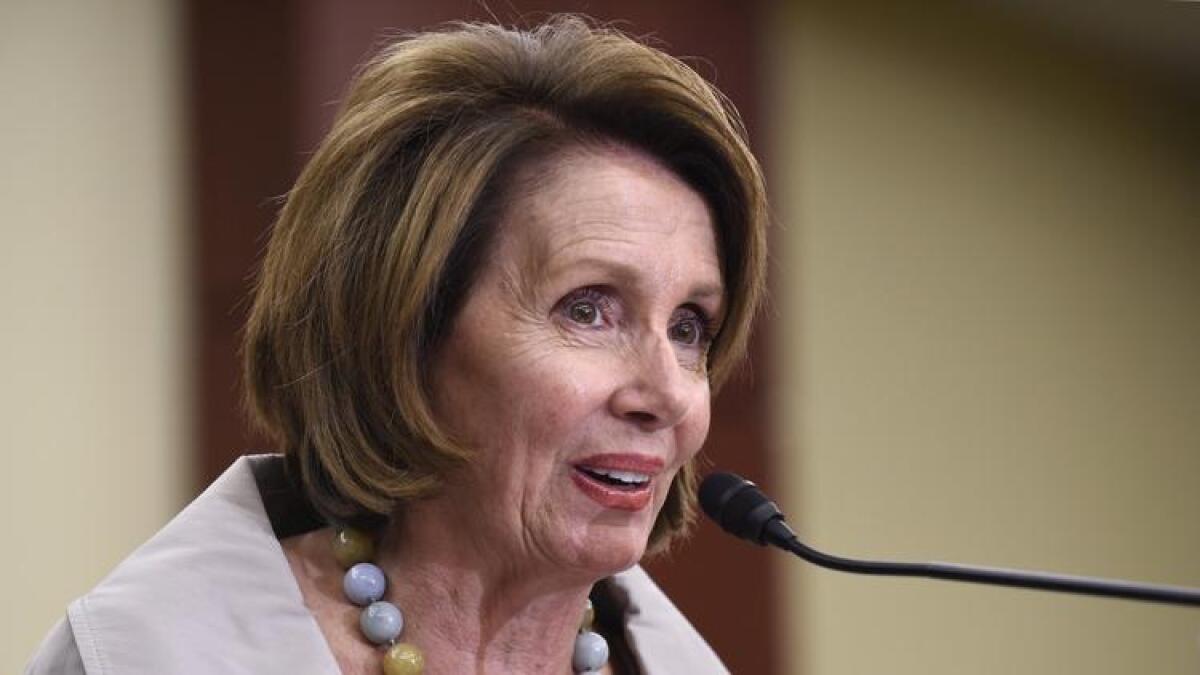
Days ahead of the election, House Minority Leader Nancy Pelosi took aim at one of most unexpected close contests of the season, the 49th Congressional District race between eight-term Rep. Darrell Issa (R-Vista) and political novice Doug Applegate.
“There’s an excitement across the country about getting rid of Issa,” Pelosi said Friday.
Issa finished the June primary with 51% of the vote, his weakest showing in years, and Democrats have pounded him since then over his support for Republican presidential nominee Donald Trump.
Issa has tried to temper his reputation as a thorn in the Obama administration’s side in recent weeks, talking about how he’s worked across the aisle. Earlier this week, Issa urged his colleagues to stop talking about impeaching Democratic presidential nominee Hillary Clinton over her private email server. He also sent out a mailer recently lauding the president for signing one of his measures.
Pelosi spoke with The Times editorial board and members of the newsroom staff in Los Angeles.
Issa’s race against Applegate, a former Marine colonel who has never sought public office before, is one of a handful that House Democrats have in their sights Tuesday as they try to win the 30 seats needed to regain control of the House — a win that, while a longshot, would propel Pelosi back to the speakership.
As House Oversight and Government Reform Committee chairman, Issa poked at President Obama over Benghazi, the Internal Revenue Service, the “Fast and Furious” failed gun sting and other high-theater, cable-ready topics. But Issa’s investigations often failed to show direct culpability on the part of the White House or Obama.
Pelosi said Issa was “one of the worst abusers” of taxpayers’ time and money through his multiple investigations of the Obama administration and of Clinton as secretary of State, and suddenly he’s changed his tune to sound more moderate.
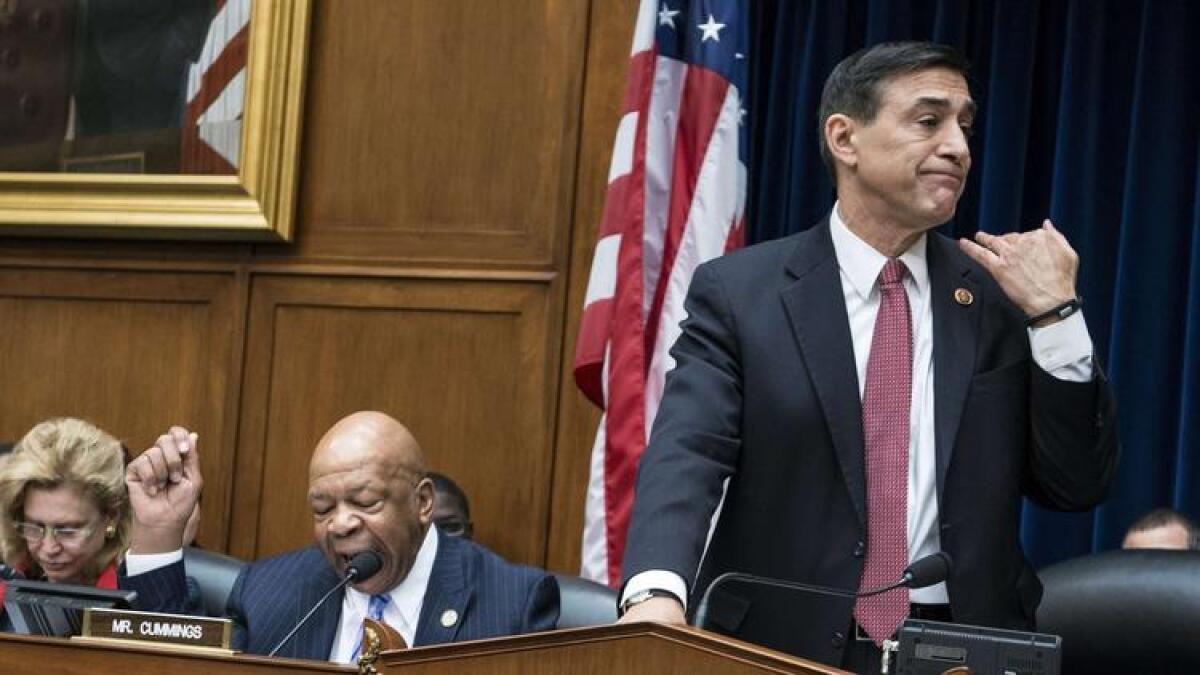
“Now he’s like, ‘Oh, I think we should take impeachment off the table.’ Oh really? Now he’s like a Mr. Goodbar or something,” Pelosi said.
Issa’s campaign manager, Jonathan Wilcox, shot back with a twist on an old Almond Joy jingle via email, “Sometimes Nancy feels like a nut, sometimes she don’t.”
Issa spokesman Calvin Moore added that the congressman is hearing from enthusiastic voters as he takes a bus tour of the district.
“Darrell is extremely proud of the oversight work he’s done year after year to hold Washington accountable,” Moore said in an email. “Everywhere we go, voters respond that they appreciate the work he’s done, and they are eager to send him back to Washington to do even more.”
Christina Bellantoni contributed to this report.
California corrections department submits execution protocol proposal for final review
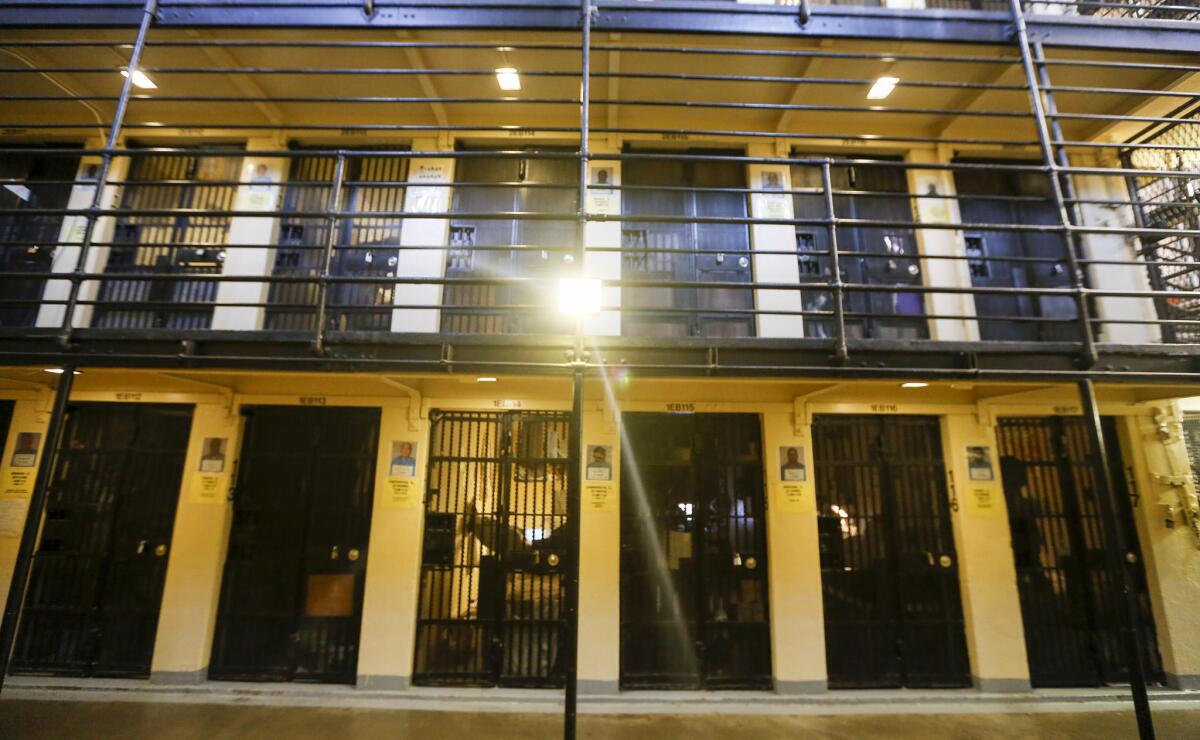
The California Department of Corrections on Friday submitted its proposal for new lethal injection protocols to the state Office of Administrative Law, meeting its deadline under the current state regulation process.
The corrections agency had until Nov. 7 to submit the proposal, and the state administrative law office now has 30 working days to determine its final review. But what happens next depends on what voters decide at the ballot box, as voters are weighing two dueling death penalty propositions.
Proposition 62 would eliminate executions and replace the punishment with life in prison without parole. Proposition 66 intends to amend and expedite the process. It also would exempt the state corrections department the from Administrative Procedure Act, which all state agencies must follow when developing new protocols.
Proposition 66 proponents argue that move would remove layers of bureaucracy that bog down the system. Opponents counter it harms transparency and gives the California Department of Corrections unchecked power.
The latest draft of the execution protocols, a “humane and dignified” single-drug injection procedure, unveiled last year, received about 167,000 individual comments.
California has 19.4 million registered voters — a new record
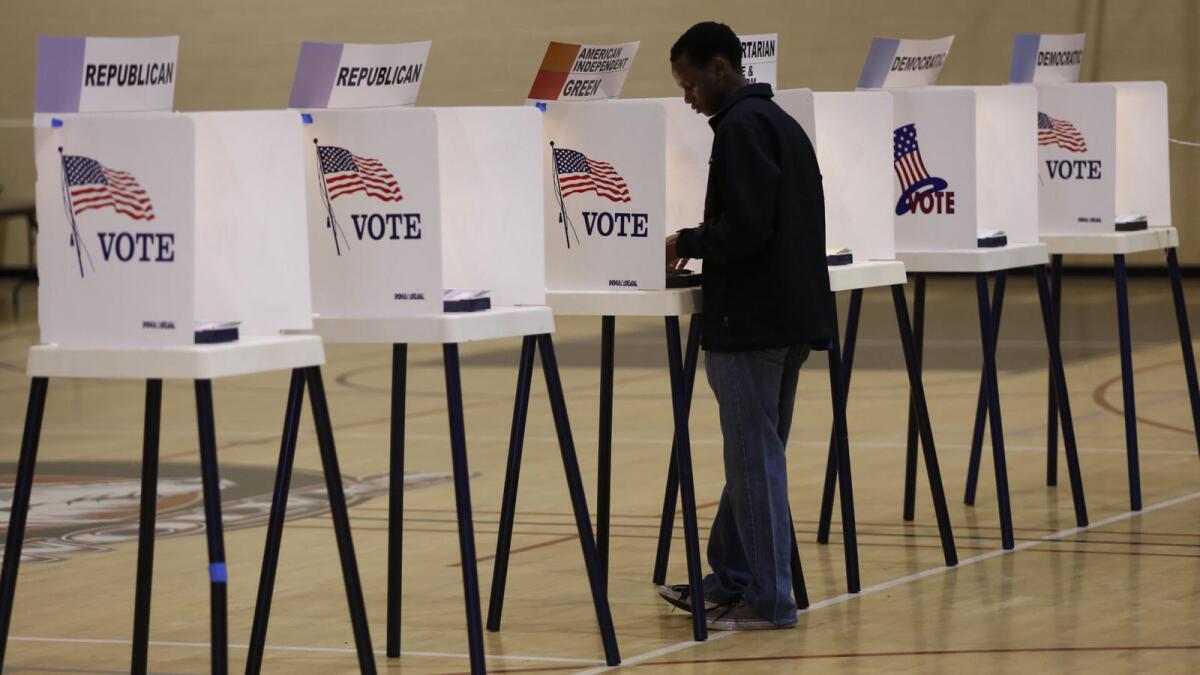
A record 19.4 million Californians are registered to vote in advance of Tuesday’s election, according to the secretary of state’s office in its final report before election day.
More than 78% of eligible state residents are registered, the highest percentage in two decades, and 1.2 million additional voters are registered for this presidential election compared with 2012, the office said.
“2016 is truly a historic year and California continues to break records,” Secretary of State Alex Padilla said in a statement.
Since a similar period in 2012, Democrats have increased their share of registered voters in California from 43.7% to 44.9% and Republicans are down from 29.4% to 26%. Voters who have no party preference increased from 20.9% to 24.3%.
Nancy Pelosi will vote to legalize pot in California
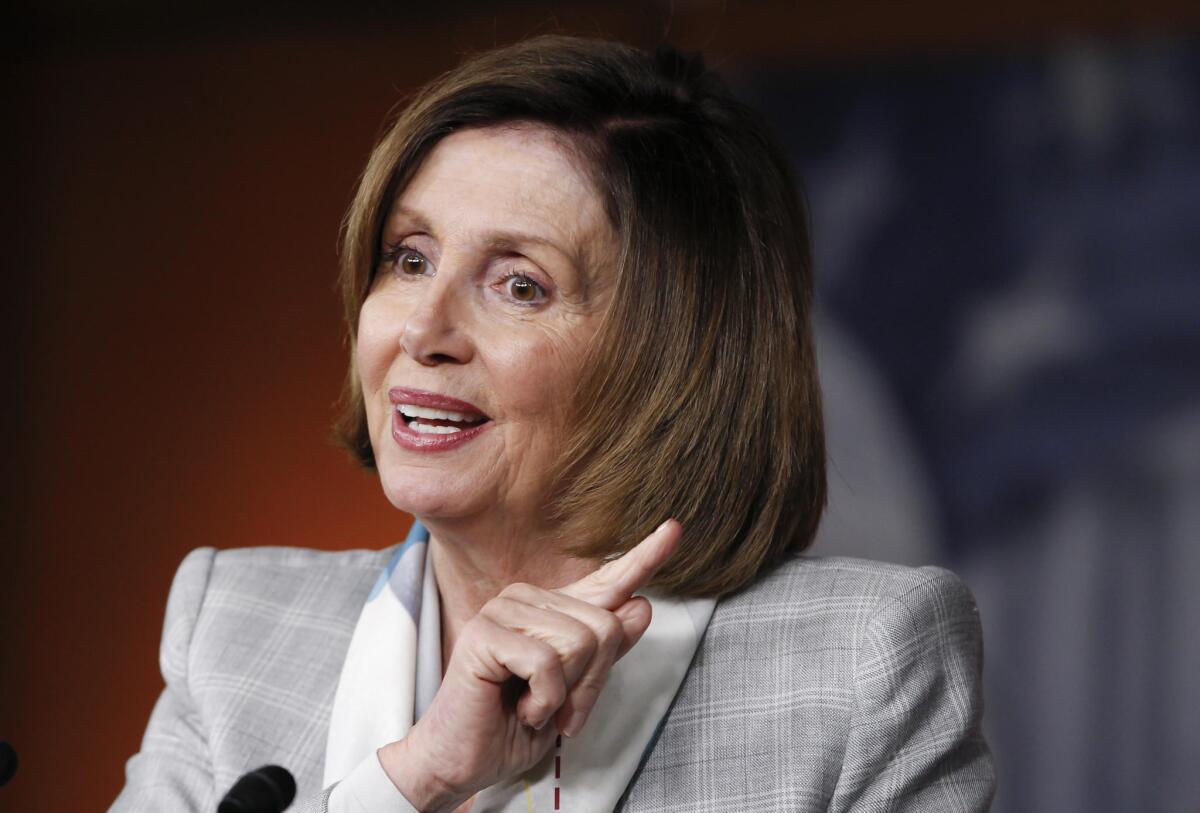
House Minority Leader Nancy Pelosi (D-San Francisco) said Friday she plans to vote for California’s Proposition 64, making her one of a small number of high-level politicians to support legalizing the recreational use of marijuana.
“I will vote for it, but I have not made a public statement about it until right this very second,” Pelosi said when asked about the measure, which is favored to pass Tuesday. She did not elaborate.
Pelosi told the Los Angeles Times Editorial Board and Times reporters that she has not taken public positions on many of the state ballot measures because she is focused on other races in her fundraising and public appearances. She has endorsed Proposition 62, which would repeal the death penalty, along with Proposition 51 to borrow $9 billion in school bonds and Proposition 52, which restricts diverting funds away from Medi-Cal.
She also said she personally supports Proposition 56 to raise tobacco taxes by $2 per pack. She said she hasn’t gone public with positions for all of the measures because she feels some things should be done by the Legislature.
Lt. Gov. Gavin Newsom has long supported the marijuana ballot measure and has called, mostly without success, for other state elected officials to endorse it. The subject came up in a recent California congressional debate that found the Democratic and Republican candidates on different sides.
Democratic Sen. Dianne Feinstein opposes Proposition 64.
Times staff writer Christina Bellantoni contributed to this report.
State Sen. Tony Mendoza faces fines for 2012 campaign finance violations
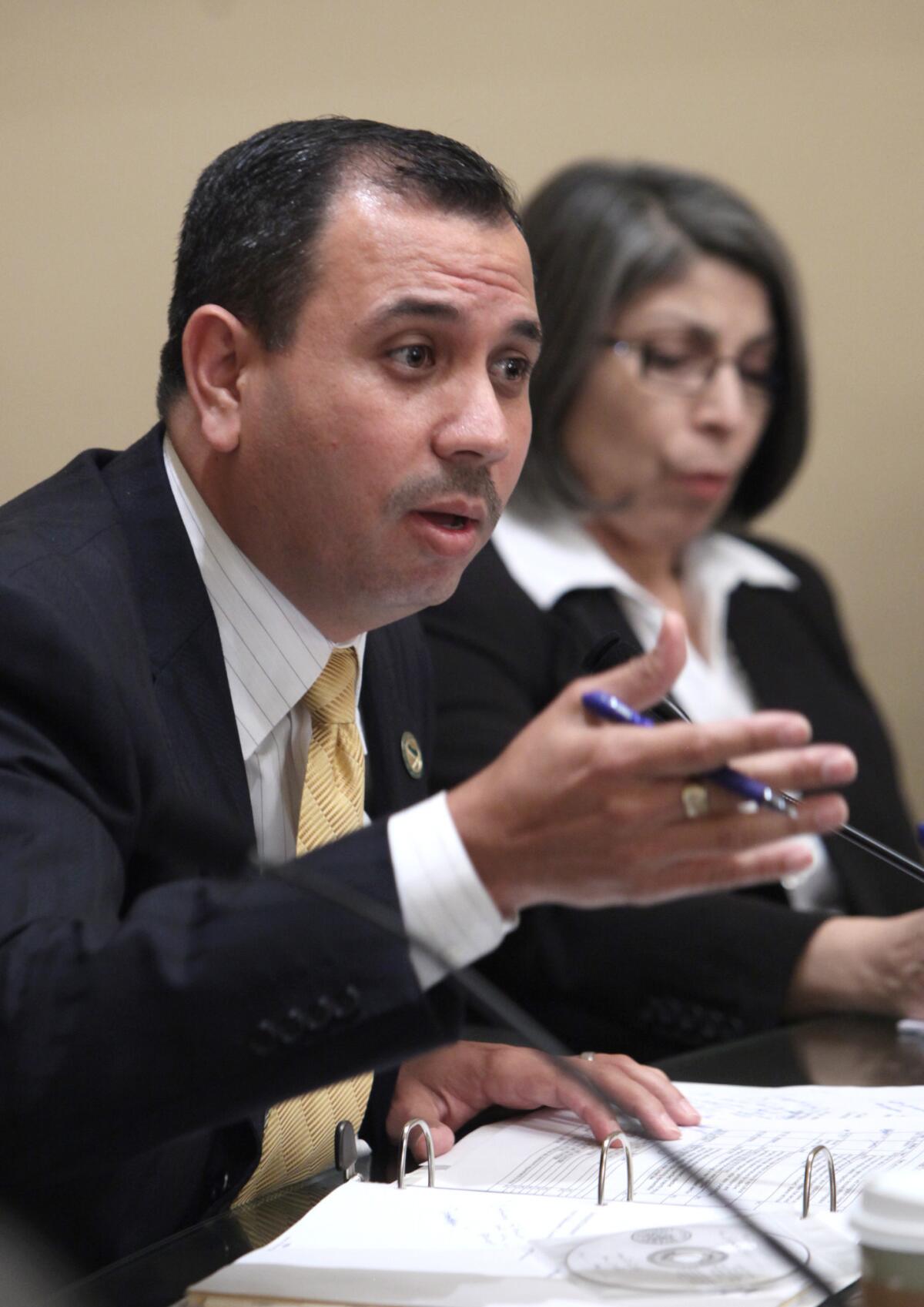
State ethics investigators are recommending $63,000 in fines against state Sen. Tony Mendoza (D-Artesia) and others for several campaign finance violations involving the 2012 election, according to documents released Friday.
State Fair Political Practices Commission officials are also recommending $30,000 in fines against Rudy Bermudez and his Assembly campaign for violations that include accepting excessive contributions from Mendoza. Both men have agreed to the fines.
“Although my actions were well intentioned, I will accept full responsibility for the FPPC campaign finance related violations,” Mendoza said in a statement. “I plan to move forward and serve my constituents and the people of California.”
Bermudez lost in his 2012 bid for office against Ian Calderon, the son of former Assemblyman Charles Calderon and nephew of former legislators Ronald and Tom Calderon. (Ian Calderon is not related to the recent corruption case against Ronald and Tom Calderon.)
The FPPC panel will consider approving the fines at its Nov. 17 meeting.
Mendoza, who was chairman of the Latino Legislative Caucus during part of the time, has agreed to pay the fines for moving $50,000 through his two controlled committees to a Bermudez committee in 2012. The contributions were over the state limit and not properly disclosed, according to FPPC filings.
Mendoza controlled two campaign committees: Yes We Can and Educating Voters. He admitted making an over-the-limit contribution of $50,000 from Yes We Can to Educating Voters and failing to identify himself as the controlling candidate of the latter committee, the FPPC agreement says.
The investigative report said that former Sen. Ron Calderon, then the Latino Caucus vice-chairman, had challenged Senator Mendoza’s handling of the endorsements because his brother, Tom Calderon, was not initially endorsed in an Assembly race against Luis Marquez, a friend of Mendoza’s.
“Soon after the endorsement controversy, Senator Mendoza heard rumors that the Calderons planned to oust him from the Latino Caucus chairmanship and use the money he raised for Yes We Can to support themselves and oppose Senator Mendoza and his allies,” the report said. “Senator Mendoza stated that he wanted to move the money out of Yes We Can so the Calderons could not use the money.”
Tom and Ron Calderon were sentenced this year to prison as part of a federal corruption case not related to the FPPC filing.
Mendoza directed that $42,000 of the money be contributed to a committee controlled by Bermudez, Residents for Good Government, which then turned around and used the funds for contributions to Bermudez and two other candidates.
Mendoza’s aggregated contributions were well over the $3,900 contribution limit per election, totaling approximately $26,879 to Bermudez, according to the FPPC.
Bermudez violated the Political Reform Act by filing inaccurate campaign statements that did not fully disclose the true source of the contributions,according to the FPPC. He also improperly controlled both a committee for election or office and a general purpose committee that made contributions or independent expenditures to support or oppose state candidates, the filing said.
“Consequently, Bermudez had significant influence over the actions and decisions of a state general purpose committee, affording him the means to keep $42,000 away from his political rivals, the Calderon family, and to use some of the money to support his own candidacy,” the FPPC agreement said.
This is not Mendoza’s first run-in with the FPPC.
Californians are deeply divided on the death penalty, according to this new poll

A new poll shows there is a deep divide among likely voters on the death penalty in California, as they weigh two opposing capital punishment measures on the Nov. 8 ballot.
The analysis by USC Dornsife/Los Angeles Times found Proposition 62, which would replace the death penalty with life in prison without parole, has 44% support and 45% opposition among 1,382 likely voters, while 10% said they did not know how they would vote or refused to answer.
It also found only 35% of voters support Proposition 66, which would expedite death sentences, while 42% oppose it. About 21% said they did not know how they would vote or refused to answer.
The Times this week published a look at the 749 inmates on death row in California.
Rep. Duncan Hunter to repay campaign nearly $50,000 in misused funds
Congressman Duncan Hunter (R-Alpine) says he will repay $49,000 back to his campaign after months of revelations that he used the fund for personal expenses.
The congressman announced the repayment to the Press-Enterprise on Thursday.
“While the charges were primarily authorized by the campaign, the buck stops with me and I take full responsibility — including the responsibility to determine and implement other structural changes to ensure errors are not repeated,” he told the newspaper. “In taking these steps, I am fully confident that the right oversight and controls are now in place.”
Hunter’s opponent for the 50th District seat in San Diego County, Democrat Patrick Malloy, told the Press-Enterprise the repayment will not repair Hunter’s reputation.
Former DEA heads urge Gov. Jerry Brown to oppose Prop. 64, which would legalize recreational pot use

Five former heads of the U.S. Drug Enforcement Agency have signed a letter to Gov. Jerry Brown asking him to take a stand against Proposition 64, which would legalize recreational use of marijuana in California.
Brown has not taken a position on the ballot measure, an aide said, and it is uncertain whether he will do so before Tuesday’s election.
The letter says California should delay approval of legalization until it can see how Colorado and other states are dealing with problems including impaired driving and marijuana use by teenagers.
“Let us at least see if these negative trends continue before taking this plunge,” the letter says. “This means that Californians, many of whom will listen to you, should vote against Prop 64. Is it wise social policy to adopt a measure that will substantially increase the numbers of marijuana users, including our youth?”
The letter is signed by former DEA administrators Robert C. Bonner, Jack Lawn, Karen Tandy, Peter Bensinger and Michele Leonhart.
Lawn was appointed to head the DEA by then-president Ronald Reagan, Bonner by Pres. George H.W. Bush, Bensinger by Pres. Gerald Ford, Tandy by Pres. George W. Bush, and Leonhart by Pres. Barack Obama.
The letter from the five former administrators raises concerns about what it calls “troubling” reports that Colorado, since legalization three years ago, has seen marijuana use by teenagers increase, a spike in emergency room visits and troubling numbers on marijuana-related traffic accidents.
Jason Kinney, a spokesman for Proposition 64, disputed that Colorado is experiencing serious problems.
“The fact is – Colorado’s system is working,” Kinney said. “The governor who once opposed it now says it’s working, the voters there support it and the tax revenue there has been a boon for state and local programs. Teen marijuana use has not increased, and exaggerated reports of Colorado’s problems have been largely debunked by independent studies.”
Bonner lives in California and Leonhart also has ties to the state.
Kinney scoffed at the letter, calling it “a finger-wagging lecture” from “poster children for America’s failed, sordid and racially-biased war on marijuana.”
The former DEA heads note in the letter to Brown that he has voiced concerns about marijuana in the past. Appearing on NBC’s “Meet the Press” in 2014, Brown asked “How many people can get stoned and still have a great state or a great nation?”
He added in that interview “The world’s pretty dangerous, very competitive. I think we need to stay alert, if not 24 hours a day, more than some of the potheads might be able to put together.”
The letter, and others planned by former associates of Brown, are part of a campaign to get the governor to take a stand against Proposition 64, according to Kevin Sabet, a legalization opponent and head of the Washington-based group Smart Approaches to Marijuana.
“The governor’s silence is deafening,” Sabet said. “A lot of people want to see some leadership against 64. We know how the governor feels about marijuana.”
California billionaire Tom Steyer criticizes Trump, dodges question about running for governor in Vice News segment
In a segment on HBO’s “Vice News Tonight” that aired Thursday, California billionaire and political donor Tom Steyer avoided saying whether he planned to run for governor.
“I have said consistently that we are completely engaged through 2016. I will continue to work on the stuff that I care most about,” he told correspondent Nellie Bowles when she asked about a potential gubernatorial bid. “The question will be how can I do it in the way that has the most impact.”
The former hedge fund manager’s comments are consistent with what he told The Times in a June interview, when he said he wouldn’t decide whether to run until after the November election.
Steyer has given more than $67 million in federal contributions toward Democratic campaigns this election cycle, making him the top individual donor, according to Open Secrets, a nonprofit that tracks money in politics.
He has donated more than $11 million to California ballot measures this cycle. Most of that money has gone toward Proposition 56, which would implement a $2-per-pack cigarette tax. But he’s also contributed to income tax measure Proposition 55, death penalty repeal initiative Proposition 62, parole measure Proposition 57 and bilingual education measure Proposition 58.
In the Vice News interview, Steyer also criticized Republican presidential nominee Donald Trump, who has called him a “radical activist.”
“Donald Trump? I think he’s a lousy businessman,” Steyer said. “Are you filming that? I’m not afraid of it. It’s the truth.”
Likely voters lining up behind Gov. Jerry Brown’s parole revamping plan
Proposition 57, a sweeping plan to offer new parole opportunities to thousands of state prisoners while shifting juvenile defendants out of adult courtrooms, is poised to become law once the votes are tallied next week.
A new USC Dornsife/Los Angeles Times poll shows the ballot measure championed by Gov. Jerry Brown supported by 57% of likely voters, with 31% opposed.
Why the big school bond ballot measure might be struggling
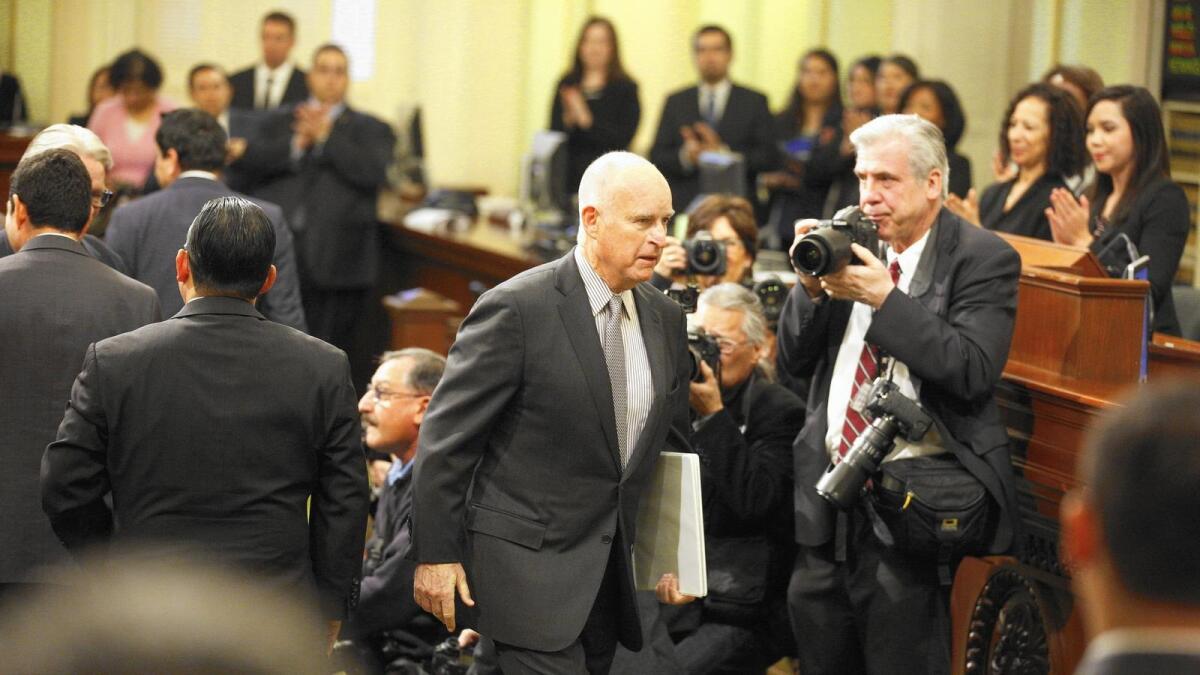
Proposition 51 seems to have everything going for it. The $9-billion state school bond ballot measure has support across the political spectrum, a decent chunk of campaign money and a strong history of voters looking kindly on school construction spending.
But the measure is having trouble in the polls, registering less than 50% support. A pollster says that voters could be scared off by the bond’s size and impact on the state budget.
California voters support gun control ballot measure, poll shows

A gun control initiative on next week’s ballot in California is supported by 58% of likely voters, while 35% are opposed, according to a new statewide USC Dornsife/Los Angeles Times poll. Proposition 63 enjoys its strongest support among minority registered voters, the poll shows.
The initiative would require background checks for those purchasing ammunition and outlaw the possession of large-capacity ammo magazines, among other things.
If California voters speed the death penalty, how will the state execute prisoners?
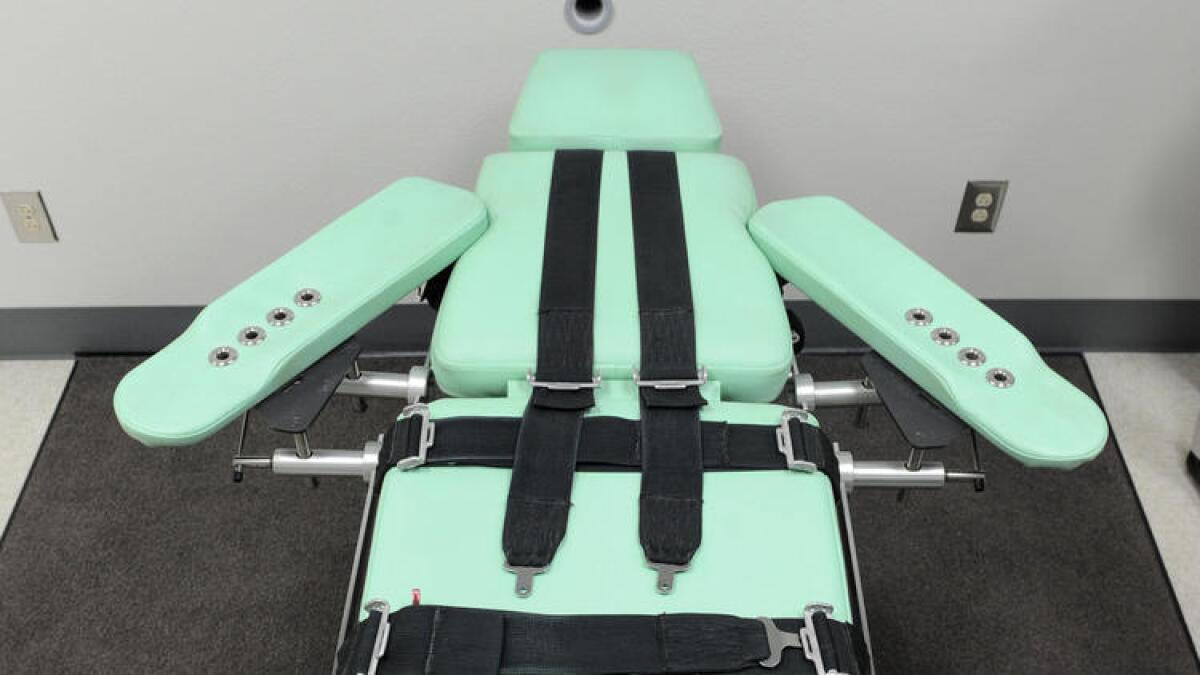
For 10 years, the death penalty system in California has been on pause, as the state has sought to develop a new method for killing prisoners. Now the fate of the latest proposal is hanging at the ballot box.
Proposition 66 intends to expedite executions by changing how and how often death row inmates can appeal their sentences. If voters approve the measure on Nov. 8, it also would exempt prison officials from the Administrative Procedure Act, which sets the regulations all state agencies must follow when establishing new guidelines.
Supporters say the move would remove unneeded bureaucratic layers that bog the system down. Opponents counter it would harm transparency.
It passed overwhelmingly in Montana and Colorado, and now activists want Californians to speak on money in politics

It’s not easy to overturn a U.S. Supreme Court decision. Congress can’t do it alone, and unless the court reverses itself, the only other avenue is changing the Constitution.
For national groups hoping to overturn the 2010 Citizens United decision that altered how much corporations can spend on politics, they know it’ll be a slow, state-by-state slog they hope passes through California when voters consider Proposition 59 on Tuesday.
They’re working to get measures like the proposition, which asks Californians whether they want their members of Congress to work on a constitutional amendment to overturn the decision. It would have no binding power, and because it has no legal force, opponents say passing it is a waste of time.
Colorado and Montana, the two states where voters already have considered similar measures, passed their own voter instructions to Congress with about 75% of the vote. Every county in both states approved it.
“We honestly didn’t know what would happen. We were surprised when it passed a pretty conservative state with 75 percent of the vote,” California Common Cause spokesman Derek Cressman said of the Montana vote.
If Californians approve the measure, it will be an even louder statement, they say. Advocates have persuaded hundreds of city councils, and more than a dozen state legislatures, to pass resolutions pushing for a constitutional amendment. Washington voters have a similar measure before them.
It took years, a trip to the state Supreme Court and two runs through the Legislature before the measure aimed at overturning Citizens United got on the California ballot as Proposition 59.
“We need to make clear to our elected officials at the state and federal level … that their constituents want them to make this happen,” said Move to Amend Coalition National Director Kaitlin Sopoci-Belknap.

A brief timeline of the history of Citizens United.
Opponents of marijuana legalization say licensing requirements laid out in ballot measure are inadequate
Opponents of an initiative to allow recreational marijuana use in California said Wednesday that its extensive licensing requirements would not include websites, including Weedmaps, that provide guides to cannabis stores, varieties and doctors without handling the product.
A spokesman for the Proposition 64 campaign called the complaint “silly and desperate” and noted that existing laws regulate such websites.
The issue was looked at by the Office of Legislative Counsel, the nonpartisan public agency that prepares legal opinions, at the request of state Sen. Jim Nielsen (R-Gerber), an outspoken opponent of Proposition 64.
Proposition 64 requires state licenses for businesses that grow, transport, process and sell marijuana.
“Because the technology platform would not sell or deliver marijuana products within the meaning of Proposition 64, it follows that it would not require licensure as a distributor or retailer,” wrote Richard Mafrica, deputy legislative counsel. “Therefore, it is our opinion that the technology platform would not be required to obtain a license under Proposition 64.”
That also would mean that the website would not be subject to Proposition 64’s restrictions on advertising, Mafrica wrote.
The opposition campaign noted that Weedmaps, an Irvine company, has contributed close to $1 million to the campaign for Proposition 64.
“This is a blatant and egregious example of a special interest writing regulations that maximize profit at the expense of public health that do not even apply to the largest advertising platforms in the pot industry,” said Ken Corney, president of the California Police Chiefs Assn.
Federal law considers marijuana to be an illegal drug, which cannot be advertised on federally regulated television and radio stations.
Jason Kinney, a spokesman for the Proposition 64 campaign, said the opponents are “brazenly attempting to mislead voters.”
He said under Proposition 64, advertising by licensed marijuana businesses on any platform will be subject to restrictions in the measure “and any future restrictions set forth by state regulators or the Legislature. Moreover, as the Legislative Counsel clearly points out, any technology platform will be further subject to all existing state advertising and marketing restrictions.”
California judge denies ACLU’s request to allow ‘ballot selfies’ on election day
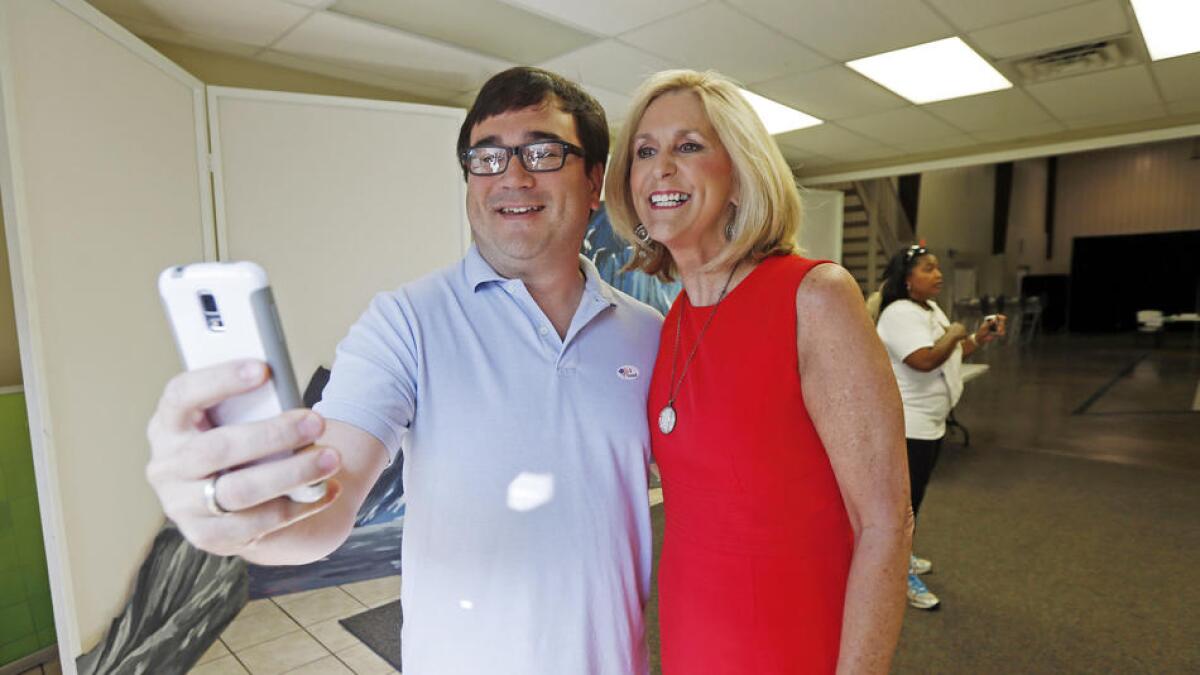
A federal judge has denied the ACLU’s request for California voters to be allowed to take and share “ballot selfies” when they go to the polls Tuesday.
Judge William Alsup of the U.S. District Court of Northern California said he was denying the ACLU’s request because of the “lateness of the request” and to avoid the risk of confusing voters.
The civil rights group filed the suit against Secretary of State Alex Padilla on Monday, saying it was concerned about the “chilling effect” the ban could have on voters’ free speech. A new law signed by Gov. Jerry Brown this year will repeal California’s ban on sharing photos of marked ballots, but it doesn’t take effect until January 1.
“We are disappointed in the court’s ruling,” said Michael Risher, an attorney with the American Civil Liberties Union of Northern California. “Because the election is now six days away, we don’t think there is time to have an appellate court consider the issue.”
In a statement, Padilla reiterated that Alsup’s ruling means “ballot selfies” are “not authorized” for the Nov. 8 election. Voters are still allowed to use their smartphones in the voting booth and may still take photos with their “I Voted” stickers, he added.
“Freedom of speech is sacrosanct,” said Assemblyman Marc Levine (D-San Rafael), who authored AB 1494, the law that will soon allow voters to share photos with their ballots. “Any direction to poll workers or voters that gets in the way of freedom of speech is misguided and also unconstitutional.”
The state’s ban on sharing marked ballots is 125 years old and was drafted in an attempt to cut down on voter intimidation and preserve a voter’s secret ballot. In recent years, civil rights groups like the ACLU have argued that the outdated law prevents voters from exercising crucial political speech and discourages the use of technology in get-out-the-vote efforts.
It’s unclear if the act of sharing one’s marked ballot has ever been prosecuted in California.
National Republicans accuse Democratic Rep. Ami Bera of supporting higher taxes in new ad
The National Republican Congressional Committee is attacking U.S. Rep. Ami Bera (D-Elk Grove) over 2010 comments in a new television ad, accusing the congressman of supporting higher taxes.
The ad posted online Tuesday cites an article from the Elk Grove Citizen from 2010, before Bera was in Congress, which quotes him as saying the Bush tax cuts should expire.
The ad accuses Bera of wanting to raise taxes on retirement savings, eliminate tax credits for families with children and make it harder for married parents to receive tax credits. Child tax credits, the so-called marriage penalty and tax policies affecting retirement savings were all addressed under laws enacted during President George W. Bush’s administration.
In response, Bera’s campaign pointed to his votes in Congress to support a child tax credit, make it easier for married parents to receive child tax credits and decrease taxes on retirement accounts.
The ad also attacks Bera for his father’s campaign money crimes. In August, a federal judge sentenced his father to a year and a day in prison for funneling money to his son’s congressional campaigns in 2010 and 2012. The congressman has said he had no knowledge of his father’s illegal behavior.
In May, the U.S. attorney’s office said it found no evidence that Bera was involved in the scheme and announced in September that it would not file additional charges in the case.
Bera faces a tough reelection fight in his Northern California swing district against Republican challenger Scott Jones, the Sacramento County sheriff.
The ad will run on television until the election, National Republican Congressional Committee spokesman Zach Hunter said, characterizing the spot as “our closing ad in one of our top pickup opportunities.”
In today’s California celebrity voting watch: Stevie Wonder
The California Democratic Party’s voter intimidation hotline opens Friday
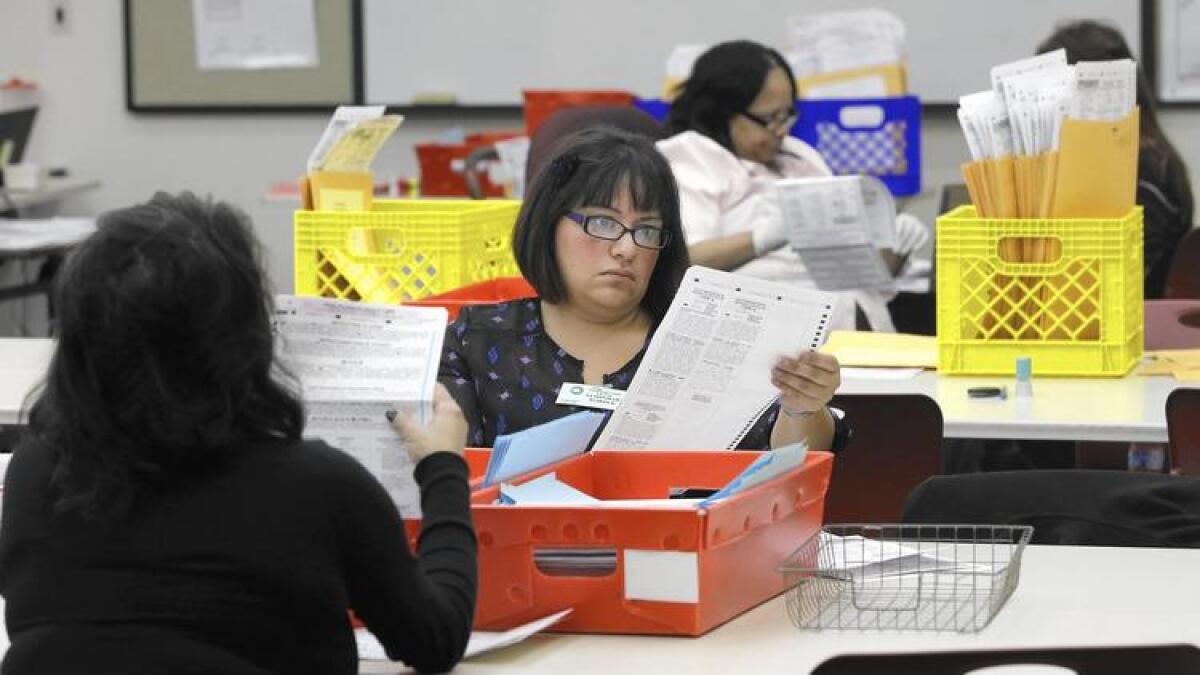
Saying it wants to counter Republican presidential nominee Donald Trump’s claims of a rigged election, the California Democratic Party is hosting a hotline staffed with attorneys who can address legal questions about voter intimidation.
Civil rights groups have compared Trump’s urging supporters to “go check out” polls in “certain areas” to a call to monitor and intimidate minority votes.
“Voting is the most basic right in our democracy, but we have already seen Republicans here in California and across the nation using voter suppression tactics to stop people from voting,” California Democratic Party Executive Director Chris Masami Myers said in a statement.
Voter fraud is rare, though there have been a few irregularities this year. More than 18 million Californians are registered to vote ahead of Tuesday’s election.
The party’s hotline opens Nov. 4 and also will have volunteers available to answer non-legal questions about polling hours and locations in English and Spanish.
Former New York Mayor Michael Bloomberg pours $18 million into Bay Area soda tax measures
Former New York Mayor Michael Bloomberg has contributed more than $18 million toward two local soda tax measures in the Bay Area.
The measures, on the ballot in Oakland and San Francisco, would place a penny-per-ounce tax on sodas and other sugar beverages.
In total, Bloomberg has given more than $9.1 million to proponents of Measure HH in Oakland and another $9.3 million toward San Francisco’s Proposition V.
Bloomberg has taken a major interest in soda taxes in the past. His efforts to pass a similar tax in New York City while he was mayor failed. In 2012, the city banned large-sized sodas and sugary beverages from restaurants and other vendors — an effort he spearheaded — before a judge struck the ban down.
He has also bankrolled efforts to tax sodas in Philadelphia and Berkeley, which in 2014 became the first place to pass a voter initiative to tax sodas.
A bill in the California Legislature that would have taxed sodas at 2 cents per ounce statewide failed this year.
Arrests down, but thousands still jailed for marijuana misdemeanors, study finds

The number of people jailed for marijuana misdemeanors in California has dropped significantly since possession was reclassified to an infraction, but thousands continue to be put behind bars each year, according to a study released Wednesday by supporters of legalization.
The study was commissioned by the group Drug Policy Alliance, which said the results show the need for Proposition 64, a measure on the Nov. 8 ballot that would legalize recreational use of marijuana, allowing Californians to possess and transport an ounce and authorizing retail sales.
The study looked at incarceration numbers in 12 of the state’s counties since former Gov. Arnold Schwarzenegger signed a law in 2010 that made simple possession of an ounce or less of cannabis a non-criminal, ticketable offense.
The counties that responded, including Los Angeles, Orange, Santa Clara and Contra Costa, represent 47% of the state’s population and had 1,064 people in jail for marijuana-related offenses that remained felonies and misdemeanors in 2014.
The study by New Frontier Data estimated the number of those jailed statewide for marijuana-only offenses has dropped 21% from 2010 to 2015, when 2,139 people were jailed.
The study challenges claims by opponents of Proposition 64 that it is not needed because Schwarzenegger’s action essentially legalized pot, said John Kagia, an executive vice president for Frontier.
“One of the things that we have been hearing a lot in this debate from opponents is that nobody goes to jail for marijuana offenses,” Kagia said. “This settles that argument. That is not true. We have the hard data from the counties to prove that.”
Andrew Acosta, a spokesman for the opposition campaign, said the study “is not done by an independent organization” so he can’t comment on the numbers it provided.
“Regardless - as we have stated throughout this campaign - arrests for marijuana offenses have dropped dramatically since 2010 and as of today there is not one single person in California’s prisons solely for simple marijuana possession,” Acosta said.
Kamala Harris picks up the slack for Santa Barbara Democrat who can’t make campaign rally
U.S. Senate candidate Kamala Harris’ statewide bus tour rolled into Santa Barbara on Tuesday for a rally at the campaign office of Democratic congressional hopeful Salud Carbajal, who’s locked in a tight race against Republican Justin Fareed to replace retiring Rep. Lois Capps.
The small outpost on State Street was jammed with the Democratic faithful — but Carbajal was a no-show.
The Santa Barbara County supervisor was stuck in an all-day board meeting in Santa Maria, where the supervisors were voting on an application for 96 new steam-injection oil wells in the Orcutt Hill area. Carbajal joined the 3-2 majority in rejecting the proposal.
At Tuesday’s rally, Harris warmed up the crowd with an ode to Santa Barbara, saying she loved the coastal town enough to be married there in 2014. Harris then rolled through the long version of her stump speech, firing up the crowd with vows to carry on Sen. Dianne Feinstein’s crusade to ban assault weapons and also to protect the rights of immigrants who entered the country illegally.
After Tuesday’s rally, Harris told reporters that she would consider banning offshore oil drilling as well as placing a moratorium on hydraulic fracking by oil companies. In May, Harris, California’s two-term attorney general, announced a 46-count indictment against an oil pipeline company accused of sending 100,000 gallons of crude oil onto and around Refugio State Beach in 2015.
“I definitely think we have to take that seriously, supporting an offshore oil ban,” Harris said. “There’s no question there’s harm that results … when we have offshore sites, and leakage, and all of the harm that results to the coast and wildlife.”
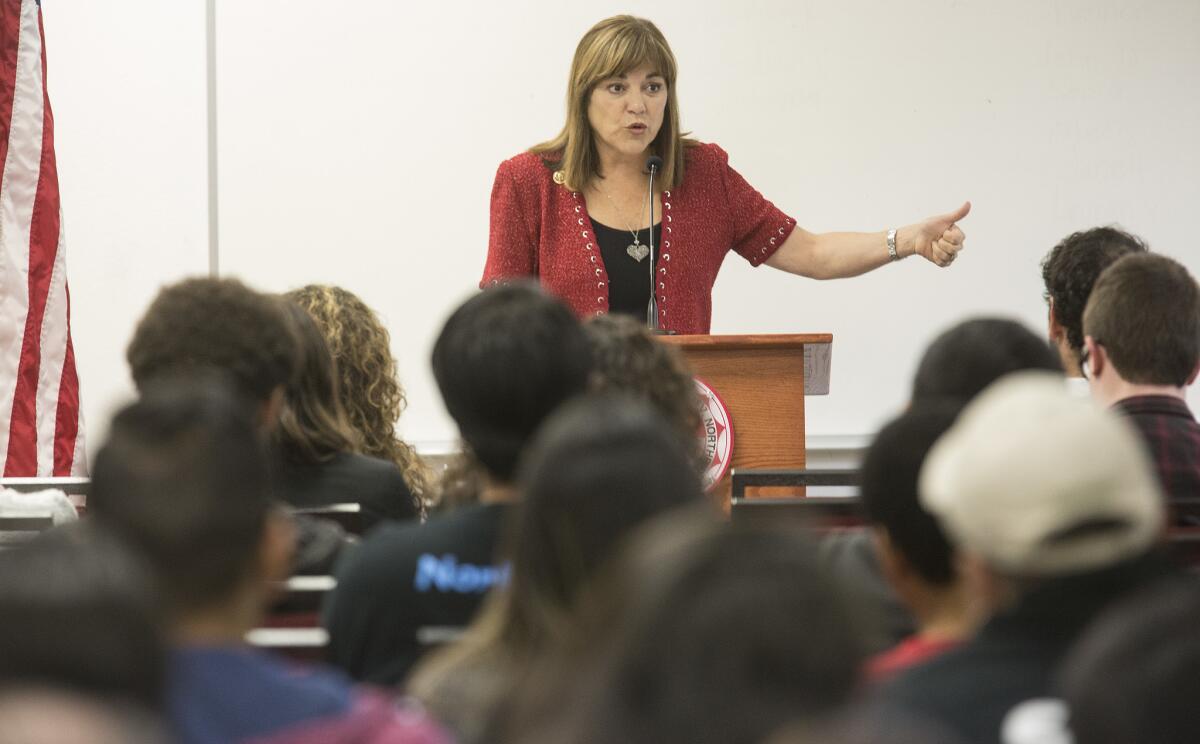
Harris then hopped on her campaign bus and headed south to Cal State Northridge, arriving a few hours after Senate rival Rep. Loretta Sanchez was on campus talking with students. Both Democratic candidates said they supported allowing graduates to refinance student loans to lower interest rates. Both also support expanding federal Pell Grants.
A smattering of applause rose up after Harris said she supports a proposal for free college tuition for students from families that earn less than $140,000 a year.
Still, a few students were skeptical.
Danielle Parmentier, 28, of Walnut said she’s all in favor of anything that will make college more affordable, but providing a tuition-free college education doesn’t seem realistic.
“Where’s the money going to … come from?” she asked.

Senate candidates Loretta Sanchez and Kamala Harris campaign at Cal State Northridge on same day
Former state schools chief Delaine Eastin says she’s running for governor in 2018
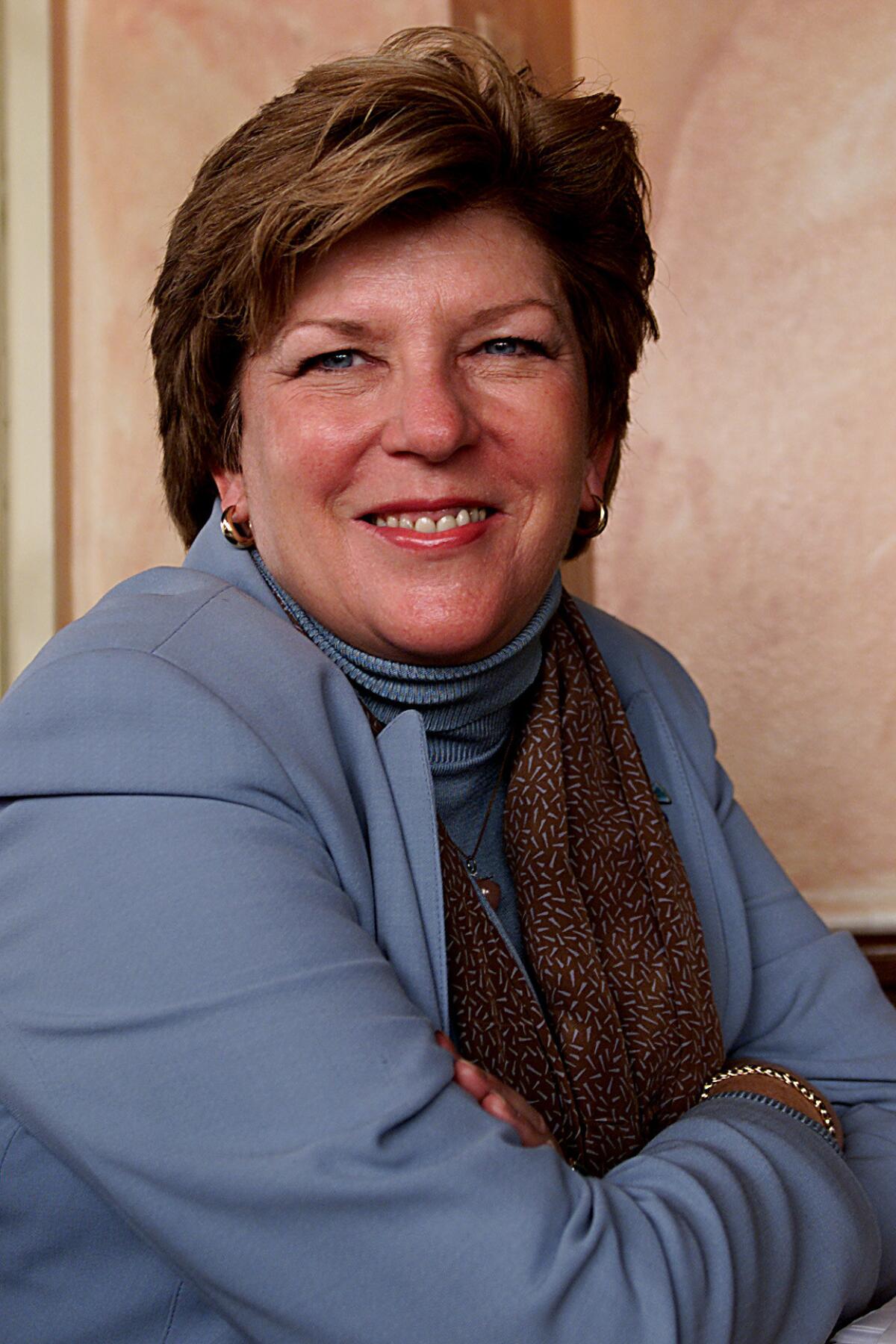
Delaine Eastin, who served eight years as California’s top education official, said Tuesday that she intends to be a candidate for governor in 2018.
”I’m a very frustrated person who’s been watching from the sidelines for some time now,” Eastin said in an interview with The Times.
A Democrat first elected to the Assembly in 1986, Eastin has been out of public office since her second term as superintendent of public instruction ended in 2003. During her tenure, she was a vocal advocate for the state’s class-size reduction law.
Since then, she has held a variety of education-focused positions and currently is chairwoman of the board of Educate Our State, a nonprofit organization that advocates for California schools.
Eastin, 69, said she is concerned that the state’s elected officials no longer see public-school funding as a top priority. In particular, she is critical of a lack of support by Gov. Jerry Brown and current lawmakers for additional preschool funding and for failed efforts at implementing full-day kindergarten.
“I want people in Sacramento who are going to put the children first again,” she said.
Eastin, who said she had intended to wait on a formal announcement until the end of the year, would join what already looks to be a crowded field of Democrats seeking the post once Gov. Jerry Brown departs. That list includes Lt. Gov. Gavin Newsom and Controller John Chiang, who have already formally declared their candidacies, and others such as former Los Angeles Mayor Antonio Villaraigosa who have said they are considering a run.
While she said she would consider it a victory even to force other candidates to step up their commitment to public school students, Eastin also promised to mount a serious bid for the office.
“I’m very committed to running,” she said. “I’m going to do my very best after the first of the year to run a winning campaign.”
Family of slain Palm Springs police officer speaks in favor of ballot measure to speed up death penalty system
More than a week after a joint funeral for Palm Springs police officers Jose “Gil” Vega and Lesley Zerebny, Zerebny’s family members have joined supporters of a Nov. 8 ballot measure that intends to speed up executions in California.
Authorities have said John Felix, 26, used an assault rifle with an extended magazine to shoot Zerebny, 27, and Vega, 63, through a metal security gate. Riverside County Dist. Atty. Mike Hestrin has said Felix is to face the death penalty in the Oct. 8 ambush-style attack.
In a statement this week, David Kling, Zerebny’s father, and Matt Zerebny, her father-in-law, urged a “yes” vote on Proposition 66, which would change and limit how death row inmates can appeal their cases.
“While we will never have closure over the senseless death of our beautiful Lesley, their killer needs to be brought to justice,” they said. “We are seeking justice and that will come in the form of change. Prop. 66 is that change.”
Crime victims have become prominent voices behind Proposition 66 and its competing ballot measure, Proposition 62, which seeks to end the death penalty in California.
Rep. Darrell Issa and Democratic opponent are back to bashing each other after releasing positive TV ads
For 30 seconds, no more and no less, Rep. Darrell Issa and Doug Applegate dropped their negative attacks and delivered a more upbeat message in some of their newest commercials.
Applegate, a Democrat making his first appearance in politics, has released a spot that tells a little bit of his story and raises his name profile. Issa, also in a first, has released a new commercial where several women praise the Vista Republican for his work in Congress.
But just as fast as it takes to halfway cook Minute Rice, they were back to their attacks in another round of ads. As before, Applegate went after Issa for backing Republican presidential nominee Donald Trump, rerunning portions of the infamous video where Trump bragged about groping and other physical contact with women without their consent. Issa, as he has in past ads, brought up the restraining orders that Applegate’s ex-wife obtained against her former husband.
Trump himself gave the congressional campaign a surprise twist Thursday by taking to Twitter to express his admiration for Issa, though it may not have been entirely welcomed by the incumbent in his toughest reelection race ever.
“@DarrellIssa is a very good man. Help him win his congressional seat in California,” Trump tweeted. Not surprisingly, that tweet has made the rounds, including to the Applegate campaign, which issued a response.
Darrell Issa ‘appreciates’ Donald Trump’s Twitter shoutout
Eight-term U.S. Rep. Darrell Issa (R-Vista) is in a tight race with first-time candidate Doug Applegate that has been rated a toss-up by political handicappers.
Issa, who turns 63 today, endorsed Donald Trump in May.
“Darrell appreciates the birthday shout out after he spent the day riding his bike across the district, meeting with voters and working to ensure our veterans get their bonuses paid back in full,” said Issa spokesman Calvin Moore.
Democrats think that Issa’s strong support of Trump will hurt him in November. Applegate’s campaign manager, Robert Dempsey, jabbed at Issa and Trump’s relationship shortly after the tweet.
“Darrell Issa once again shows why he’s unfit to represent this district in Congress. When he’s not busy lining his own pockets, he’s trying to score political brownie points with one of the least qualified candidates for president in the history of the United States,” he said in a statement. “I guess Issa couldn’t help himself in showing the voters of this district that he really is a mini-Trump who will always put party before country.”
1:51 p.m.: Updated with responses from the Issa and Applegate campaigns.
This post was originally published at 12:09 p.m.
ACLU sues state to allow Californians to take ‘ballot selfies’ this election day
Despite a recently passed law allowing Californians to take so-called “ballot selfies,” the practice will still be illegal next Tuesday when voters go to the polls.
That’s because the law, passed by the Legislature this year and signed by Gov. Jerry Brown, doesn’t go into effect until Jan. 1.
Hoping to change that, the ACLU of California is suing California Secretary of State Alex Padilla, saying it’s concerned about the chilling effect voter confusion could have on free speech.
“This is an incredibly contentious election. Thousands of our members want to engage in this core political speech, and not just show people how they are voting but try to encourage others to vote the same way,” Michael Risher, an attorney with the ACLU of Northern California, said in a statement. “On November 9, it will be too late for them to do that.”
Risher called ballot selfies “core political speech at the heart of the First Amendment.”
The civil rights group is seeking a temporary restraining order to stop the state from enforcing the law on election day. In its 125-year history, California’s ban on sharing one’s marked ballot has not been enforced.
A hearing is scheduled for noon Wednesday in the U.S. District Court for the Northern District of California in San Francisco.
Earlier this month, Padilla’s office sent out a memo to county elections officials emphasizing that the new law, AB 1494, does not take effect until January.
“While sympathetic to efforts to accelerate the use of this new form of political expression for the November 2016 election, state law currently prohibits it and only a court of law can authorize such a change,” Padilla said in a statement Tuesday afternoon. “My office stands ready to comply with any decision handed down by the court on this matter.”
No matter the outcome, Padilla added, voters are still free to take selfies with their “I Voted” stickers.
A record 3 million Californians have already voted, but there’s a catch
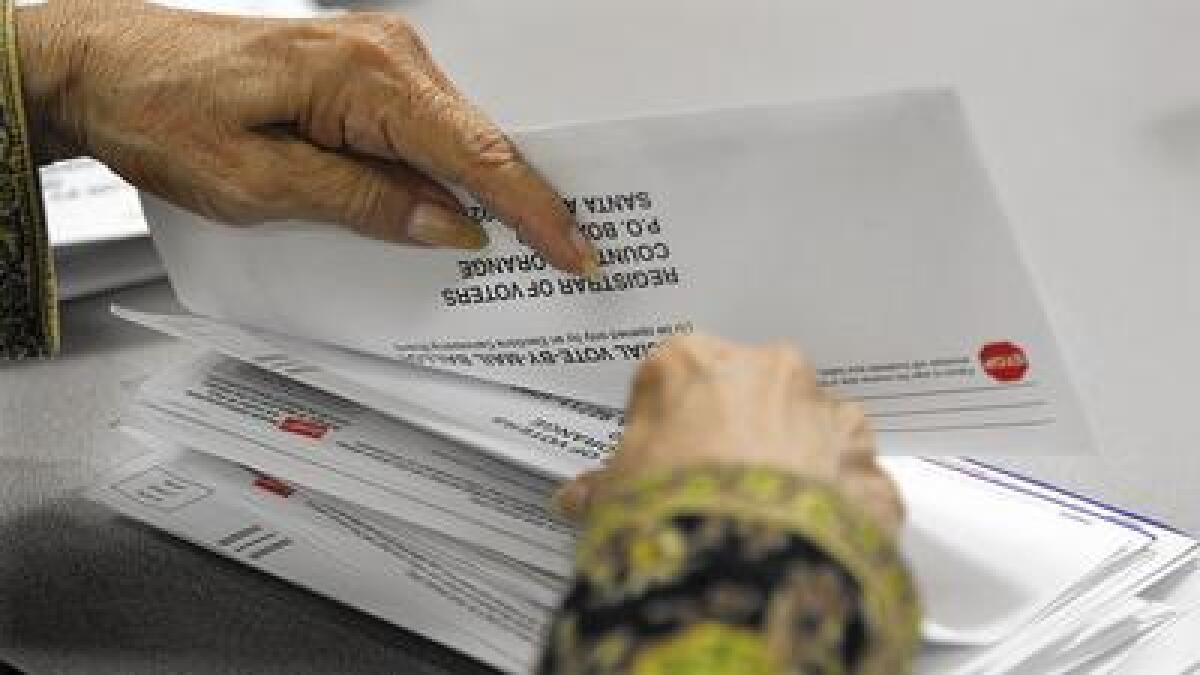
California’s votes cast by mail have now topped the 3 million mark. That number outpaces recent election seasons in raw numbers, but lags behind the 2012 election in terms of the percentage of the ballots that were mailed out.
Daily tracking information compiled by Political Data Inc. shows county elections officials across the state reported that more than 3 million ballots had been mailed in or dropped off as of Monday, eight days before the Nov. 8 election.
Those ballots represent almost two-thirds of the total number of mail-in ballots cast in California during the 2012 presidential election, a sign of the state’s rapid growth in permanent vote-by-mail registration.
Still, the high number of mail-in ballots returned are a lower percentage of the total number of ballots mailed out than at the same point in 2012 — a point that Paul Mitchell, the expert behind Political Data’s numbers, made Tuesday morning on Twitter.
In Los Angeles County, for example, about 21% of mail-in ballots had been returned as of Monday, approximately a 4-point decrease from the same time in 2012.
State elections officials do not tally ballots returned on a daily basis. Mitchell’s company, which sells its data analysis to political campaigns, collects the information from each county and makes it public.
Campaign strategists, who see that election day has now become an election month, generally refocus their efforts in the final 10 days based on which voters have yet to cast a ballot. That kind of micro-targeting is often based on age, ethnicity or party affiliation.
Why analysts say ending executions in California could save taxpayers millions of dollars
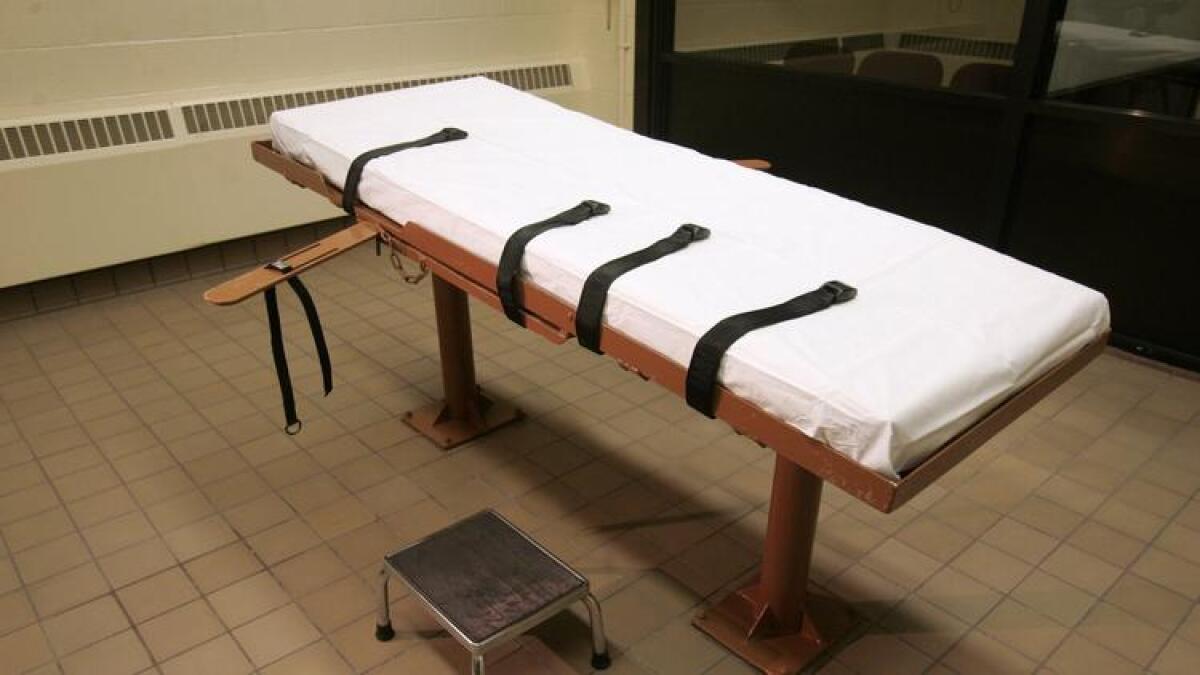
Proponents of Proposition 62, which would replace California’s death penalty with life in prison without parole, this year have focused on emphasizing the financial burden of executions.
But weighing the fiscal impact of the Nov. 8 ballot measure and its competitor, Proposition 66, which aims to speed up the death penalty process, is complicated. Researchers are at odds over the potential expenses and savings of each.
Independent legislative analysts, meanwhile, have found that repealing the death penalty is likely to save taxpayers millions of dollars through lower court and incarceration costs. The price of Proposition 66’s attempt to expedite death sentences, they say, is unknown.
Expanded term limits inspire record spending by outside groups in California’s statehouse races
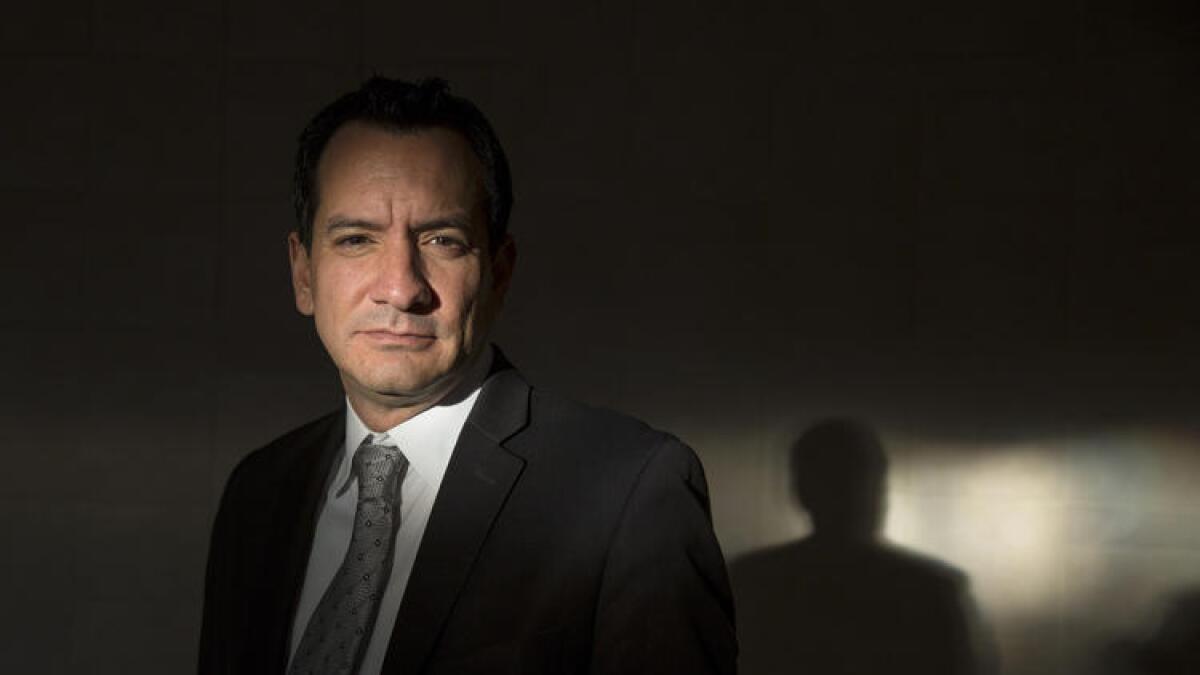
The new staying power state lawmakers could have under expanded term limits has raised the stakes in this year’s election and has helped attract more outside money than ever to California’s legislative races.
Under a new term limits law passed four years ago, lawmakers may now spend a total of 12 years in the Legislature, but have no limits on their terms in each chamber.
That means a newly elected state assembly member or senator could choose to stay and build influence in one house for more than a decade.
“It’s the last group of people who are going to be elected for a while,” Assembly Speaker Anthony Rendon (D-Paramount) said in a recent interview while he campaigning over a weekend for five different Democratic candidates as his party attempts to sway the balance of the Assembly. “It’s playing for keeps this year.”
Meet the climate-change-supporting, homeless-bashing anti-communist who is likely on his way to the state Legislature
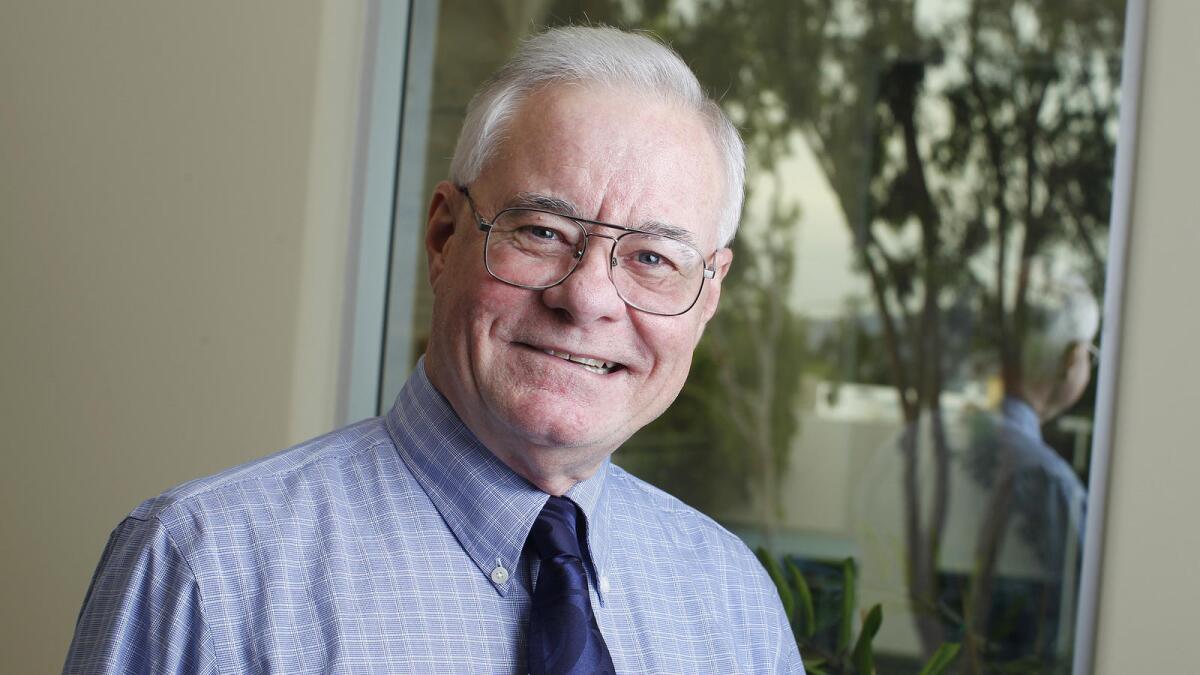
Randy Voepel is the mayor of a San Diego suburb and is running unopposed for a seat in the state Assembly.
He also has refused to sign an autograph for a Chinese national because of communism, bragged about his city’s failing grade from the American Lung Assn. and compared homeless people accused of stealing copper to the Viet Cong. And he believes climate change is good because “our enemies are on the equator” and warmer temperatures will hurt them.
Voepel’s stances and statements could put him out of step with his new colleagues in the Legislature, including those in his own Republican Party.
Today is the last day to request a vote-by-mail ballot in California
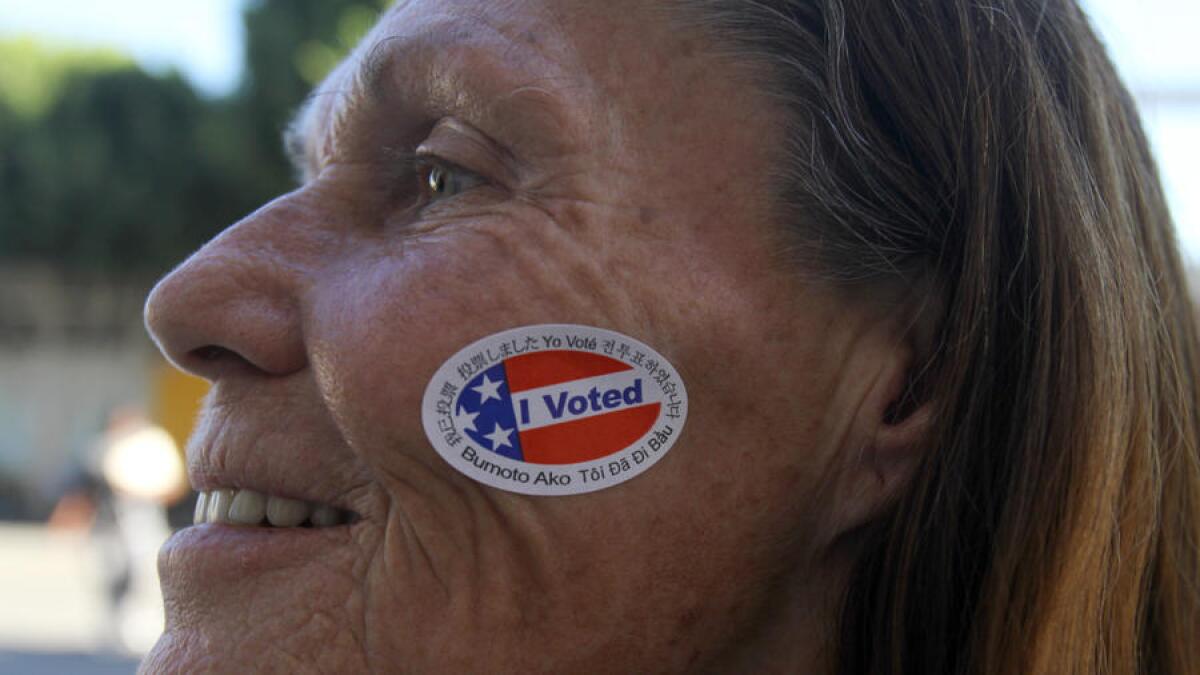
The voter registration deadline for this election has passed, but here’s how you can request a vote-by-mail ballot if you are already registered.
If you want to vote by mail, you aren’t alone. A majority of Californians now cast their votes by absentee, or vote-by-mail, ballot. It’s one of the reasons it can take days, or even weeks, to get complete election results.
Vote-by-mail ballots must be postmarked on or before election day (next Tuesday) and received by your county elections office no later than three days after election day. To make sure your ballot is received on time, you can also bring it to any polling place in your county between 7 a.m. and 8 p.m. on election day.
You can also vote in person before election day. Check with your county election office for locations.
Los Angeles County offers early voting from 8 a.m. to 4 p.m. this weekend at six locations around the county.
Waiting to cast your vote the old-fashioned way on Nov. 8? Polling places are open from 7 a.m. to 8 p.m. Remember, if you are in line at 8 p.m. you’re still allowed to vote.
Democrats up their ad spending in four California congressional races
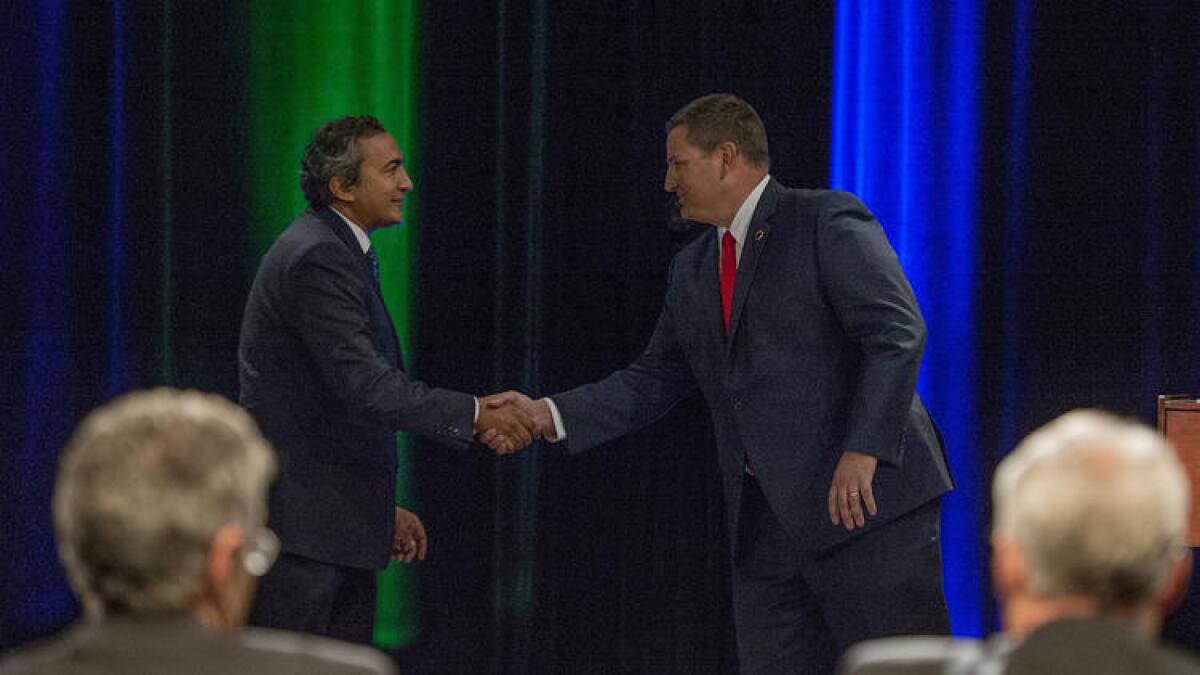
The House Democrats’ campaign arm, the Democratic Congressional Campaign Committee, has increased spending on digital and radio ads in four closely watched California districts in the final week of the campaign.
The radio ads and digital ads, which are appearing on sites like Facebook, YouTube and Pandora will air in three districts Democrats are trying to flip — the 10th District in the Central Valley, the 25th District near Porter Ranch and the 49th District, which includes Camp Pendleton.
The ad spending also is being used to shore up Rep. Ami Bera’s chances in the Sacramento area’s 7th District.
The committee is spending $1 million in the last days before the election to influence races in 16 states that aren’t considered presidential race battlegrounds. It is not clear how much of the spending is going to the California races.
The tobacco tax money race is a lot closer this time around

In two previous attempts to raise the cigarette tax over the last decade, tobacco companies outspent supporters more than 4-to-1 and the measures went down in narrow defeat.
This time, proponents’ fundraising is a lot stronger for Proposition 56, which would hike the cigarette tax by $2 a pack. The influx of money could be a big reason for the measure’s strong position in the polls.